Authors
Monday Meows
Rocket launching Jeeves in 3.2.1.chomp…
This should be interesting.
I doubt it.
gznorkzzzzzzzzzz
When shall we three meet again? Or…wait, this is Macbeth, right?
Snippet – Caleb’s Tale
Prologue
From: A History of Northern Continent Education. Markus Adams (Certified Wizard).
There is no agreement, in the annuals of magical education, of just which magical school was the first to be founded. Academics argue constantly over whether or not Whitehall, Mountaintop, Golden (lost in the blighted lands) or even Heart’s Eye came first, setting an example that inspired the remaining first generation of schools. Even for the schools for which we have detailed and accurate historical records, such as Laughter or Stronghold, there are a great many questions that remain unanswered. It is difficult to trace the development of magical education, or to trace the thinking that led to communal schools. Far too many historical records have simply been lost or deliberately destroyed.
One thing that is clear, however, is that the development of magical schools led to clashes with wizards who followed the apprenticeship system. A wizard who had a number of apprentices, who in turn raised apprentices of their own, stood at the top of a hierarchy that was tilted in their favour, giving them power and prestige they were loathe to lose. The clear flaws of the system – senior wizards had considerable power over their juniors, some magicians never receive proper training at all – did not disabuse them of their determination to keep the system in place. Indeed, many junior apprentices preferred to keep it because eventually they would rise to become seniors themselves. The idea of a generalist magical education, which would give all comers the same basic knowledge, was understandably terrifying. It would not only limit the number of apprentices willing to devote their lives to a singular subject, but also ensure the apprentices knew their rights when they were accepted by a master. It should come as no surprise, therefore, that the masters and many of their apprentices waged war on the concept of universal magical education. Historical records are vague, but it appears that several schools were in fact destroyed over the first century of magical education and Whitehall itself came very close to being destroyed too.
The events that led to the compromise that ended the dispute remain unclear, but eventually a compromise was reached. The schools would give everyone the same basic grounding, yet also serve as a recruiting ground for masters in search of apprentices. Students who did well would be offered a chance of further education, focused on a particular subject. In many ways, the compromise appeared perfect. The new students would know, beyond a shadow of a doubt, which subject they intended to specialise in, ensuring they could reach out to the masters best suited to educate them.
However, the compromise was also deeply flawed. There were far more apprentices than there were masters. Many students could not get the focused education they wanted, let alone the qualifications they needed to practice themselves. There was also no way to study multiple subjects after they left school, let alone conduct the studies on their own timetable. Indeed, after several decades development, it became clear that the master-apprentice relationship/hierarchy remained unchanged. The discontent this sparked, by contrast, remained unfocused. No one with the power to do so was interested in rocking the boat, let alone founding an institute of further education.
It was not until Lady Emily arrived on the scene that dreams of a university started to take shape and form. Lady Emily not only had the wealth and prestige to found an institution, but also largely unquestioned possession of Heart’s Eye, a school that was occupied by a necromancer and eventually liberated by Emily herself. Gathering a handful of friends and supporters around her, ironically in the months between her departure from Whitehall and her apprenticeship with Void, she set out to found a university.
She did not find it an easy task. The necromancer had left surprises behind in the rubble, surprises that came very close to destroying the entire university. Many of her allies had ambitions of their own, from the former students of Heart’s Eye to believed the school belonged to them to others who had dreams of power without restraint, and it is greatly to her credit that by the time she left the university under the control of Administrator Irene, and Deputy Administrator Caleb, the institution rested on fairly solid ground, and stood ready to receive the first collection of prospective teachers and students.
Naturally, matters did not go as smoothly as many had hoped.
Chapter One
Caleb stood on the podium and looked down at the audience, trying not to groan.
He had always known it would be difficult to attract top talent to Heart’s Eye, to the university Emily and he had planned over the last few years. Long planning sessions – his heart twisted at the memory of what had followed those sessions – had led to concepts that looked great on paper, yet were frustratingly hard to turn into something real. The vast majority of younger students went to the older magical schools, while the older and freshly graduated magicians tended to look for a master, so they could specialise in their chosen subject. It was never easy to find a master at the best of times, and it grew harder as the prospective apprentice grew older. There was no escaping the simple fact that the first students attending the university wouldn’t be the cream of the crop. They would keep going to masters until the university proved itself.
Caleb knew, without false modesty, that he had always been a dilettante. He hadn’t been interested in a single subject so much as he had been interested in them all, reading around magical topics in greater depth than they were covered at either Stronghold or Whitehall, if they were covered at all. It had made him something of a dabbler, and he’d said as much to Emily, but he’d learnt a great deal through combining the different magical fields into one. There was no inherent reason why a student couldn’t study both alchemy and enchantment, or construction and a dozen other subjects. The divide between them owed more to masters demanding their apprentices specialise in their fields, rather than studying magic itself. It was a two-edged sword, Caleb had often thought, although few agreed with him. The apprentice who became a master might be an expert in their field, but they rarely knew more than the basics of any other field. It was no surprise, not to him, that the different guilds treated each other with barely-hidden disdain, even when they were supposed to be united against a common enemy. There were feuds that went back hundreds of years, originating so far back that no one truly knew what had started them. No wonder cooperation was impossible.
He kept his face as blank as possible as he surveyed the newcomers. A handful of older masters, whose ambitions had outstripped their talents; a cluster of apprentices, some taught the basics at school and others largely self-taught, or taken into their master’s household years before their time. It was technically frowned upon to take on an apprentice who hadn’t had at least four years of generalist education under his belt, but like so many other magical customs it lacked an enforcement mechanism. They were flanked by a handful of young magicians who had the spark, but lacked the money or connections to attend a proper school, and a cluster of apprentice craftsmen, printers and engineers, lacking in magic but deeply steeped in the New Learning. It wasn’t going to be easy to keep them from leaving, Caleb reflected, when they realised how dangerous it could be for a mundane in a school of magicians. Emily had laid down the law, and he intended to enforce it, but it was just a matter of time until someone challenged him. The hell of it was that the challenge might not even be deliberate. Too many magicians saw a mundane in their territory as someone who was being uppity, someone who needed to be taught a lesson. But that rule didn’t apply here.
His eyes lingered briefly on a redheaded young woman, her pretty face set in a scowl that made her look like an overgrown child, and winced inwardly. She was here because of politics … and she didn’t want to be. A handful of aristocratic youths stood near her, looking so absurdly self-confident and entitled that it was hard not to feel a flicker of the old resentment and hatred. They thought the world owed them everything, but if that were true they wouldn’t be attending Heart’s Eye. The new tutors standing at the rear, by contrast, looked worried. They knew they weren’t good enough to get tenure at any other magical institution. Heart’s Eye was their last chance to be something more than independent teachers, moving from city to city and student to student. He hoped they’d be reasonable. Too many magicians were decidedly unreasonable.
He tried to see the hall through their eyes, feeling his heart sink still further. The famed mirrors were gone, some shattered and others removed, and the plain stone walls had been left largely unadorned, save for a handful of portraits of research wizards. The chamber had been swept repeatedly, but there was still a hint of dust in the air. He wondered what the newcomers were thinking, as they waited for him to speak. The events of the last few months, the crisis that had come very close to destroying the university and so much more, felt hazy and dreamlike even to him – and he had lived through it. Others seemed to have forgotten it completely, as if the whole affair had been so far out of their context that they refused to acknowledge it had happened. It was hard to blame them.
Caleb was not good at public speaking. He disliked it profoundly. But he was the Deputy Administrator and it was his duty.
“Welcome to Heart’s Eye,” he said, simply. “This is not a school. This is not a master’s workshop. This is not an institution focused on any one topic, magical or mundane. This is a university. Our goal is to allow students to study multiple subjects at once, be they magic or science, in hopes of expanding the sum total of human knowledge and developing newer and better ways to do things. We are gathering experts in every subject and students who are willing to learn, in the hope of creating a melting pot of knowledge. You may find it strange, if you have spent your early lives or careers in one of the schools or served an apprenticeship under a master before taking apprentices of your own, but we hope you will find it interesting as well as educational.”
He paused. “You’ll notice that a great many of our arrangements are fluid. We have no intention of slavishly copying tradition, at least when there is no clear reason for a given tradition to exist, and our willingness to keep any traditions is entirely dependent on their value and practicality. If one tradition is worthless, we will discard it; if it serves a valuable purpose, we will keep it. You may find it hard to grow accustomed to such changes, and to understand the importance of adapting to the ever-changing world, but we believe that there is no way change can be prevented forever. We aim to surf the waves of change, rather than letting them destroy us.
“In this place, titles don’t matter. Wealth doesn’t matter. Magical power or training doesn’t matter. We will not give you favour because your father is the King of Blank or your mother is the Grand High Witch of Somewhere. We will not look down on you because your father is a mystery, or your mother was a scullery maid; we will certainly not look down on you because you barely have enough magic to boil water, or don’t have magic at all. You will have the opportunities to learn from the tutors, regardless of your origins, and the opportunities to make use of what you learn.
“That said, this is not a school. You will not be scolded for being late to class. You will not be caned for handing your homework in late, or not at all. You will not be expelled for failing your end-of-year exams. We offer you – all of you – equal opportunities. We do not promise equal outcomes. That would be silly. We offer you these opportunities, but what you make of them is up to you. If you study hard, read around your subjects and practice what you’re taught, you will do well. If you never attend class, and spend all your days drinking and carousing in Heart’s Ease, you will do poorly. You will not graduate. You will do nothing with your lives.
“And it will all be your fault.”
He paused again, letting the words hang in the air.
“There are few rules here, but they do exist. You may not bully or assault other students. You may not disrupt class or impede the education of other students. You may not use your birth or power or both to put someone else down. You may not continue old feuds here. If you have problems with other students, we expect you to handle them maturity; if you have issues with your tutors, we expect you to bring them to the university board. If you are caught breaking these rules, there will be consequences. You will not enjoy them.
“I don’t expect you to like or love your peers, or your tutors. But I do expect you to treat them with respect.”
His eyes surveyed the newcomers again. Some looked pleased, others looked sullen. The red-haired girl managed to look both bored and irked at the same time. The tutors were far more practiced at hiding their emotions. Caleb hoped that didn’t mean they’d be trouble. A single poisonous tutor could do more damage than a dozen entitled aristocratic brats. He wondered, idly, how many would stay, when they realised their qualifications wouldn’t guarantee them tenure. Emily had been very set against any sort of permanent tenure, for reasons Caleb knew the tutors would not approve. The harder it was to sack any offending tutor, the greater the chance one would offend.
“If you want to leave at any moment, the door is over there,” he finished, pointing to the rear door. “If not … I hope you enjoy your time here, and that it benefits both you and our newborn university. The student assistants waiting in the next room will show you to your dorms and bedchambers, if you have any issues they can’t handle ask a tutor. Dismissed.”
A ripple ran through the air as he stepped off the podium, the majority of the students heading towards the next room. Caleb hoped they wouldn’t cause too many problems with the student volunteers, as they struggled to get used to the dorms. Whitehall didn’t have dorms, he knew, and Mountaintop segregated its students by birth as well as sex. He wondered how long it would be until he heard the first complaint about the lack of private bedrooms, or demands to know why magicians had to share space with mundanes. Probably not very long, if he was any judge. He knew better than to believe mundanes were dirty and smelly brutes who couldn’t count past ten without taking off their pants – and uncouth enough to do it too – because his father was a mundane, but he’d heard magicians say just that and worse too.
Of course they do, his mother had said, years ago. They’re not smart. They’re not talented. The only thing that sets them apart from the mundanes is magic – and they don’t even have much of that. They put the mundanes down because they know, deep inside, that the only thing that separates them from the mundanes is magic – and without magic, they’d be no better than those they hate.
The red-haired girl stalked past him with nary a nod, her face set in a pinched line as she left the room. A handful of young men followed, no doubt intending to try to chat her up. Caleb suspected it wouldn’t go very well, not for them. The girl was a member of a high-ranking family and her would-be suitors were trying too hard, the very finery of their clothes suggesting they weren’t that high-born at all. And the very fact they were in the university was proof they didn’t have their pick of masters …
“You’re Caleb, Son of Sienna,” a student said. He shoved out a hand. “I’m Parson, of House Garland.”
Caleb hid his annoyance with an effort. His extended family hadn’t been too pleased about his mother’s choice of husbands, although they’d been reluctant to take the final step of actually disowning her if she refused to give up her partner and return home. Lucky for them they hadn’t, Caleb reflected. His parents had five children who were handsome, talented, and very strong in magic. His brother had died bravely, facing a necromancer, but the rest of his siblings were powerful assets. House Waterfall had to be glad they hadn’t disowned their wayward child. Her decision had worked out very well for her family.
“Pleased to meet you,” Caleb said. Parson was a little too handsome, a little too overdressed for his role. His handshake was very firm, disturbingly so. Caleb’s father had once noted that the more someone played up his honesty and openness, the more alarmed you should be … Caleb wished, not for the first time, that he’d listened more to his father as a child. “Welcome to Heart’s Eye.”
Parson smiled. “Is it true that you and Lady Emily are secretly married? And that you were given this post as a wedding gift?”
Caleb felt a hot flash of anger. He’d been dreaming of a university – or at least something along those lines – well before he’d known Emily as anything other than a name, let alone a friend and a lover. Their break-up had hurt, and he was honest enough to admit it had been partly his fault, but they’d managed to remain friends and stay in touch, eventually working together to lay the groundwork for a university. The idea that he was nothing more than Emily’s lover was not only insulting, but wrong. It was just frustrating to have people think of him as nothing more than a bit character in her life.
“No,” he said, flatly. “Lady Emily and myself, and a handful of others, devised the university and worked to put it into practice. I have this post because it is my responsibility to make the university work.”
Another student joined them, wearing the livery of a formally-acknowledged bastard. “Why didn’t Mistress Irene greet us?”
“Administrator Irene is currently dealing with a more important problem,” Caleb said. “The university is very new, as you know, and a great many issues were simply not recognised as problems until they came into the light. We are learning through doing here, and …”
Parson frowned. “We are high-ranking students,” he interrupted. “Should we not be welcomed by …”
Caleb met his eyes. It was hard to keep the irritation out of his voice. “There are no ranks and titles here. I told you that. If you are mortally insulted because Mistress Irene did not leave a problem to fester so she could greet you, you may leave at any moment. If not, I suggest you concentrate on your studies. We have a lot of work to do.”
He waited, wondering what Parson would say. Parson bowed instead and headed for the door, surrounded by a handful of other wealthy or well-connected brats. Caleb was sure he was going to be trouble. Some aristos got knocked down hard and learnt from the experience, growing into better people; others, he reflected coldly, didn’t get knocked down until they were too set in their ways to change. He made a mental note to look into Parson’s history. With that sort of attitude, it was very likely he’d never been to Whitehall. Or Stronghold.
“I thank you for your offer of employment,” an older man said. He bowed rather than holding out a hand. “Master Ballymore, at your service.”
Caleb bowed back, studying Ballymore thoughtfully. He was a short slender man, with a ratty face and a weedy little moustache that looked somehow wrong, as if it shouldn’t be there at all. He wore the outfit of a travelling tutor, but there was something about his attitude that suggested he was always one missed payment away from total disaster, a sense of quiet desperation that poisoned the air around him. Caleb tried not to show his concern. The contrast between Ballymore and the confident tutors he’d known at Whitehall could not be greater. If he hadn’t been able to find a permanent post …
It doesn’t prove anything, Caleb reminded himself. There were more candidates than there were posts. If someone could only find work by travelling from place to place, teaching a handful of students the basics and then moving on when their students went to school, it didn’t mean they were bad tutors. There hadn’t been any reason to worry about them, when references were checked. For all I know, this guy needs some stability to flourish.
“You are welcome,” he said, finally. “I hope you will do well here.”
“I will,” Ballymore promised. “My students always do well in their exams.”
Caleb nodded, curtly, as Ballymore hurried away. Exams weren’t everything, but they were a good indicator of a student’s capabilities. It had taken weeks of arguing to get Heart’s Eye accredited to offer the standard exams, let alone their more advanced counterparts, and the White Council wasn’t entirely happy with the arrangement. A failure now, even a relatively minor one, could cost the university the right to offer exams, which would cripple its future development and make it impossible to recruit the best students and teachers. And that would be disastrous.
He spoke briefly to the other tutors, trying to avoid the sense they were scraping the bottom of the barrel. It wasn’t easy. A couple appeared competent, and willing to believe in the university’s stated goals, but others were far less suitable. One was clearly reluctant to take orders from a young man who had been a student himself a couple of years ago. Another looked ready to leave at the slightest provocation. But they were all he had. They would have to do.
Give us five years and we’ll be solidly established, he told himself. And then we’ll be well on the way.
Sure, his thoughts countered, expressing doubts he dared not admit openly. Not yet. And if these tutors aren’t up to the task, they’ll take the rest of us down with them.
The Book Devouring Horde Quiz
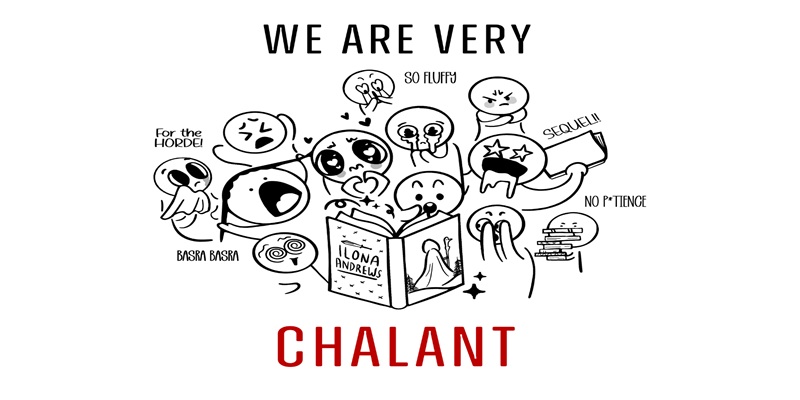
“I heard Realtors have to disclose if the house is haunted,” Leon said.
I looked at Mom in the driver’s seat. She gave me an amused smile. No help there.
“Apparently only four states require you to disclose paranormal activity,” Arabella reported. “Nine states require you to notify the buyer if a death occurred on the premises. And Texas does neither.”
“There were no deaths on the premises. Nobody died in the house, so it can’t possibly be haunted,” I told them.
“How do you know nobody died?” Leon asked.
“Because I checked the records,” Bern rumbled.
“That doesn’t mean anything,” Arabella said.
Clearly, there were two teams in this vehicle: Team Facts and Team Facts Be Damned.”
Andrews, Ilona. Ruby Fever, Hidden Legacy 6. Avon HarperCollins, 2022. Kindle edition, page 3
The Book Devouring Horde, the name for Ilona Andrews fans, stand united as a force to belove. Our fluffiness lies in the way we balance each other’s strengths and weaknesses, quirks and extremes. We remind each other of what is real and what is absolutely, gloriously NOT. And in the end, all that matters is that we all come together in appreciation for the same wonderful books.
But a quick stroll in any BDH comment section will quickly make you understand the reality of the Baylors conversation above. Following several requests and fan group polls, let’s find out which brand of chaos you bring to the Horde table!
Take the quiz below and embrace your destiny.*
*Disclaimer: not your actual destiny. As usual, the results are just for fun because I’m not the real Sorting Hat, I just look like it #wrinklelife. Please don’t take the quiz if this month has taken everything out of you and it could make you real-life upset. Hug(h)s!
Also, the quiz plugin doesn’t play nicely with the newsletter. If you’re getting this in your email, you can click here to come straight to the blog and take it.
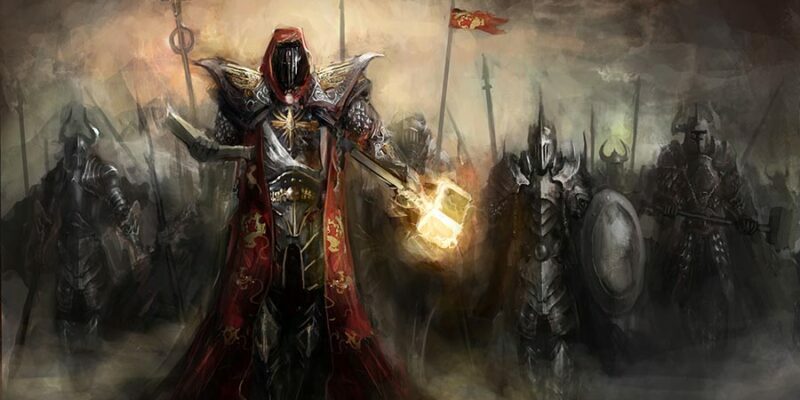
Which BDH team do you belong in?
Ah, the Book Devouring Horde. Whether you're sprinting off into the wilderness of speculation, hold firmly to the foundations of fact, vibrate with anticipation, or discuss everything into the ground- we are a force of nature. Where do you stand, when you stand with us?
1 / 9
Someone shipped Julie and Saiman. Your first instinct is:
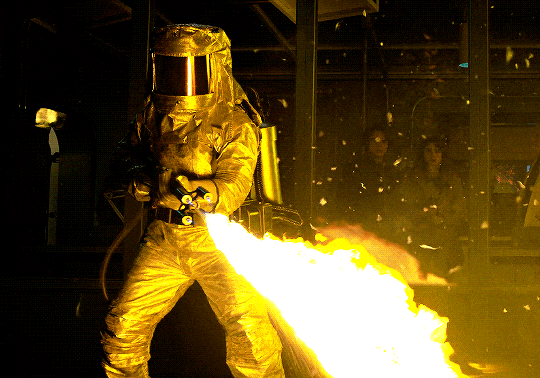 Metal Rose Metal Rose Metal ROOOOOSE!
That’s interesting. I want to hear them out.
Burn it! With FIRE! Burn it with BEAVERS!
Yu Fong? Sure. Ascanio? Maybe. Derek? Most likely, based on all the evidence. Saiman makes no sense. Explain yourself.
Metal Rose Metal Rose Metal ROOOOOSE!
That’s interesting. I want to hear them out.
Burn it! With FIRE! Burn it with BEAVERS!
Yu Fong? Sure. Ascanio? Maybe. Derek? Most likely, based on all the evidence. Saiman makes no sense. Explain yourself.
2 / 9
A BDH colleague posts a theory you don’t agree with:
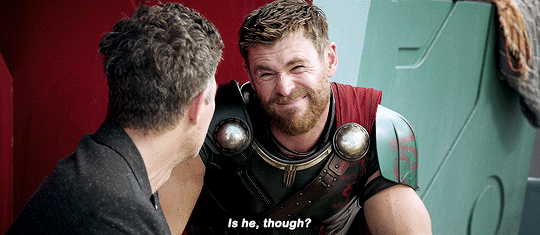 That’s interesting, I like the way you think. I would even agree with you, but then we’d both be wrong.
Your first mistake is that you haven’t taken this far enough! What you first need to understand is that every.single.shifter is a First...
Live and let conspire. I’ll watch how it plays out, and maybe even get a House Andrews answer out of it.
Ever considered doing the action known as “putting two and two together”?
That’s interesting, I like the way you think. I would even agree with you, but then we’d both be wrong.
Your first mistake is that you haven’t taken this far enough! What you first need to understand is that every.single.shifter is a First...
Live and let conspire. I’ll watch how it plays out, and maybe even get a House Andrews answer out of it.
Ever considered doing the action known as “putting two and two together”?
3 / 9
How do you react to the three words most dreaded by the Horde: w*it, p*tience, d*lay?
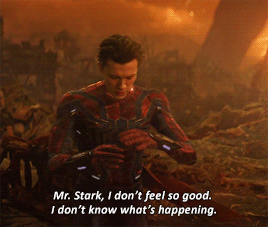 Steady ON. You know there are kids around, right?
It’s not the best, but life happens. We are still beloved.
House Andrews have quit writing. It’s because of all the graphic novels. They'll never go back to real books.
We will murder the words. Patience is futile! Waiting is the mind killer! Delays are the enemy!
Steady ON. You know there are kids around, right?
It’s not the best, but life happens. We are still beloved.
House Andrews have quit writing. It’s because of all the graphic novels. They'll never go back to real books.
We will murder the words. Patience is futile! Waiting is the mind killer! Delays are the enemy!
4 / 9
A serial or snippet you want to reread has been archived on the blog. How do you react?
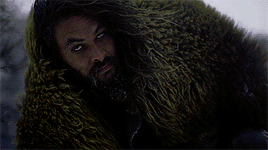 We wish to discuss! Vociferously!
That’s what the Snippet Dark Web is for. I meet with the underground BDH in absconded corners of the internet, and we make the relevant snippet/spoiler trade off.
The Void is darkness, the Void is peace, I am within it, wrapped in its cold embrace...
The authors had their reasons. Hopefully we'll see a final edit of it published.
We wish to discuss! Vociferously!
That’s what the Snippet Dark Web is for. I meet with the underground BDH in absconded corners of the internet, and we make the relevant snippet/spoiler trade off.
The Void is darkness, the Void is peace, I am within it, wrapped in its cold embrace...
The authors had their reasons. Hopefully we'll see a final edit of it published.
5 / 9
Ilona has posted an April Fools' joke about a new book. What do you do?
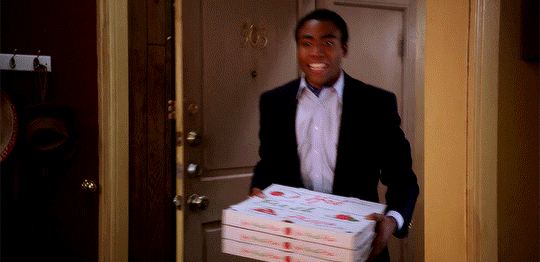 I’ve already requested it from my local librarians and added it to Goodreads, where it has over a thousand reviews so…good luck on keeping this a prank lol
I immediately checked the date and figured out it’s a prank. But you know, they say in every joke there's a kernel of truth…
I go on an emotional rollercoaster before realizing the truth. And another one after realizing the truth.
No backsies. You said it, you write it, we read it. It is known.
I’ve already requested it from my local librarians and added it to Goodreads, where it has over a thousand reviews so…good luck on keeping this a prank lol
I immediately checked the date and figured out it’s a prank. But you know, they say in every joke there's a kernel of truth…
I go on an emotional rollercoaster before realizing the truth. And another one after realizing the truth.
No backsies. You said it, you write it, we read it. It is known.
6 / 9
House Andrews tell us that "The next Innkeeper book will be the end of the missing parents series arc". What does this mean to you?
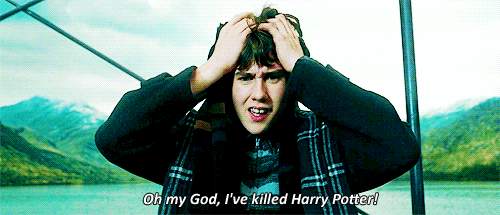 There will never be any more Innkeeper books. We won't find out about Maud! Orro will never cook again! PAPERCUT TO MY SOUL! I told you they sold the series to the muskrats!
End of the series arc doesn't mean the end of the series. They can have several adventures after that, it's a wide Galaxy out there.
Proposal: You write several Gertrude Hunt novellas. Then a Klaus novel. Followed by Helen's series. How Dina met Beast. An Arbitrators Saga, the Jack Camarine spin off, heavily featuring Gaston’s Baha-char business ventures. How Caldenia came to the Inn and other Dominion misadventures and then a Drifen trilogy. Do you wish to discuss?
I do want to know what happens and all the answers, but I don't want it to end. But I’ll preorder it as soon as it’s available!
There will never be any more Innkeeper books. We won't find out about Maud! Orro will never cook again! PAPERCUT TO MY SOUL! I told you they sold the series to the muskrats!
End of the series arc doesn't mean the end of the series. They can have several adventures after that, it's a wide Galaxy out there.
Proposal: You write several Gertrude Hunt novellas. Then a Klaus novel. Followed by Helen's series. How Dina met Beast. An Arbitrators Saga, the Jack Camarine spin off, heavily featuring Gaston’s Baha-char business ventures. How Caldenia came to the Inn and other Dominion misadventures and then a Drifen trilogy. Do you wish to discuss?
I do want to know what happens and all the answers, but I don't want it to end. But I’ll preorder it as soon as it’s available!
7 / 9
There's a new snippet on the blog. How do you react?
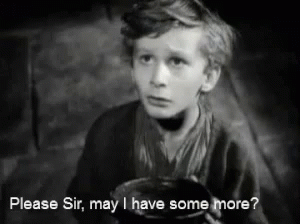 I devour it immediately, thank you!
I’m keeping it for a rainy day.
What about the other series? Does this snippet mean there won't be any more from other series? Have you abandoned them?
Nooooo, I forgot it was a snippet! I got so lost in it and then it was over! Please, House Andrews, may we have some more?
I devour it immediately, thank you!
I’m keeping it for a rainy day.
What about the other series? Does this snippet mean there won't be any more from other series? Have you abandoned them?
Nooooo, I forgot it was a snippet! I got so lost in it and then it was over! Please, House Andrews, may we have some more?
8 / 9
It’s release day of a new Ilona Andrews book, what do you comment?
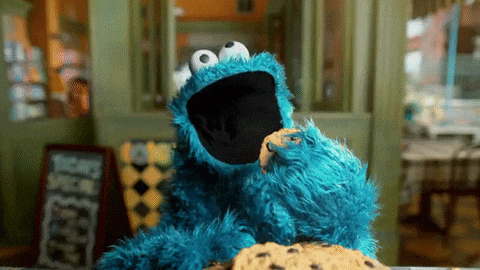 I don't comment, I'm DEVOURING!
A long review on the blog. Spoilers might slip. I'm emotionally compromised.
Review on book review sites, questions on the blog release thread.
When is the next one coming out?
I don't comment, I'm DEVOURING!
A long review on the blog. Spoilers might slip. I'm emotionally compromised.
Review on book review sites, questions on the blog release thread.
When is the next one coming out?
9 / 9
House Andrews mention a new character in passing. What's your first thought?
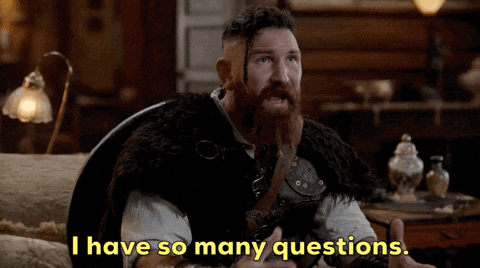 I update my characters chart but wait for more concrete information before making any assumptions.
Never heard the name before, so it's clearly Augustine’s long lost sibling. This means an Arabella trilogy is in the works, with this character as a love interest. And it sounds like an Innkeeper cross-over. I have to tell my friends!
Does this mean a new book? Hope the wait won’t be too long! But aren’t you working on Hugh 2?
If nothing else is put forth in the next 10 working days, I’ll be sure to drop a reminder on the blog. We must discuss!
LinkedIn
Facebook
Twitter
VKontakte
div#ays-quiz-container-8 * { box-sizing: border-box; } /* Styles for Internet Explorer start */ #ays-quiz-container-8 #ays_finish_quiz_8 { } /* Styles for Quiz container */ #ays-quiz-container-8{ min-height: 350px; width:400px; background-color:#fff; background-position:center center;border-radius:0px 0px 0px 0px;box-shadow: 0px 0px 15px 1px rgba(0,0,0,0.4);border: none;} /* Styles for Navigation bar */ #ays-quiz-questions-nav-wrap-8 { width: 100%;border-radius:0px 0px 0px 0px;box-shadow: 0px 0px 15px 1px rgba(0,0,0,0.4);border: none;} #ays-quiz-questions-nav-wrap-8 .ays-quiz-questions-nav-content .ays-quiz-questions-nav-item a.ays_questions_nav_question { color: #000; border-color: #000; background-color: #fff; } #ays-quiz-questions-nav-wrap-8 .ays-quiz-questions-nav-content .ays-quiz-questions-nav-item.ays-quiz-questions-nav-item-active a.ays_questions_nav_question { box-shadow: inset 0 0 5px #000, 0 0 5px #000; } #ays-quiz-questions-nav-wrap-8 .ays-quiz-questions-nav-content .ays-quiz-questions-nav-item.ays-quiz-questions-nav-item-answered a.ays_questions_nav_question { color: #fff; border-color: #fff; background-color: #000; } #ays-quiz-questions-nav-wrap-8 .ays-quiz-questions-nav-content .ays-quiz-questions-nav-item a.ays_questions_nav_question.ays_quiz_correct_answer { color: rgba(39, 174, 96, 1); border-color: rgba(39, 174, 96, 1); background-color: rgba(39, 174, 96, 0.4); } #ays-quiz-questions-nav-wrap-8 .ays-quiz-questions-nav-content .ays-quiz-questions-nav-item a.ays_questions_nav_question.ays_quiz_wrong_answer { color: rgba(243, 134, 129, 1); border-color: rgba(243, 134, 129, 1); background-color: rgba(243, 134, 129, 0.4); } /* Styles for questions */ #ays-quiz-container-8 #ays_finish_quiz_8 div.step { min-height: 350px; } /* Styles for text inside quiz container */ #ays-quiz-container-8.ays-quiz-container .ays-questions-container .ays-start-page *:not(input), #ays-quiz-container-8.ays-quiz-container .ays-questions-container .ays_question_hint, #ays-quiz-container-8.ays-quiz-container .ays-questions-container label[for^="ays-answer-"], #ays-quiz-container-8.ays-quiz-container .ays-questions-container p, #ays-quiz-container-8.ays-quiz-container .ays-questions-container .ays-fs-title, #ays-quiz-container-8.ays-quiz-container .ays-questions-container .ays-fs-subtitle, #ays-quiz-container-8.ays-quiz-container .ays-questions-container .logged_in_message, #ays-quiz-container-8.ays-quiz-container .ays-questions-container .ays-quiz-limitation-count-of-takers, #ays-quiz-container-8.ays-quiz-container .ays-questions-container .ays-quiz-limitation-count-of-takers *, #ays-quiz-container-8.ays-quiz-container .ays-questions-container .ays_score_message, #ays-quiz-container-8.ays-quiz-container .ays-questions-container .ays_message{ color: #000; outline: none; } /* Quiz title / transformation */ #ays-quiz-container-8 .ays-fs-title{ text-transform: uppercase; font-size: 21px; text-align: center; text-shadow: none; } #ays-quiz-container-8 .ays-quiz-password-message-box, #ays-quiz-container-8 .ays-quiz-question-note-message-box, #ays-quiz-container-8 .ays_quiz_question, #ays-quiz-container-8 .ays_quiz_question *:not([class^='enlighter']) { color: #000; } #ays-quiz-container-8 textarea, #ays-quiz-container-8 input::first-letter, #ays-quiz-container-8 select::first-letter, #ays-quiz-container-8 option::first-letter { color: initial !important; } #ays-quiz-container-8 p::first-letter:not(.ays_no_questions_message) { color: #000 !important; background-color: transparent !important; font-size: inherit !important; font-weight: inherit !important; float: none !important; line-height: inherit !important; margin: 0 !important; padding: 0 !important; } #ays-quiz-container-8 .select2-container, #ays-quiz-container-8 .ays-field * { font-size: 15px !important; } #ays-quiz-container-8 .ays-fs-subtitle p { text-align: center ; } #ays-quiz-container-8 .ays_quiz_question p { font-size: 16px; text-align: center; } #ays-quiz-container-8 .ays_quiz_question { text-align: center ; margin-bottom: 10px; } #ays-quiz-container-8 .ays_quiz_question pre { max-width: 100%; white-space: break-spaces; } div#ays-quiz-container-8 .ays-questions-container .ays-field, div#ays-quiz-container-8 .ays-questions-container .ays-field input~label[for^='ays-answer-'], div#ays-quiz-container-8 .ays-questions-container .ays-modern-dark-question *, div#ays-quiz-container-8 .ays-questions-container .ays_quiz_question, div#ays-quiz-container-8 .ays-questions-container .ays_quiz_question *{ word-break: break-word; } #ays-quiz-container-8 .ays-quiz-timer p { font-size: 16px; } #ays-quiz-container-8 section.ays_quiz_redirection_timer_container hr, #ays-quiz-container-8 section.ays_quiz_timer_container hr { margin: 0; } #ays-quiz-container-8 section.ays_quiz_timer_container.ays_quiz_timer_red_warning .ays-quiz-timer { color: red; } #ays-quiz-container-8 .ays_thank_you_fs p { text-align: center; } #ays-quiz-container-8 .information_form input[type='text'], #ays-quiz-container-8 .information_form input[type='url'], #ays-quiz-container-8 .information_form input[type='number'], #ays-quiz-container-8 .information_form input[type='email'], #ays-quiz-container-8 .information_form input[type='tel'], #ays-quiz-container-8 .information_form textarea, #ays-quiz-container-8 .information_form select, #ays-quiz-container-8 .information_form option { color: initial !important; outline: none; margin-left: 0; background-image: unset; } #ays-quiz-container-8 .information_form input[type='checkbox'] { margin: 0 10px; outline: initial; -webkit-appearance: auto; -moz-appearance: auto; position: initial; width: initial; height: initial; border: initial; background: initial; } #ays-quiz-container-8 .information_form input[type='checkbox']::after { content: none; } #ays-quiz-container-8 .wrong_answer_text{ color:#ff4d4d; } #ays-quiz-container-8 .right_answer_text{ color:#33cc33; } #ays-quiz-container-8 .right_answer_text p { font-size:16px; } #ays-quiz-container-8 .wrong_answer_text p { font-size:16px; } #ays-quiz-container-8 .ays_questtion_explanation p { font-size:16px; } #ays-quiz-container-8 .ays_cb_and_a, #ays-quiz-container-8 .ays_cb_and_a * { color: rgb(0,0,0); text-align: center; } #ays-quiz-container-8 iframe { /*min-height: 350px;*/ } #ays-quiz-container-8 label.ays_for_checkbox, #ays-quiz-container-8 span.ays_checkbox_for_span { color: initial !important; display: block; } /* Quiz textarea height */ #ays-quiz-container-8 textarea { height: 100px; min-height: 100px; } /* Quiz rate and passed users count */ #ays-quiz-container-8 .ays_quizn_ancnoxneri_qanak, #ays-quiz-container-8 .ays_quiz_rete_avg{ color:#fff; background-color:#000; } #ays-quiz-container-8 .ays-questions-container > .ays_quizn_ancnoxneri_qanak { padding: 5px 20px; } #ays-quiz-container-8 div.for_quiz_rate.ui.star.rating .icon { color: rgba(0,0,0,0.35); } #ays-quiz-container-8 .ays_quiz_rete_avg div.for_quiz_rate_avg.ui.star.rating .icon { color: rgba(255,255,255,0.5); } #ays-quiz-container-8 .ays_quiz_rete .ays-quiz-rate-link-box .ays-quiz-rate-link { color: #000; } /* Loaders */ #ays-quiz-container-8 div.lds-spinner, #ays-quiz-container-8 div.lds-spinner2 { color: #000; } #ays-quiz-container-8 div.lds-spinner div:after, #ays-quiz-container-8 div.lds-spinner2 div:after { background-color: #000; } #ays-quiz-container-8 .lds-circle, #ays-quiz-container-8 .lds-facebook div, #ays-quiz-container-8 .lds-ellipsis div{ background: #000; } #ays-quiz-container-8 .lds-ripple div{ border-color: #000; } #ays-quiz-container-8 .lds-dual-ring::after, #ays-quiz-container-8 .lds-hourglass::after{ border-color: #000 transparent #000 transparent; } /* Stars */ #ays-quiz-container-8 .ui.rating .icon, #ays-quiz-container-8 .ui.rating .icon:before { font-family: Rating !important; } /* Progress bars */ #ays-quiz-container-8 #ays_finish_quiz_8 .ays-progress { border-color: rgba(0,0,0,0.8); } #ays-quiz-container-8 #ays_finish_quiz_8 .ays-progress-bg { background-color: rgba(0,0,0,0.3); } #ays-quiz-container-8 .ays-progress-value { color: #000; text-align: center; } #ays-quiz-container-8 .ays-progress-bar { background-color: #27AE60; } #ays-quiz-container-8 .ays-question-counter .ays-live-bar-wrap { direction:ltr !important; } #ays-quiz-container-8 .ays-live-bar-fill{ color: #000; border-bottom: 2px solid rgba(0,0,0,0.8); text-shadow: 0px 0px 5px #fff; } #ays-quiz-container-8 .ays-live-bar-fill.ays-live-fourth, #ays-quiz-container-8 .ays-live-bar-fill.ays-live-third, #ays-quiz-container-8 .ays-live-bar-fill.ays-live-second { text-shadow: unset; } #ays-quiz-container-8 .ays-live-bar-percent{ display:none; } /* Music, Sound */ #ays-quiz-container-8 .ays_music_sound { color:rgb(0,0,0); } /* Dropdown questions scroll bar */ #ays-quiz-container-8 blockquote { border-left-color: #000 !important; } /* Quiz Password */ #ays-quiz-container-8 .ays-start-page > input[id^='ays_quiz_password_val_'], #ays-quiz-container-8 .ays-quiz-password-toggle-visibility-box { width: 100%; margin: 0 auto; } /* Question hint */ #ays-quiz-container-8 .ays_question_hint_container .ays_question_hint_text { background-color:#fff; box-shadow: 0 0 15px 3px rgba(0,0,0,0.6); max-width: 270px; } #ays-quiz-container-8 .ays_question_hint_container .ays_question_hint_text p { max-width: unset; } #ays-quiz-container-8 .ays_questions_hint_max_width_class { max-width: 80%; } /* Information form */ #ays-quiz-container-8 .ays-form-title{ color:rgb(0,0,0); } /* Quiz timer */ #ays-quiz-container-8 div.ays-quiz-redirection-timer, #ays-quiz-container-8 div.ays-quiz-timer{ color: #000; text-align: center; } #ays-quiz-container-8 div.ays-quiz-timer.ays-quiz-message-before-timer:before { font-weight: 500; } /* Quiz buttons */ #ays-quiz-container-8 input#ays-submit, #ays-quiz-container-8 #ays_finish_quiz_8 .action-button, div#ays-quiz-container-8 #ays_finish_quiz_8 .action-button.ays_restart_button { background-color: #27AE60; color:#333; font-size: 17px; padding: 10px 20px; border-radius: 3px; white-space: nowrap; letter-spacing: 0; box-shadow: unset; white-space: normal; word-break: break-word; } #ays-quiz-container-8 input#ays-submit, #ays-quiz-container-8 #ays_finish_quiz_8 input.action-button { } #ays-quiz-container-8 #ays_finish_quiz_8 a[class~=ajax_add_to_cart]{ background-color: #fff; color:#333; padding: 10px 5px; font-size: 14px; border-radius: 3px; white-space: nowrap; border: 1px solid #333; } #ays-quiz-container-8 #ays_finish_quiz_8 .action-button.ays_check_answer { padding: 5px 10px; font-size: 17px !important; } #ays-quiz-container-8 #ays_finish_quiz_8 .action-button.ays_download_certificate { white-space: nowrap; padding: 5px 10px; } #ays-quiz-container-8 #ays_finish_quiz_8 .action-button.ays_arrow { color:#333!important; white-space: nowrap; padding: 5px 10px; } #ays-quiz-container-8 input#ays-submit:hover, #ays-quiz-container-8 input#ays-submit:focus, #ays-quiz-container-8 #ays_finish_quiz_8 .action-button:hover, #ays-quiz-container-8 #ays_finish_quiz_8 .action-button:focus { box-shadow: 0 0 0 2px #333; background-color: #27AE60; } #ays-quiz-container-8 .ays_restart_button { color: #333; } #ays-quiz-container-8 .ays_restart_button_p { display: flex; justify-content: center; flex-wrap: wrap; } #ays-quiz-container-8 .ays_buttons_div { justify-content: center; } #ays-quiz-container-8 .step:first-of-type .ays_buttons_div { justify-content: center !important; } #ays-quiz-container-8 input[type='button'], #ays-quiz-container-8 input[type='submit'] { color: #333 !important; outline: none; } #ays-quiz-container-8 #ays_finish_quiz_8 i.ays_early_finish.action-button[disabled]:hover, #ays-quiz-container-8 #ays_finish_quiz_8 i.ays_early_finish.action-button[disabled]:focus, #ays-quiz-container-8 #ays_finish_quiz_8 i.ays_early_finish.action-button[disabled], #ays-quiz-container-8 #ays_finish_quiz_8 i.ays_arrow.action-button[disabled]:hover, #ays-quiz-container-8 #ays_finish_quiz_8 i.ays_arrow.action-button[disabled]:focus, #ays-quiz-container-8 #ays_finish_quiz_8 i.ays_arrow.action-button[disabled] { color: #aaa !important; } #ays-quiz-container-8 .ays_finish.action-button{ margin: 10px 5px; } #ays-quiz-container-8 .ays-share-btn.ays-share-btn-branded { color: #fff; } /* Question answers */ #ays-quiz-container-8 .ays-field { border-color: #444; border-style: solid; border-width: 1px; box-shadow: none;flex-direction: row-reverse; } #ays-quiz-container-8 .ays-quiz-answers .ays-field:hover{ opacity: 1; } #ays-quiz-container-8 #ays_finish_quiz_8 .ays-field label.ays_answer_caption[for^='ays-answer-'] { z-index: 1; position:initial;bottom:0;} #ays-quiz-container-8 #ays_finish_quiz_8 .ays-field input~label[for^='ays-answer-'] { padding: 5px; } #ays-quiz-container-8 #ays_finish_quiz_8 .ays-field { margin-bottom: 10px; } #ays-quiz-container-8 #ays_finish_quiz_8 .ays-field.ays_grid_view_item { width: calc(50% - 5px); } #ays-quiz-container-8 #ays_finish_quiz_8 .ays-field.ays_grid_view_item:nth-child(odd) { margin-right: 5px; } #ays-quiz-container-8 #ays_finish_quiz_8 .ays-field input:checked+label:before { border-color: #27AE60; background: #27AE60; background-clip: content-box; } #ays-quiz-container-8 .ays-quiz-answers div.ays-text-right-answer { color: #000; } /* Answer maximum length of a text field */ #ays-quiz-container-8 .ays_quiz_question_text_message{ color: #000; text-align: left; font-size: 12px; } div#ays-quiz-container-8 div.ays_quiz_question_text_error_message { color: #ff0000; } /* Questions answer image */ #ays-quiz-container-8 .ays-answer-image { width:15em; height:150px; object-fit: cover; } /* Questions answer right/wrong icons */ #ays-quiz-container-8 .ays-field input~label.answered.correct:after{ content: url('http://ilona-andrews.com/wp-content/plugins/quiz-maker/public/images/correct.png'); } #ays-quiz-container-8 .ays-field input~label.answered.wrong:after{ content: url('http://ilona-andrews.com/wp-content/plugins/quiz-maker/public/images/wrong.png'); } #ays-quiz-container-8 .ays-field label.answered:last-of-type:after{ height: auto; left: 10px;top: 10px;} /* Dropdown questions */ #ays-quiz-container-8 .select2-container--default .select2-search--dropdown .select2-search__field:focus, #ays-quiz-container-8 .select2-container--default .select2-search--dropdown .select2-search__field { outline: unset; padding: 0.75rem; } #ays-quiz-container-8 #ays_finish_quiz_8 .ays-field .select2-container--default .select2-selection--single { border-bottom: 2px solid #27AE60; background-color: #27AE60; } #ays-quiz-container-8 .ays-field .select2-container--default .select2-selection--single .select2-selection__rendered, #ays-quiz-container-8 .ays-field .select2-container--default .select2-selection--single .select2-selection__placeholder, #ays-quiz-container-8 .ays-field .select2-container--default .select2-selection--single .select2-selection__arrow { color: #d8519f; } #ays-quiz-container-8 .ays-field .select2-container--default .select2-selection--single .select2-selection__rendered, #ays-quiz-container-8 .select2-container--default .select2-results__option--highlighted[aria-selected] { background-color: #27AE60; } #ays-quiz-container-8 .ays-field .select2-container--default, #ays-quiz-container-8 .ays-field .select2-container--default .selection, #ays-quiz-container-8 .ays-field .select2-container--default .dropdown-wrapper, #ays-quiz-container-8 .ays-field .select2-container--default .select2-selection--single .select2-selection__rendered, #ays-quiz-container-8 .ays-field .select2-container--default .select2-selection--single .select2-selection__rendered .select2-selection__placeholder, #ays-quiz-container-8 .ays-field .select2-container--default .select2-selection--single .select2-selection__arrow, #ays-quiz-container-8 .ays-field .select2-container--default .select2-selection--single .select2-selection__arrow b[role='presentation'] { font-size: 16px !important; } #ays-quiz-container-8 .select2-container--default .select2-results__option { padding: 6px; } /* Dropdown questions scroll bar */ #ays-quiz-container-8 .select2-results__options::-webkit-scrollbar { width: 7px; } #ays-quiz-container-8 .select2-results__options::-webkit-scrollbar-track { background-color: rgba(255,255,255,0.35); } #ays-quiz-container-8 .select2-results__options::-webkit-scrollbar-thumb { transition: .3s ease-in-out; background-color: rgba(255,255,255,0.55); } #ays-quiz-container-8 .select2-results__options::-webkit-scrollbar-thumb:hover { transition: .3s ease-in-out; background-color: rgba(255,255,255,0.85); } /* WooCommerce product */ #ays-quiz-container-8 .ays-woo-block { background-color: rgba(39,174,96,0.8); } #ays-quiz-container-8 .ays-woo-product-block h4.ays-woo-product-title > a { color: #000; } /* Audio / Video */ #ays-quiz-container-8 .mejs-container .mejs-time{ box-sizing: unset; } #ays-quiz-container-8 .mejs-container .mejs-time-rail { padding-top: 15px; } #ays-quiz-container-8 .mejs-container .mejs-mediaelement video { margin: 0; } /* Limitation */ #ays-quiz-container-8 .ays-quiz-limitation-count-of-takers { padding: 50px; } #ays-quiz-container-8 div.ays-quiz-results-toggle-block span.ays-show-res-toggle.ays-res-toggle-show, #ays-quiz-container-8 div.ays-quiz-results-toggle-block span.ays-show-res-toggle.ays-res-toggle-hide{ color: #000; } #ays-quiz-container-8 div.ays-quiz-results-toggle-block input:checked + label.ays_switch_toggle { border: 1px solid #000; } #ays-quiz-container-8 div.ays-quiz-results-toggle-block input:checked + label.ays_switch_toggle { border: 1px solid #000; } #ays-quiz-container-8 div.ays-quiz-results-toggle-block input:checked + label.ays_switch_toggle:after{ background: #000; } #ays-quiz-container-8.ays_quiz_elegant_dark div.ays-quiz-results-toggle-block input:checked + label.ays_switch_toggle:after, #ays-quiz-container-8.ays_quiz_rect_dark div.ays-quiz-results-toggle-block input:checked + label.ays_switch_toggle:after{ background: #000; } /* Hestia theme (Version: 3.0.16) | Start */ #ays-quiz-container-8 .mejs-container .mejs-inner .mejs-controls .mejs-button > button:hover, #ays-quiz-container-8 .mejs-container .mejs-inner .mejs-controls .mejs-button > button { box-shadow: unset; background-color: transparent; } #ays-quiz-container-8 .mejs-container .mejs-inner .mejs-controls .mejs-button > button { margin: 10px 6px; } /* Hestia theme (Version: 3.0.16) | End */ /* Go theme (Version: 1.4.3) | Start */ #ays-quiz-container-8 label[for^='ays-answer']:before, #ays-quiz-container-8 label[for^='ays-answer']:before { -webkit-mask-image: unset; mask-image: unset; } #ays-quiz-container-8.ays_quiz_classic_light .ays-field input:checked+label.answered:before, #ays-quiz-container-8.ays_quiz_classic_dark .ays-field input:checked+label.answered:before { background-color: #27AE60 !important; } #ays-quiz-container-8.ays_quiz_classic_light .ays-field input:checked+label.answered.correct:before, #ays-quiz-container-8.ays_quiz_classic_dark .ays-field input:checked+label.answered.correct:before { background-color: #27ae60 !important; } #ays-quiz-container-8.ays_quiz_classic_light .ays-field input:checked+label.answered.wrong:before, #ays-quiz-container-8.ays_quiz_classic_dark .ays-field input:checked+label.answered.wrong:before { background-color: #cc3700 !important; } /* Go theme (Version: 1.4.3) | End */ #ays-quiz-container-8 .ays_quiz_results fieldset.ays_fieldset .ays_quiz_question .wp-video { width: 100% !important; max-width: 100%; } /* Classic Dark / Classic Light */ /* Dropdown questions right/wrong styles */ #ays-quiz-container-8.ays_quiz_classic_dark .correct_div, #ays-quiz-container-8.ays_quiz_classic_light .correct_div{ border-color: green !important; opacity: 1 !important; background-color: rgba(39,174,96,0.4) !important; } #ays-quiz-container-8.ays_quiz_classic_dark .correct_div .selected-field, #ays-quiz-container-8.ays_quiz_classic_light .correct_div .selected-field { padding: 0px 10px 0px 10px; color: green !important; } #ays-quiz-container-8.ays_quiz_classic_dark .wrong_div, #ays-quiz-container-8.ays_quiz_classic_light .wrong_div{ border-color: red !important; opacity: 1 !important; background-color: rgba(243,134,129,0.4) !important; } #ays-quiz-container-8.ays_quiz_classic_dark .ays-field.checked_answer_div.wrong_div input:checked~label, #ays-quiz-container-8.ays_quiz_classic_light .ays-field.checked_answer_div.wrong_div input:checked~label { background-color: rgba(243,134,129,0.4) !important; } #ays-quiz-container-8 .ays_question_result .ays-field .ays_quiz_hide_correct_answer:after{ content: '' !important; } #ays-quiz-container-8 .ays-quiz-close-full-screen { fill: #000; } #ays-quiz-container-8 .ays-quiz-open-full-screen { fill: #000; } @media screen and (max-width: 768px){ #ays-quiz-container-8{ max-width: 100%; } div#ays-quiz-container-8.ays_quiz_modern_light .step, div#ays-quiz-container-8.ays_quiz_modern_dark .step { padding-right: 0px !important; padding-top: 0px !important; } div#ays-quiz-container-8.ays_quiz_modern_light div.step[data-question-id], div#ays-quiz-container-8.ays_quiz_modern_dark div.step[data-question-id] { background-size: cover !important; background-position: center center !important; } div#ays-quiz-container-8.ays_quiz_modern_light .ays-abs-fs:not(.ays-start-page):not(.ays-end-page), div#ays-quiz-container-8.ays_quiz_modern_dark .ays-abs-fs:not(.ays-start-page):not(.ays-end-page) { width: 100%; } #ays-quiz-container-8 .ays_quiz_question p { font-size: 16px; } #ays-quiz-container-8 .select2-container, #ays-quiz-container-8 .ays-field * { font-size: 15px !important; } div#ays-quiz-container-8 input#ays-submit, div#ays-quiz-container-8 #ays_finish_quiz_8 .action-button, div#ays-quiz-container-8 #ays_finish_quiz_8 .action-button.ays_restart_button { font-size: 17px; } div#ays-quiz-container-8 div.ays-questions-container div.ays-woo-block { width: 100%; } /* Quiz title / mobile font size */ div#ays-quiz-container-8 .ays-fs-title { font-size: 21px; } } /* Custom css styles */ /* RTL direction styles */
#ays-quiz-container-8 p {
margin: 0.625em;
}
#ays-quiz-container-8 .ays-field.checked_answer_div input:checked~label {
background-color: rgba(39,174,96,0.6);
}
#ays-quiz-container-8.ays_quiz_classic_light .enable_correction .ays-field.checked_answer_div input:checked+label,
#ays-quiz-container-8.ays_quiz_classic_dark .enable_correction .ays-field.checked_answer_div input:checked+label {
background-color: transparent;
}
#ays-quiz-container-8.ays-quiz-container.ays_quiz_classic_light .ays-questions-container .ays-field:hover label[for^='ays-answer-'],
#ays-quiz-container-8 .ays-field:hover{
background: rgba(39,174,96,0.8);
color: #fff;
transition: all .3s;
}
#ays-quiz-container-8 #ays_finish_quiz_8 .action-button:hover,
#ays-quiz-container-8 #ays_finish_quiz_8 .action-button:focus {
box-shadow: 0 0 0 2px rgba(255, 255, 255, 0.5), 0 0 0 3px #333;
background: #27AE60;
}
if(typeof aysQuizOptions === 'undefined'){
var aysQuizOptions = [];
}
aysQuizOptions['8'] = 'eyJxdWl6X3ZlcnNpb24iOiI4LjcuNCIsImNvcmVfdmVyc2lvbiI6IjYuNy4xIiwicGhwX3ZlcnNpb24iOiI4LjIuMjciLCJjb2xvciI6IiMyN0FFNjAiLCJiZ19jb2xvciI6IiNmZmYiLCJ0ZXh0X2NvbG9yIjoiIzAwMCIsImhlaWdodCI6MzUwLCJ3aWR0aCI6NDAwLCJlbmFibGVfbG9nZ2VkX3VzZXJzIjoib2ZmIiwiaW5mb3JtYXRpb25fZm9ybSI6ImRpc2FibGUiLCJmb3JtX25hbWUiOiJvZmYiLCJmb3JtX2VtYWlsIjoib2ZmIiwiZm9ybV9waG9uZSI6Im9mZiIsImltYWdlX3dpZHRoIjoiIiwiaW1hZ2VfaGVpZ2h0IjoiIiwiZW5hYmxlX2NvcnJlY3Rpb24iOiJvZmYiLCJlbmFibGVfcHJvZ3Jlc3NfYmFyIjoib2ZmIiwiZW5hYmxlX3F1ZXN0aW9uc19yZXN1bHQiOiJvZmYiLCJyYW5kb21pemVfcXVlc3Rpb25zIjoib24iLCJyYW5kb21pemVfYW5zd2VycyI6Im9mZiIsImVuYWJsZV9xdWVzdGlvbnNfY291bnRlciI6Im9uIiwiZW5hYmxlX3Jlc3RyaWN0aW9uX3Bhc3MiOiJvZmYiLCJlbmFibGVfcmVzdHJpY3Rpb25fcGFzc191c2VycyI6Im9mZiIsInJlc3RyaWN0aW9uX3Bhc3NfbWVzc2FnZSI6IiIsInJlc3RyaWN0aW9uX3Bhc3NfdXNlcnNfbWVzc2FnZSI6IiIsInVzZXJfcm9sZSI6W10sImF5c191c2Vyc19zZWFyY2giOltdLCJjdXN0b21fY3NzIjoiIiwibGltaXRfdXNlcnMiOiJvZmYiLCJsaW1pdGF0aW9uX21lc3NhZ2UiOiIiLCJyZWRpcmVjdF91cmwiOiIiLCJyZWRpcmVjdGlvbl9kZWxheSI6MCwiYW5zd2Vyc192aWV3IjoibGlzdCIsImVuYWJsZV9ydGxfZGlyZWN0aW9uIjoib2ZmIiwiZW5hYmxlX2xvZ2dlZF91c2Vyc19tZXNzYWdlIjoiIiwicXVlc3Rpb25zX2NvdW50IjoiIiwiZW5hYmxlX3F1ZXN0aW9uX2JhbmsiOiJvZmYiLCJlbmFibGVfbGl2ZV9wcm9ncmVzc19iYXIiOiJvZmYiLCJlbmFibGVfcGVyY2VudF92aWV3Ijoib2ZmIiwiZW5hYmxlX2F2ZXJhZ2Vfc3RhdGlzdGljYWwiOiJvZmYiLCJlbmFibGVfbmV4dF9idXR0b24iOiJvZmYiLCJlbmFibGVfcHJldmlvdXNfYnV0dG9uIjoib2ZmIiwiZW5hYmxlX2Fycm93cyI6Im9mZiIsInRpbWVyX3RleHQiOiIiLCJxdWl6X3RoZW1lIjoiY2xhc3NpY19saWdodCIsImVuYWJsZV9zb2NpYWxfYnV0dG9ucyI6Im9uIiwiZmluYWxfcmVzdWx0X3RleHQiOiIiLCJlbmFibGVfcGFzc19jb3VudCI6Im9uIiwiaGlkZV9zY29yZSI6Im9uIiwicmF0ZV9mb3JtX3RpdGxlIjoiIiwiYm94X3NoYWRvd19jb2xvciI6IiMwMDAiLCJxdWl6X2JvcmRlcl9yYWRpdXMiOiIwIiwicXVpel9iZ19pbWFnZSI6IiIsInF1aXpfYm9yZGVyX3dpZHRoIjoiMSIsInF1aXpfYm9yZGVyX3N0eWxlIjoic29saWQiLCJxdWl6X2JvcmRlcl9jb2xvciI6IiMwMDAiLCJxdWl6X2xvYWRlciI6ImRlZmF1bHQiLCJxdWVzdF9hbmltYXRpb24iOiJzaGFrZSIsImVuYWJsZV9iZ19tdXNpYyI6Im9mZiIsInF1aXpfYmdfbXVzaWMiOiIiLCJhbnN3ZXJzX2ZvbnRfc2l6ZSI6MTUsInNob3dfY3JlYXRlX2RhdGUiOiJvZmYiLCJzaG93X2F1dGhvciI6Im9mZiIsImVuYWJsZV9lYXJseV9maW5pc2giOiJvZmYiLCJhbnN3ZXJzX3J3X3RleHRzIjoiZGlzYWJsZSIsImRpc2FibGVfc3RvcmVfZGF0YSI6Im9mZiIsImVuYWJsZV9iYWNrZ3JvdW5kX2dyYWRpZW50Ijoib2ZmIiwiYmFja2dyb3VuZF9ncmFkaWVudF9jb2xvcl8xIjoiIzAwMCIsImJhY2tncm91bmRfZ3JhZGllbnRfY29sb3JfMiI6IiNmZmYiLCJxdWl6X2dyYWRpZW50X2RpcmVjdGlvbiI6InZlcnRpY2FsIiwicmVkaXJlY3RfYWZ0ZXJfc3VibWl0Ijoib2ZmIiwic3VibWl0X3JlZGlyZWN0X3VybCI6IiIsInN1Ym1pdF9yZWRpcmVjdF9kZWxheSI6IjAiLCJwcm9ncmVzc19iYXJfc3R5bGUiOiJmaXJzdCIsImVuYWJsZV9leGl0X2J1dHRvbiI6Im9mZiIsImV4aXRfcmVkaXJlY3RfdXJsIjoiIiwiaW1hZ2Vfc2l6aW5nIjoiY292ZXIiLCJxdWl6X2JnX2ltYWdlX3Bvc2l0aW9uIjoiY2VudGVyIGNlbnRlciIsImN1c3RvbV9jbGFzcyI6IiIsImVuYWJsZV9zb2NpYWxfbGlua3MiOiJvZmYiLCJzb2NpYWxfbGlua3MiOnsibGlua2VkaW5fbGluayI6IiIsImZhY2Vib29rX2xpbmsiOiIiLCJ0d2l0dGVyX2xpbmsiOiIiLCJ2a29udGFrdGVfbGluayI6IiIsImluc3RhZ3JhbV9saW5rIjoiIiwieW91dHViZV9saW5rIjoiIn0sInNob3dfcXVpel90aXRsZSI6Im9uIiwic2hvd19xdWl6X2Rlc2MiOiJvbiIsInNob3dfbG9naW5fZm9ybSI6Im9mZiIsIm1vYmlsZV9tYXhfd2lkdGgiOiIiLCJsaW1pdF91c2Vyc19ieSI6ImlwIiwiZXhwbGFuYXRpb25fdGltZSI6IjQiLCJlbmFibGVfY2xlYXJfYW5zd2VyIjoib2ZmIiwic2hvd19jYXRlZ29yeSI6Im9mZiIsInNob3dfcXVlc3Rpb25fY2F0ZWdvcnkiOiJvZmYiLCJhbnN3ZXJzX3BhZGRpbmciOiI1IiwiYW5zd2Vyc19ib3JkZXIiOiJvbiIsImFuc3dlcnNfYm9yZGVyX3dpZHRoIjoiMSIsImFuc3dlcnNfYm9yZGVyX3N0eWxlIjoic29saWQiLCJhbnN3ZXJzX2JvcmRlcl9jb2xvciI6IiM0NDQiLCJhbnNfaW1nX2hlaWdodCI6IjE1MCIsImFuc19pbWdfY2FwdGlvbl9zdHlsZSI6Im91dHNpZGUiLCJhbnNfaW1nX2NhcHRpb25fcG9zaXRpb24iOiJib3R0b20iLCJhbnN3ZXJzX2JveF9zaGFkb3ciOiJvZmYiLCJhbnN3ZXJzX2JveF9zaGFkb3dfY29sb3IiOiIjMDAwIiwic2hvd19hbnN3ZXJzX2NhcHRpb24iOiJvbiIsImFuc3dlcnNfbWFyZ2luIjoxMCwiYW5zX3JpZ2h0X3dyb25nX2ljb24iOiJkZWZhdWx0IiwiZGlzcGxheV9zY29yZSI6ImJ5X3BvaW50cyIsImVuYWJsZV9yd19hc253ZXJzX3NvdW5kcyI6Im9mZiIsInF1aXpfYmdfaW1nX2luX2ZpbmlzaF9wYWdlIjoib2ZmIiwiZmluaXNoX2FmdGVyX3dyb25nX2Fuc3dlciI6Im9mZiIsImFmdGVyX3RpbWVyX3RleHQiOiIiLCJlbmFibGVfZW50ZXJfa2V5Ijoib24iLCJzaG93X3JhdGVfYWZ0ZXJfcmF0ZSI6Im9uIiwiYnV0dG9uc190ZXh0X2NvbG9yIjoiIzMzMyIsImJ1dHRvbnNfcG9zaXRpb24iOiJjZW50ZXIiLCJidXR0b25zX3NpemUiOiJtZWRpdW0iLCJidXR0b25zX2ZvbnRfc2l6ZSI6IjE3IiwiYnV0dG9uc193aWR0aCI6IiIsImJ1dHRvbnNfbGVmdF9yaWdodF9wYWRkaW5nIjoiMjAiLCJidXR0b25zX3RvcF9ib3R0b21fcGFkZGluZyI6IjEwIiwiYnV0dG9uc19ib3JkZXJfcmFkaXVzIjoiMyIsImVuYWJsZV9hdWRpb19hdXRvcGxheSI6Im9mZiIsImVuYWJsZV9sZWF2ZV9wYWdlIjoib24iLCJzaG93X29ubHlfd3JvbmdfYW5zd2VyIjoib2ZmIiwicGFzc19zY29yZSI6MCwicGFzc19zY29yZV9tZXNzYWdlIjoiPGg0IHN0eWxlPVwidGV4dC1hbGlnbjogY2VudGVyO1wiPkNvbmdyYXR1bGF0aW9ucyE8XC9oND5cclxuPHAgc3R5bGU9XCJ0ZXh0LWFsaWduOiBjZW50ZXI7XCI+WW91IHBhc3NlZCB0aGUgcXVpeiE8XC9wPiIsImZhaWxfc2NvcmVfbWVzc2FnZSI6IjxoNCBzdHlsZT1cInRleHQtYWxpZ246IGNlbnRlcjtcIj5Pb3BzITxcL2g0PlxyXG48cCBzdHlsZT1cInRleHQtYWxpZ246IGNlbnRlcjtcIj5Zb3UgaGF2ZSBub3QgcGFzc2VkIHRoZSBxdWl6IVxyXG5UcnkgYWdhaW4hPFwvcD4iLCJhbnN3ZXJzX29iamVjdF9maXQiOiJjb3ZlciIsInF1aXpfbWF4X3Bhc3NfY291bnQiOjEsInF1ZXN0aW9uX2ZvbnRfc2l6ZSI6MTYsInF1aXpfd2lkdGhfYnlfcGVyY2VudGFnZV9weCI6InBpeGVscyIsInF1ZXN0aW9uc19oaW50X2ljb25fb3JfdGV4dCI6ImRlZmF1bHQiLCJxdWVzdGlvbnNfaGludF92YWx1ZSI6IiIsImVuYWJsZV9lYXJseV9maW5zaF9jb21maXJtX2JveCI6Im9uIiwiaGlkZV9jb3JyZWN0X2Fuc3dlcnMiOiJvZmYiLCJxdWl6X2xvYWRlcl90ZXh0X3ZhbHVlIjoiIiwic2hvd19pbmZvcm1hdGlvbl9mb3JtIjoib24iLCJzaG93X3F1ZXN0aW9uc19leHBsYW5hdGlvbiI6ImRpc2FibGUiLCJlbmFibGVfcXVlc3Rpb25zX29yZGVyaW5nX2J5X2NhdCI6Im9mZiIsImVuYWJsZV9zZW5kX21haWxfdG9fdXNlcl9ieV9wYXNzX3Njb3JlIjoib2ZmIiwiZW5hYmxlX3NlbmRfbWFpbF90b19hZG1pbl9ieV9wYXNzX3Njb3JlIjoib2ZmIiwic2hvd19xdWVzdGlvbnNfbnVtYmVyaW5nIjoibm9uZSIsInNob3dfYW5zd2Vyc19udW1iZXJpbmciOiJub25lIiwicXVpel9sb2FkZXJfY3VzdG9tX2dpZiI6IiIsImRpc2FibGVfaG92ZXJfZWZmZWN0Ijoib2ZmIiwicXVpel9sb2FkZXJfY3VzdG9tX2dpZl93aWR0aCI6MTAwLCJxdWl6X3RpdGxlX3RyYW5zZm9ybWF0aW9uIjoidXBwZXJjYXNlIiwicXVpel9pbWFnZV93aWR0aF9ieV9wZXJjZW50YWdlX3B4IjoicGl4ZWxzIiwicXVpel9pbWFnZV9oZWlnaHQiOiIiLCJxdWl6X2JnX2ltZ19vbl9zdGFydF9wYWdlIjoib2ZmIiwicXVpel9ib3hfc2hhZG93X3hfb2Zmc2V0IjowLCJxdWl6X2JveF9zaGFkb3dfeV9vZmZzZXQiOjAsInF1aXpfYm94X3NoYWRvd196X29mZnNldCI6MTUsInF1aXpfcXVlc3Rpb25fdGV4dF9hbGlnbm1lbnQiOiJjZW50ZXIiLCJxdWl6X2Fycm93X3R5cGUiOiJkZWZhdWx0IiwicXVpel9zaG93X3dyb25nX2Fuc3dlcnNfZmlyc3QiOiJvZmYiLCJxdWl6X2Rpc3BsYXlfYWxsX3F1ZXN0aW9ucyI6Im9mZiIsInF1aXpfdGltZXJfcmVkX3dhcm5pbmciOiJvZmYiLCJxdWl6X3NjaGVkdWxlX3RpbWV6b25lIjoiVVRDLTYiLCJxdWVzdGlvbnNfaGludF9idXR0b25fdmFsdWUiOiIiLCJxdWl6X3RhY2tlcnNfbWVzc2FnZSI6IlRoaXMgcXVpeiBpcyBleHBpcmVkISIsInF1aXpfZW5hYmxlX2xpbmtlZGluX3NoYXJlX2J1dHRvbiI6Im9uIiwicXVpel9lbmFibGVfZmFjZWJvb2tfc2hhcmVfYnV0dG9uIjoib24iLCJxdWl6X2VuYWJsZV90d2l0dGVyX3NoYXJlX2J1dHRvbiI6Im9uIiwicXVpel9lbmFibGVfdmtvbnRha3RlX3NoYXJlX2J1dHRvbiI6Im9uIiwicXVpel9tYWtlX3Jlc3BvbnNlc19hbm9ueW1vdXMiOiJvZmYiLCJxdWl6X21ha2VfYWxsX3Jldmlld19saW5rIjoib2ZmIiwicXVpel9tZXNzYWdlX2JlZm9yZV90aW1lciI6IiIsInF1aXpfcGFzc3dvcmRfbWVzc2FnZSI6IiIsImVuYWJsZV9zZWVfcmVzdWx0X2NvbmZpcm1fYm94Ijoib2ZmIiwiZGlzcGxheV9maWVsZHNfbGFiZWxzIjoib2ZmIiwicXVpel9lbmFibGVfcGFzc3dvcmRfdmlzaWJpbGl0eSI6Im9mZiIsInF1ZXN0aW9uX21vYmlsZV9mb250X3NpemUiOjE2LCJhbnN3ZXJzX21vYmlsZV9mb250X3NpemUiOjE1LCJzb2NpYWxfYnV0dG9uc19oZWFkaW5nIjoiIiwic29jaWFsX2xpbmtzX2hlYWRpbmciOiIiLCJxdWl6X2VuYWJsZV9xdWVzdGlvbl9jYXRlZ29yeV9kZXNjcmlwdGlvbiI6Im9mZiIsInF1aXpfbWVzc2FnZV9iZWZvcmVfcmVkaXJlY3RfdGltZXIiOiIiLCJidXR0b25zX21vYmlsZV9mb250X3NpemUiOjE3LCJxdWl6X2Fuc3dlcl9ib3hfc2hhZG93X3hfb2Zmc2V0IjowLCJxdWl6X2Fuc3dlcl9ib3hfc2hhZG93X3lfb2Zmc2V0IjowLCJxdWl6X2Fuc3dlcl9ib3hfc2hhZG93X3pfb2Zmc2V0IjoxMCwicXVpel9lbmFibGVfdGl0bGVfdGV4dF9zaGFkb3ciOiJvZmYiLCJxdWl6X3RpdGxlX3RleHRfc2hhZG93X2NvbG9yIjoiIzMzMyIsInJpZ2h0X2Fuc3dlcnNfZm9udF9zaXplIjoxNiwid3JvbmdfYW5zd2Vyc19mb250X3NpemUiOjE2LCJxdWVzdF9leHBsYW5hdGlvbl9mb250X3NpemUiOjE2LCJxdWl6X3dhaXRpbmdfdGltZSI6Im9mZiIsInF1aXpfdGl0bGVfdGV4dF9zaGFkb3dfeF9vZmZzZXQiOjIsInF1aXpfdGl0bGVfdGV4dF9zaGFkb3dfeV9vZmZzZXQiOjIsInF1aXpfdGl0bGVfdGV4dF9zaGFkb3dfel9vZmZzZXQiOjIsInF1aXpfc2hvd19vbmx5X3dyb25nX2Fuc3dlcnMiOiJvZmYiLCJxdWl6X3RpdGxlX2ZvbnRfc2l6ZSI6MjEsInF1aXpfdGl0bGVfbW9iaWxlX2ZvbnRfc2l6ZSI6MjEsInF1aXpfcGFzc3dvcmRfd2lkdGgiOiIiLCJxdWl6X3Jldmlld19wbGFjZWhvbGRlcl90ZXh0IjoiIiwicXVpel9tYWtlX3Jldmlld19yZXF1aXJlZCI6Im9mZiIsInF1aXpfZW5hYmxlX3Jlc3VsdHNfdG9nZ2xlIjoib2ZmIiwicXVlc3Rpb25fY291bnRfcGVyX3BhZ2UiOm51bGwsInF1ZXN0aW9uX2NvdW50X3Blcl9wYWdlX251bWJlciI6IiIsIm1haWxfbWVzc2FnZSI6IiIsImVuYWJsZV9jZXJ0aWZpY2F0ZSI6Im9mZiIsImVuYWJsZV9jZXJ0aWZpY2F0ZV93aXRob3V0X3NlbmQiOiJvZmYiLCJjZXJ0aWZpY2F0ZV9wYXNzIjoiMCIsImZvcm1fdGl0bGUiOiIiLCJjZXJ0aWZpY2F0ZV90aXRsZSI6IjxzcGFuIHN0eWxlPVwiZm9udC1zaXplOiA1MHB4OyBmb250LXdlaWdodDogYm9sZDtcIj5DZXJ0aWZpY2F0ZSBvZiBDb21wbGV0aW9uPFwvc3Bhbj4iLCJjZXJ0aWZpY2F0ZV9ib2R5IjoiPHNwYW4gc3R5bGU9XCJmb250LXNpemU6IDI1cHg7XCI+PGk+VGhpcyBpcyB0byBjZXJ0aWZ5IHRoYXQ8XC9pPjxcL3NwYW4+XHJcblxyXG48c3BhbiBzdHlsZT1cImZvbnQtc2l6ZTogMzBweDtcIj48Yj4lJXVzZXJfbmFtZSUlPFwvYj48XC9zcGFuPlxyXG5cclxuPHNwYW4gc3R5bGU9XCJmb250LXNpemU6IDI1cHg7XCI+PGk+aGFzIGNvbXBsZXRlZCB0aGUgcXVpejxcL2k+PFwvc3Bhbj5cclxuXHJcbjxzcGFuIHN0eWxlPVwiZm9udC1zaXplOiAzMHB4O1wiPlwiJSVxdWl6X25hbWUlJVwiPFwvc3Bhbj5cclxuXHJcbjxzcGFuIHN0eWxlPVwiZm9udC1zaXplOiAyMHB4O1wiPndpdGggYSBzY29yZSBvZiA8Yj4lJXNjb3JlJSU8XC9iPjxcL3NwYW4+XHJcblxyXG48c3BhbiBzdHlsZT1cImZvbnQtc2l6ZTogMjVweDtcIj48aT5kYXRlZDxcL2k+PFwvc3Bhbj5cclxuPHNwYW4gc3R5bGU9XCJmb250LXNpemU6IDMwcHg7XCI+JSVjdXJyZW50X2RhdGUlJTxcL3NwYW4+IiwibWFpbGNoaW1wX2xpc3QiOiIiLCJlbmFibGVfbWFpbGNoaW1wIjoib2ZmIiwiZW5hYmxlX2RvdWJsZV9vcHRfaW4iOiJvZmYiLCJhY3RpdmVfZGF0ZV9jaGVjayI6Im9mZiIsImFjdGl2ZUludGVydmFsIjoiMjAyNS0wMS0zMSAxMTowODowNyIsImRlYWN0aXZlSW50ZXJ2YWwiOiIyMDI1LTAxLTMxIDExOjA4OjA3IiwiYWN0aXZlX2RhdGVfbWVzc2FnZSI6IlRoZSBxdWl6IGhhcyBleHBpcmVkISIsImFjdGl2ZV9kYXRlX3ByZV9zdGFydF9tZXNzYWdlIjoiVGhlIHF1aXogd2lsbCBiZSBhdmFpbGFibGUgc29vbiEiLCJjaGVja2JveF9zY29yZV9ieSI6Im9uIiwiY2FsY3VsYXRlX3Njb3JlIjoiYnlfcG9pbnRzIiwic2VuZF9yZXN1bHRzX3VzZXIiOiJvZmYiLCJzZW5kX2ludGVydmFsX21zZyI6Im9mZiIsInF1ZXN0aW9uX2JhbmtfdHlwZSI6ImdlbmVyYWwiLCJxdWVzdGlvbnNfYmFua19jYXRfY291bnQiOnsiMSI6IiJ9LCJlbmFibGVfdGFja2Vyc19jb3VudCI6Im9mZiIsInRhY2tlcnNfY291bnQiOiIiLCJzZW5kX3Jlc3VsdHNfYWRtaW4iOiJvbiIsInNlbmRfaW50ZXJ2YWxfbXNnX3RvX2FkbWluIjoib2ZmIiwic2hvd19pbnRlcnZhbF9tZXNzYWdlIjoib24iLCJhbGxvd19jb2xsZWN0aW5nX2xvZ2dlZF9pbl91c2Vyc19kYXRhIjoib2ZmIiwicXVpel9wYXNzX3Njb3JlIjoiMCIsInNlbmRfY2VydGlmaWNhdGVfdG9fYWRtaW4iOiJvZmYiLCJjZXJ0aWZpY2F0ZV9pbWFnZSI6IiIsImNlcnRpZmljYXRlX2ZyYW1lIjoiZGVmYXVsdCIsImNlcnRpZmljYXRlX29yaWVudGF0aW9uIjoibCIsIm1ha2VfcXVlc3Rpb25zX3JlcXVpcmVkIjoib2ZmIiwiZW5hYmxlX3Bhc3N3b3JkIjoib2ZmIiwicGFzc3dvcmRfcXVpeiI6IiIsIm1haWxfbWVzc2FnZV9hZG1pbiI6IiIsInNlbmRfbWFpbF90b19zaXRlX2FkbWluIjoib24iLCJnZW5lcmF0ZV9wYXNzd29yZCI6ImdlbmVyYWwiLCJnZW5lcmF0ZWRfcGFzc3dvcmRzIjp7ImNyZWF0ZWRfcGFzc3dvcmRzIjpbXSwiYWN0aXZlX3Bhc3N3b3JkcyI6W10sInVzZWRfcGFzc3dvcmRzIjpbXX0sImRpc3BsYXlfc2NvcmVfYnkiOiJieV9rZXl3b3JkcyIsInNob3dfc2NoZWR1bGVfdGltZXIiOiJvZmYiLCJzaG93X3RpbWVyX3R5cGUiOiJjb3VudGRvd24iLCJwcm9ncmVzc19saXZlX2Jhcl9zdHlsZSI6ImRlZmF1bHQiLCJlbmFibGVfZnVsbF9zY3JlZW5fbW9kZSI6Im9mZiIsImVuYWJsZV9uYXZpZ2F0aW9uX2JhciI6Im9mZiIsImhpZGVfbGltaXRfYXR0ZW1wdHNfbm90aWNlIjoib2ZmIiwidHVybl9vbl9leHRyYV9zZWN1cml0eV9jaGVjayI6Im9uIiwiZW5hYmxlX3RvcF9rZXl3b3JkcyI6Im9mZiIsImFzc2lnbl9rZXl3b3JkcyI6W3siYXNzaWduX3RvcF9rZXl3b3JkIjoiQSIsImFzc2lnbl90b3Bfa2V5d29yZF90ZXh0IjoiIn0seyJhc3NpZ25fdG9wX2tleXdvcmQiOiJCIiwiYXNzaWduX3RvcF9rZXl3b3JkX3RleHQiOiIifSx7ImFzc2lnbl90b3Bfa2V5d29yZCI6IkMiLCJhc3NpZ25fdG9wX2tleXdvcmRfdGV4dCI6IiJ9LHsiYXNzaWduX3RvcF9rZXl3b3JkIjoiRCIsImFzc2lnbl90b3Bfa2V5d29yZF90ZXh0IjoiIn1dLCJxdWl6X2VuYWJsZV9jb3Vwb24iOiJvZmYiLCJxdWl6X2NvdXBvbnNfYXJyYXkiOnsicXVpel9hY3RpdmVfY291cG9ucyI6W10sInF1aXpfaW5hY3RpdmVfY291cG9ucyI6W119LCJhcHBseV9wb2ludHNfdG9fa2V5d29yZHMiOiJvZmYiLCJsaW1pdF9hdHRlbXB0c19jb3VudF9ieV91c2VyX3JvbGUiOiIiLCJlbmFibGVfYXV0b3N0YXJ0Ijoib2ZmIiwicGF5cGFsX2Ftb3VudCI6bnVsbCwicGF5cGFsX2N1cnJlbmN5IjpudWxsLCJwYXlwYWxfbWVzc2FnZSI6IiIsImVuYWJsZV9zdHJpcGUiOiJvZmYiLCJzdHJpcGVfYW1vdW50IjoiIiwic3RyaXBlX2N1cnJlbmN5IjoiIiwic3RyaXBlX21lc3NhZ2UiOiJZb3UgbmVlZCB0byBwYXkgdG8gcGFzcyB0aGlzIHF1aXouIiwicGF5bWVudF90eXBlIjoicHJlcGF5IiwiZW5hYmxlX21vbml0b3IiOiJvZmYiLCJtb25pdG9yX2xpc3QiOiIiLCJhY3RpdmVfY2FtcF9saXN0IjoiIiwiZW5hYmxlX3NsYWNrIjoib2ZmIiwic2xhY2tfY29udmVyc2F0aW9uIjoiIiwiYWN0aXZlX2NhbXBfYXV0b21hdGlvbiI6IiIsImVuYWJsZV9hY3RpdmVfY2FtcCI6Im9mZiIsImVuYWJsZV96YXBpZXIiOiJvZmYiLCJlbmFibGVfZ29vZ2xlX3NoZWV0cyI6Im9mZiIsInNwcmVhZHNoZWV0X2lkIjoiIiwiZ29vZ2xlX3NoZWV0X2N1c3RvbV9maWVsZHMiOltdLCJxdWl6X2F0dHJpYnV0ZXMiOm51bGwsInF1aXpfYXR0cmlidXRlc19hY3RpdmVfb3JkZXIiOm51bGwsInF1aXpfYXR0cmlidXRlc19wYXNzaXZlX29yZGVyIjpbImF5c19mb3JtX25hbWUiLCJheXNfZm9ybV9lbWFpbCIsImF5c19mb3JtX3Bob25lIl0sInJlcXVpcmVkX2ZpZWxkcyI6bnVsbCwiZW5hYmxlX3RpbWVyIjoib2ZmIiwidGltZXIiOjEwMCwiZW5hYmxlX3F1aXpfcmF0ZSI6Im9mZiIsImVuYWJsZV9yYXRlX2F2ZyI6Im9mZiIsImVuYWJsZV9ib3hfc2hhZG93Ijoib24iLCJlbmFibGVfYm9yZGVyIjoib2ZmIiwicXVpel90aW1lcl9pbl90aXRsZSI6Im9mZiIsImVuYWJsZV9yYXRlX2NvbW1lbnRzIjoib2ZmIiwiZW5hYmxlX3Jlc3RhcnRfYnV0dG9uIjoib2ZmIiwiYXV0b2ZpbGxfdXNlcl9kYXRhIjoib2ZmIiwiZW5hYmxlX2NvcHlfcHJvdGVjdGlvbiI6Im9mZiIsImVuYWJsZV9wYXlwYWwiOiJvZmYiLCJheXNfZW5hYmxlX3Jlc3RyaWN0aW9uX3Bhc3MiOiJvZmYiLCJheXNfZW5hYmxlX3Jlc3RyaWN0aW9uX3Bhc3NfdXNlcnMiOiJvZmYiLCJyZXN1bHRfdGV4dCI6bnVsbCwiZW5hYmxlX3Jlc3VsdCI6Im9mZiIsImVuYWJsZV9tYWRfbWltaSI6Im9mZiIsIm1hZF9taW1pX2xpc3QiOiIiLCJlbmFibGVfY29udmVydEtpdCI6Im9mZiIsImNvbnZlcnRLaXRfZm9ybV9pZCI6IiIsImVuYWJsZV9nZXRSZXNwb25zZSI6Im9mZiIsImdldFJlc3BvbnNlX2xpc3QiOiIiLCJzdWJtaXRfcmVkaXJlY3RfYWZ0ZXIiOiIiLCJyd19hbnN3ZXJzX3NvdW5kcyI6ZmFsc2UsImlkIjoiOCIsInRpdGxlIjoiV2hpY2ggQkRIIHRlYW0gZG8geW91IGJlbG9uZyBpbj8iLCJkZXNjcmlwdGlvbiI6IkFoLCB0aGUgQm9vayBEZXZvdXJpbmcgSG9yZGUuIFdoZXRoZXIgeW91J3JlIHNwcmludGluZyBvZmYgaW50byB0aGUgd2lsZGVybmVzcyBvZiBzcGVjdWxhdGlvbiwgaG9sZCBmaXJtbHkgdG8gdGhlIGZvdW5kYXRpb25zIG9mIGZhY3QsIHZpYnJhdGUgd2l0aCBhbnRpY2lwYXRpb24sIG9yIGRpc2N1c3MgZXZlcnl0aGluZyBpbnRvIHRoZSBncm91bmQtIHdlIGFyZSBhIGZvcmNlIG9mIG5hdHVyZS4gV2hlcmUgZG8geW91IHN0YW5kLCB3aGVuIHlvdSBzdGFuZCB3aXRoIHVzPyIsInF1aXpfaW1hZ2UiOiJodHRwczpcL1wvaWxvbmEtYW5kcmV3cy5jb21cL3dwLWNvbnRlbnRcL3VwbG9hZHNcLzIwMThcLzAzXC9LbmlnaHRzLWluLWFybW9yLWUxNjAwNDQ5MzQxNDAwLmpwZyIsInF1aXpfY2F0ZWdvcnlfaWQiOiIxIiwicXVlc3Rpb25faWRzIjoiNjYsNjUsNjQsNjMsNjIsNjEsNjAsNTksNTgiLCJvcmRlcmluZyI6IjgiLCJwdWJsaXNoZWQiOiIxIiwiaW50ZXJ2YWxzIjoiW3tcImludGVydmFsX21pblwiOlwiMFwiLFwiaW50ZXJ2YWxfbWF4XCI6XCIyNVwiLFwiaW50ZXJ2YWxfdGV4dFwiOlwiVGVhbSBGYWN0cyBiZSBEYW1uZWQgY2FsbHMgeW91IGhvbWUhXFxyXFxuWW91IGFyZSBhIHJ1bW9yLXdyYW5nbGluZyBwaW9uZWVyLCBsaXZpbmcgYnkgdGhlIGZsaWNrZXJpbmcgZ2xvdyBvZiB0aGUgYmxvZyBmaXJlIHBpdHMsIHN3YXBwaW5nIHdpbGQgdGhlb3JpZXMgbGlrZSBvbGQgbGVnZW5kcywgc3Vydml2aW5nIG9uIHRoZSBzcGFyc2UgcmF0aW9ucyBvZiBzbmlwcGV0cyBhbmQgb2ZmLWhhbmQgYXV0aG9yIGNvbW1lbnRzLiBZb3UgbGVhcCBhY3Jvc3MgY2FueW9ucyBvZiBsb2dpYywgaHVudCBmb3IgY3J5cHRpYyBjbHVlcyBpbiB0aGUgYXNoZXMgb2YgZGVsZXRlZCBwb3N0cywgYW5kIHdyYXAgeW91cnNlbGYgaW4gdGhlIHRhdHRlcmVkIGNsb2FrIG9mIGhvcGUgYXMgeW91IHN0YXJlIGludG8gdGhlIGZsYW1lcywgd2FpdGluZyBmb3IgYSBzaWduLiBcXHJcXG5Zb3VyIG5hdHVyYWwgaGFiaXRhdDogRmFuZG9tIHNwYWNlcywgZnJhbnRpY2FsbHkgaW50ZXJwcmV0aW5nIHZhZ3VlIGVtb2ppcyBmcm9tIHRoZSBhdXRob3JzLlxcclxcbldpdGhvdXQgdGhlIHByb3VkIHBpb25lZXJzIG9mIFRlYW0gRmFjdHMgQmUgRGFtbmVkLCB3ZVxcdTIwMTlkIGhhdmUgZmFyIGxlc3MgZnVuLCBhbmQgbm8gY29tbWVudCBzZWN0aW9uIHdvdWxkIGV2ZXIgcmVhY2ggaXRzIHRydWUsIHVuaGluZ2VkIHBvdGVudGlhbC5cIixcImludGVydmFsX2ltYWdlXCI6XCJodHRwczpcXFwvXFxcL2lsb25hLWFuZHJld3MuY29tXFxcL3dwLWNvbnRlbnRcXFwvdXBsb2Fkc1xcXC8yMDIxXFxcLzA1XFxcL01vb25saWdodC1wYXRoLXdlcmV3b2xmLmpwZ1wiLFwiaW50ZXJ2YWxfcmVkaXJlY3RfdXJsXCI6XCJcIixcImludGVydmFsX3JlZGlyZWN0X2RlbGF5XCI6XCJcIixcImludGVydmFsX3dwcm9kdWN0XCI6XCJcIixcImludGVydmFsX2tleXdvcmRcIjpcIkJcIn0se1wiaW50ZXJ2YWxfbWluXCI6XCIyNlwiLFwiaW50ZXJ2YWxfbWF4XCI6XCI1MFwiLFwiaW50ZXJ2YWxfdGV4dFwiOlwiWW91IGFyZSBhIG1lbWJlciBvZiBUZWFtIEZhY3RzIGFyZSBLaW5nLlxcclxcbkFuIGFuY2hvciBpbiB0aGUgaHVycmljYW5lIG9mIGZhbmRvbSBjaGFvcywgdGhlIHdhdGNodG93ZXIgb2YgcmF0aW9uYWwgdGhvdWdodCwgeW91IHdlcmUgYmFzaWNhbGx5IENhdGFsaW5hIEJheWxvciBpbiBhbm90aGVyIGxpZmUuIFlvdSBkbyBub3QgdGhlb3JpemUgd2lsZGx5XFx1MjAxNHlvdSBjcm9zcy1yZWZlcmVuY2UuIFlvdSBkbyBub3QgYmxpbmRseSBzcGVjdWxhdGVcXHUyMDE0eW91IGZhY3QtY2hlY2ssIGFuZCB5b3Ugc3RhbmQgYXMgdGhlIHN0YWx3YXJ0IHJlbWluZGVyIHRoYXQgXFxcIk5vIHJlbGVhc2UgZGF0ZSB5ZXRcXFwiIG1lYW5zIGV4YWN0bHkgdGhhdFxcdTIwMTRub3QgYW4gYXBvY2FseXB0aWMgcHJvcGhlY3kuIFxcclxcbllvdXIgbmF0dXJhbCBoYWJpdGF0OiBNYWtpbmcgY2F1dGlvdXNseSBvcHRpbWlzdGljIGJsb2cgY29tbWVudHMsIHdoaWxlIGtlZXBpbmcgYSBmaXJtIGV5ZSBvbiB0aG9zZSB0aW1lbGluZXMhXFxyXFxuV2l0aG91dCB0aGUgY29vbCBoZWFkcyBvZiBUZWFtIEZhY3RzLCB3ZVxcdTIwMTlkIGJlIHJ1bm5pbmcgaW4gY2lyY2xlcywgdHJpcHBpbmcgb3ZlciB3aWxkIHRoZW9yaWVzLCBhbmQgcHJvYmFibHkgYmVsaWV2ZSBLbGF1cyB3YXMgYWN0dWFsbHkgYSBkcmFnb24uXCIsXCJpbnRlcnZhbF9pbWFnZVwiOlwiaHR0cHM6XFxcL1xcXC9pbG9uYS1hbmRyZXdzLmNvbVxcXC93cC1jb250ZW50XFxcL3VwbG9hZHNcXFwvMjAxOVxcXC8xMlxcXC9GcmlzdC1TY2hvbGFyLVRoZWsuanBnXCIsXCJpbnRlcnZhbF9yZWRpcmVjdF91cmxcIjpcIlwiLFwiaW50ZXJ2YWxfcmVkaXJlY3RfZGVsYXlcIjpcIlwiLFwiaW50ZXJ2YWxfd3Byb2R1Y3RcIjpcIlwiLFwiaW50ZXJ2YWxfa2V5d29yZFwiOlwiQVwifSx7XCJpbnRlcnZhbF9taW5cIjpcIjUxXCIsXCJpbnRlcnZhbF9tYXhcIjpcIjc1XCIsXCJpbnRlcnZhbF90ZXh0XCI6XCJZb3Ugc3RhbmQgd2l0aCBUZWFtIENoYWxhbnQuXFxyXFxuWW91IHByaWRlIHlvdXJzZWxmIG9uIHlvdXIgcCp0aWVuY2VcXHUyMDE0YW5kIHlldCwgaGVyZSB5b3UgYXJlLCB2aWJyYXRpbmcgd2l0aCBiYXJlbHkgY29udGFpbmVkIGFudGljaXBhdGlvbi4gWW91IGFyZSBoYXBweSB0byBnbyB3aXRoIHRoZSBmbG93LCBidXQgeW91IHdvdWxkIGxpa2UgdG8ga25vdyB3aGF0IHRpbWUgdGhlIGZsb3cgc3RhcnRzIGFuZCBob3cgbWFueSBwYWlycyBvZiBzb2NrcyB5b3UgbmVlZCB0byBwYWNrIGZvciBpdC4gXFxyXFxuWW91IHJlZnJlc2ggdGhlIGJsb2cganVzdCBvbmNlIChvciAxNSB0aW1lcykgYSBkYXksIGp1c3QgaW4gY2FzZSwgYW5kIHlvdSB3YW50IHRvIGJlIGZsdWZmeS4gWW91IHRyeSB0byBiZSBmbHVmZnkuIEJ1dFxcdTIwMjYgaGF2ZSB0aGUgYXV0aG9ycyBjb25zaWRlcmVkIG1heWJlIGp1c3Qgb25lIHRpbnkgbGl0dGxlIHVwZGF0ZT8gQSBtb3JzZWw/IEEgY3J1bWI/XFxyXFxuWW91ciBuYXR1cmFsIGhhYml0YXQ6IHRoZSBmZWF0dXJlZCByZWxlYXNlIHBhZ2UsIGNvdW50aW5nIGRvd24gdGhlIGRheXMgb24gdGhlIHRyYWNrZXIuXFxyXFxuV2l0aG91dCB0aGUgZW1vdGlvbmFsIGRlcHRoIG9mIFRlYW0gQ2hhbGFudCwgd2VcXHUyMDE5ZCBsb3NlIHRoZSBzaGVlciBwYXNzaW9uLCB0aGUgbG9uZ2luZywgdGhlIGRlc3BlcmF0ZSBqb3kgb2Ygd2FpdGluZyBmb3IgdGhlIG5leHQgYm9vayAod2hpbGUgcHJldGVuZGluZyB3ZVxcdTIwMTlyZSBmaW5lIHRocm91Z2ggZHJhbWF0aWMgc2lnaHMpLiBUaGV5IGFyZSBvdXIgYmVhdGluZyBoZWFydC5cIixcImludGVydmFsX2ltYWdlXCI6XCJodHRwczpcXFwvXFxcL2lsb25hLWFuZHJld3MuY29tXFxcL3dwLWNvbnRlbnRcXFwvdXBsb2Fkc1xcXC8yMDI0XFxcLzEyXFxcL0Vtb3Rpb25sYS1zdXBwb3J0LmpwZ1wiLFwiaW50ZXJ2YWxfcmVkaXJlY3RfdXJsXCI6XCJcIixcImludGVydmFsX3JlZGlyZWN0X2RlbGF5XCI6XCJcIixcImludGVydmFsX3dwcm9kdWN0XCI6XCJcIixcImludGVydmFsX2tleXdvcmRcIjpcIkNcIn0se1wiaW50ZXJ2YWxfbWluXCI6XCI3NlwiLFwiaW50ZXJ2YWxfbWF4XCI6XCIxMDBcIixcImludGVydmFsX3RleHRcIjpcIllvdSBiZWxvbmcgdG8gVGVhbSBEdXNoZWd1Yi5cXHJcXG5UaGUgRHVzaGVndWIgRGl2aXNpb24gREVWT1VSUyB0aGUgYm9va3MsIHRlYXJpbmcgdGhyb3VnaCBzdG9yaWVzIGxpa2UgaHVuZ3J5LCBwYWdlLXNocmVkZGluZyBiZWFzdHMuIFlvdSBndXlzIGRvIG5vdCBmZWFyIHNwb2lsZXJzXFx1MjAxNHRoZXkgb25seSBtYWtlIHlvdSBzdHJvbmdlciEgWW91ciBuYXR1cmFsIGhhYml0YXQ6IFRoZSBjb21tZW50cyBzZWN0aW9uLCB2aWJyYXRpbmcgd2l0aCBlbmVyZ3ksIGFybWVkIHdpdGggUHJvcG9zYWwgIzM3OiBOZXcgU3Bpbi1vZmZzIGFuZCBXaHkgVGhleSBBcmUgTmVjZXNzYXJ5LlxcclxcbldpdGhvdXQgdGhlIGluc2F0aWFibGUgaHVuZ2VyIG9mIFRlYW0gRHVzaGVndWJcXHUyMDE0Y3JlZWVlaywgaGlzc3NzcywgaGlzc3Nzc3MsIGtub2NrXFx1MjAxNHdlXFx1MjAxOWQgcHJvYmFibHkgYWNjZXB0IHRoaW5ncyBmYXIgdG9vIGVhc2lseSBhbmQgZGlzY3VzcyBhIGxvdCBsZXNzLiBXaGljaCB3b3VsZCBiZSB0cmFnaWMuXCIsXCJpbnRlcnZhbF9pbWFnZVwiOlwiaHR0cHM6XFxcL1xcXC9pbG9uYS1hbmRyZXdzLmNvbVxcXC93cC1jb250ZW50XFxcL3VwbG9hZHNcXFwvMjAyNFxcXC8wOVxcXC9EdXNoZWd1Yi1mZWF0dXJlZC5qcGdcIixcImludGVydmFsX3JlZGlyZWN0X3VybFwiOlwiXCIsXCJpbnRlcnZhbF9yZWRpcmVjdF9kZWxheVwiOlwiXCIsXCJpbnRlcnZhbF93cHJvZHVjdFwiOlwiXCIsXCJpbnRlcnZhbF9rZXl3b3JkXCI6XCJEXCJ9XSIsImF1dGhvcl9pZCI6IjQ0NzciLCJwb3N0X2lkIjpudWxsLCJjcmVhdGVfZGF0ZSI6IjIwMjUtMDEtMzEgMDk6MDM6MDYiLCJxdWl6X3VybCI6IiIsImlzX3VzZXJfbG9nZ2VkX2luIjpmYWxzZSwicXVpel9hbmltYXRpb25fdG9wIjoxMDAsInF1aXpfZW5hYmxlX2FuaW1hdGlvbl90b3AiOiJvbiIsInN0b3JlX2FsbF9ub3RfZmluaXNoZWRfcmVzdWx0cyI6ZmFsc2V9';
I update my characters chart but wait for more concrete information before making any assumptions.
Never heard the name before, so it's clearly Augustine’s long lost sibling. This means an Arabella trilogy is in the works, with this character as a love interest. And it sounds like an Innkeeper cross-over. I have to tell my friends!
Does this mean a new book? Hope the wait won’t be too long! But aren’t you working on Hugh 2?
If nothing else is put forth in the next 10 working days, I’ll be sure to drop a reminder on the blog. We must discuss!
LinkedIn
Facebook
Twitter
VKontakte
div#ays-quiz-container-8 * { box-sizing: border-box; } /* Styles for Internet Explorer start */ #ays-quiz-container-8 #ays_finish_quiz_8 { } /* Styles for Quiz container */ #ays-quiz-container-8{ min-height: 350px; width:400px; background-color:#fff; background-position:center center;border-radius:0px 0px 0px 0px;box-shadow: 0px 0px 15px 1px rgba(0,0,0,0.4);border: none;} /* Styles for Navigation bar */ #ays-quiz-questions-nav-wrap-8 { width: 100%;border-radius:0px 0px 0px 0px;box-shadow: 0px 0px 15px 1px rgba(0,0,0,0.4);border: none;} #ays-quiz-questions-nav-wrap-8 .ays-quiz-questions-nav-content .ays-quiz-questions-nav-item a.ays_questions_nav_question { color: #000; border-color: #000; background-color: #fff; } #ays-quiz-questions-nav-wrap-8 .ays-quiz-questions-nav-content .ays-quiz-questions-nav-item.ays-quiz-questions-nav-item-active a.ays_questions_nav_question { box-shadow: inset 0 0 5px #000, 0 0 5px #000; } #ays-quiz-questions-nav-wrap-8 .ays-quiz-questions-nav-content .ays-quiz-questions-nav-item.ays-quiz-questions-nav-item-answered a.ays_questions_nav_question { color: #fff; border-color: #fff; background-color: #000; } #ays-quiz-questions-nav-wrap-8 .ays-quiz-questions-nav-content .ays-quiz-questions-nav-item a.ays_questions_nav_question.ays_quiz_correct_answer { color: rgba(39, 174, 96, 1); border-color: rgba(39, 174, 96, 1); background-color: rgba(39, 174, 96, 0.4); } #ays-quiz-questions-nav-wrap-8 .ays-quiz-questions-nav-content .ays-quiz-questions-nav-item a.ays_questions_nav_question.ays_quiz_wrong_answer { color: rgba(243, 134, 129, 1); border-color: rgba(243, 134, 129, 1); background-color: rgba(243, 134, 129, 0.4); } /* Styles for questions */ #ays-quiz-container-8 #ays_finish_quiz_8 div.step { min-height: 350px; } /* Styles for text inside quiz container */ #ays-quiz-container-8.ays-quiz-container .ays-questions-container .ays-start-page *:not(input), #ays-quiz-container-8.ays-quiz-container .ays-questions-container .ays_question_hint, #ays-quiz-container-8.ays-quiz-container .ays-questions-container label[for^="ays-answer-"], #ays-quiz-container-8.ays-quiz-container .ays-questions-container p, #ays-quiz-container-8.ays-quiz-container .ays-questions-container .ays-fs-title, #ays-quiz-container-8.ays-quiz-container .ays-questions-container .ays-fs-subtitle, #ays-quiz-container-8.ays-quiz-container .ays-questions-container .logged_in_message, #ays-quiz-container-8.ays-quiz-container .ays-questions-container .ays-quiz-limitation-count-of-takers, #ays-quiz-container-8.ays-quiz-container .ays-questions-container .ays-quiz-limitation-count-of-takers *, #ays-quiz-container-8.ays-quiz-container .ays-questions-container .ays_score_message, #ays-quiz-container-8.ays-quiz-container .ays-questions-container .ays_message{ color: #000; outline: none; } /* Quiz title / transformation */ #ays-quiz-container-8 .ays-fs-title{ text-transform: uppercase; font-size: 21px; text-align: center; text-shadow: none; } #ays-quiz-container-8 .ays-quiz-password-message-box, #ays-quiz-container-8 .ays-quiz-question-note-message-box, #ays-quiz-container-8 .ays_quiz_question, #ays-quiz-container-8 .ays_quiz_question *:not([class^='enlighter']) { color: #000; } #ays-quiz-container-8 textarea, #ays-quiz-container-8 input::first-letter, #ays-quiz-container-8 select::first-letter, #ays-quiz-container-8 option::first-letter { color: initial !important; } #ays-quiz-container-8 p::first-letter:not(.ays_no_questions_message) { color: #000 !important; background-color: transparent !important; font-size: inherit !important; font-weight: inherit !important; float: none !important; line-height: inherit !important; margin: 0 !important; padding: 0 !important; } #ays-quiz-container-8 .select2-container, #ays-quiz-container-8 .ays-field * { font-size: 15px !important; } #ays-quiz-container-8 .ays-fs-subtitle p { text-align: center ; } #ays-quiz-container-8 .ays_quiz_question p { font-size: 16px; text-align: center; } #ays-quiz-container-8 .ays_quiz_question { text-align: center ; margin-bottom: 10px; } #ays-quiz-container-8 .ays_quiz_question pre { max-width: 100%; white-space: break-spaces; } div#ays-quiz-container-8 .ays-questions-container .ays-field, div#ays-quiz-container-8 .ays-questions-container .ays-field input~label[for^='ays-answer-'], div#ays-quiz-container-8 .ays-questions-container .ays-modern-dark-question *, div#ays-quiz-container-8 .ays-questions-container .ays_quiz_question, div#ays-quiz-container-8 .ays-questions-container .ays_quiz_question *{ word-break: break-word; } #ays-quiz-container-8 .ays-quiz-timer p { font-size: 16px; } #ays-quiz-container-8 section.ays_quiz_redirection_timer_container hr, #ays-quiz-container-8 section.ays_quiz_timer_container hr { margin: 0; } #ays-quiz-container-8 section.ays_quiz_timer_container.ays_quiz_timer_red_warning .ays-quiz-timer { color: red; } #ays-quiz-container-8 .ays_thank_you_fs p { text-align: center; } #ays-quiz-container-8 .information_form input[type='text'], #ays-quiz-container-8 .information_form input[type='url'], #ays-quiz-container-8 .information_form input[type='number'], #ays-quiz-container-8 .information_form input[type='email'], #ays-quiz-container-8 .information_form input[type='tel'], #ays-quiz-container-8 .information_form textarea, #ays-quiz-container-8 .information_form select, #ays-quiz-container-8 .information_form option { color: initial !important; outline: none; margin-left: 0; background-image: unset; } #ays-quiz-container-8 .information_form input[type='checkbox'] { margin: 0 10px; outline: initial; -webkit-appearance: auto; -moz-appearance: auto; position: initial; width: initial; height: initial; border: initial; background: initial; } #ays-quiz-container-8 .information_form input[type='checkbox']::after { content: none; } #ays-quiz-container-8 .wrong_answer_text{ color:#ff4d4d; } #ays-quiz-container-8 .right_answer_text{ color:#33cc33; } #ays-quiz-container-8 .right_answer_text p { font-size:16px; } #ays-quiz-container-8 .wrong_answer_text p { font-size:16px; } #ays-quiz-container-8 .ays_questtion_explanation p { font-size:16px; } #ays-quiz-container-8 .ays_cb_and_a, #ays-quiz-container-8 .ays_cb_and_a * { color: rgb(0,0,0); text-align: center; } #ays-quiz-container-8 iframe { /*min-height: 350px;*/ } #ays-quiz-container-8 label.ays_for_checkbox, #ays-quiz-container-8 span.ays_checkbox_for_span { color: initial !important; display: block; } /* Quiz textarea height */ #ays-quiz-container-8 textarea { height: 100px; min-height: 100px; } /* Quiz rate and passed users count */ #ays-quiz-container-8 .ays_quizn_ancnoxneri_qanak, #ays-quiz-container-8 .ays_quiz_rete_avg{ color:#fff; background-color:#000; } #ays-quiz-container-8 .ays-questions-container > .ays_quizn_ancnoxneri_qanak { padding: 5px 20px; } #ays-quiz-container-8 div.for_quiz_rate.ui.star.rating .icon { color: rgba(0,0,0,0.35); } #ays-quiz-container-8 .ays_quiz_rete_avg div.for_quiz_rate_avg.ui.star.rating .icon { color: rgba(255,255,255,0.5); } #ays-quiz-container-8 .ays_quiz_rete .ays-quiz-rate-link-box .ays-quiz-rate-link { color: #000; } /* Loaders */ #ays-quiz-container-8 div.lds-spinner, #ays-quiz-container-8 div.lds-spinner2 { color: #000; } #ays-quiz-container-8 div.lds-spinner div:after, #ays-quiz-container-8 div.lds-spinner2 div:after { background-color: #000; } #ays-quiz-container-8 .lds-circle, #ays-quiz-container-8 .lds-facebook div, #ays-quiz-container-8 .lds-ellipsis div{ background: #000; } #ays-quiz-container-8 .lds-ripple div{ border-color: #000; } #ays-quiz-container-8 .lds-dual-ring::after, #ays-quiz-container-8 .lds-hourglass::after{ border-color: #000 transparent #000 transparent; } /* Stars */ #ays-quiz-container-8 .ui.rating .icon, #ays-quiz-container-8 .ui.rating .icon:before { font-family: Rating !important; } /* Progress bars */ #ays-quiz-container-8 #ays_finish_quiz_8 .ays-progress { border-color: rgba(0,0,0,0.8); } #ays-quiz-container-8 #ays_finish_quiz_8 .ays-progress-bg { background-color: rgba(0,0,0,0.3); } #ays-quiz-container-8 .ays-progress-value { color: #000; text-align: center; } #ays-quiz-container-8 .ays-progress-bar { background-color: #27AE60; } #ays-quiz-container-8 .ays-question-counter .ays-live-bar-wrap { direction:ltr !important; } #ays-quiz-container-8 .ays-live-bar-fill{ color: #000; border-bottom: 2px solid rgba(0,0,0,0.8); text-shadow: 0px 0px 5px #fff; } #ays-quiz-container-8 .ays-live-bar-fill.ays-live-fourth, #ays-quiz-container-8 .ays-live-bar-fill.ays-live-third, #ays-quiz-container-8 .ays-live-bar-fill.ays-live-second { text-shadow: unset; } #ays-quiz-container-8 .ays-live-bar-percent{ display:none; } /* Music, Sound */ #ays-quiz-container-8 .ays_music_sound { color:rgb(0,0,0); } /* Dropdown questions scroll bar */ #ays-quiz-container-8 blockquote { border-left-color: #000 !important; } /* Quiz Password */ #ays-quiz-container-8 .ays-start-page > input[id^='ays_quiz_password_val_'], #ays-quiz-container-8 .ays-quiz-password-toggle-visibility-box { width: 100%; margin: 0 auto; } /* Question hint */ #ays-quiz-container-8 .ays_question_hint_container .ays_question_hint_text { background-color:#fff; box-shadow: 0 0 15px 3px rgba(0,0,0,0.6); max-width: 270px; } #ays-quiz-container-8 .ays_question_hint_container .ays_question_hint_text p { max-width: unset; } #ays-quiz-container-8 .ays_questions_hint_max_width_class { max-width: 80%; } /* Information form */ #ays-quiz-container-8 .ays-form-title{ color:rgb(0,0,0); } /* Quiz timer */ #ays-quiz-container-8 div.ays-quiz-redirection-timer, #ays-quiz-container-8 div.ays-quiz-timer{ color: #000; text-align: center; } #ays-quiz-container-8 div.ays-quiz-timer.ays-quiz-message-before-timer:before { font-weight: 500; } /* Quiz buttons */ #ays-quiz-container-8 input#ays-submit, #ays-quiz-container-8 #ays_finish_quiz_8 .action-button, div#ays-quiz-container-8 #ays_finish_quiz_8 .action-button.ays_restart_button { background-color: #27AE60; color:#333; font-size: 17px; padding: 10px 20px; border-radius: 3px; white-space: nowrap; letter-spacing: 0; box-shadow: unset; white-space: normal; word-break: break-word; } #ays-quiz-container-8 input#ays-submit, #ays-quiz-container-8 #ays_finish_quiz_8 input.action-button { } #ays-quiz-container-8 #ays_finish_quiz_8 a[class~=ajax_add_to_cart]{ background-color: #fff; color:#333; padding: 10px 5px; font-size: 14px; border-radius: 3px; white-space: nowrap; border: 1px solid #333; } #ays-quiz-container-8 #ays_finish_quiz_8 .action-button.ays_check_answer { padding: 5px 10px; font-size: 17px !important; } #ays-quiz-container-8 #ays_finish_quiz_8 .action-button.ays_download_certificate { white-space: nowrap; padding: 5px 10px; } #ays-quiz-container-8 #ays_finish_quiz_8 .action-button.ays_arrow { color:#333!important; white-space: nowrap; padding: 5px 10px; } #ays-quiz-container-8 input#ays-submit:hover, #ays-quiz-container-8 input#ays-submit:focus, #ays-quiz-container-8 #ays_finish_quiz_8 .action-button:hover, #ays-quiz-container-8 #ays_finish_quiz_8 .action-button:focus { box-shadow: 0 0 0 2px #333; background-color: #27AE60; } #ays-quiz-container-8 .ays_restart_button { color: #333; } #ays-quiz-container-8 .ays_restart_button_p { display: flex; justify-content: center; flex-wrap: wrap; } #ays-quiz-container-8 .ays_buttons_div { justify-content: center; } #ays-quiz-container-8 .step:first-of-type .ays_buttons_div { justify-content: center !important; } #ays-quiz-container-8 input[type='button'], #ays-quiz-container-8 input[type='submit'] { color: #333 !important; outline: none; } #ays-quiz-container-8 #ays_finish_quiz_8 i.ays_early_finish.action-button[disabled]:hover, #ays-quiz-container-8 #ays_finish_quiz_8 i.ays_early_finish.action-button[disabled]:focus, #ays-quiz-container-8 #ays_finish_quiz_8 i.ays_early_finish.action-button[disabled], #ays-quiz-container-8 #ays_finish_quiz_8 i.ays_arrow.action-button[disabled]:hover, #ays-quiz-container-8 #ays_finish_quiz_8 i.ays_arrow.action-button[disabled]:focus, #ays-quiz-container-8 #ays_finish_quiz_8 i.ays_arrow.action-button[disabled] { color: #aaa !important; } #ays-quiz-container-8 .ays_finish.action-button{ margin: 10px 5px; } #ays-quiz-container-8 .ays-share-btn.ays-share-btn-branded { color: #fff; } /* Question answers */ #ays-quiz-container-8 .ays-field { border-color: #444; border-style: solid; border-width: 1px; box-shadow: none;flex-direction: row-reverse; } #ays-quiz-container-8 .ays-quiz-answers .ays-field:hover{ opacity: 1; } #ays-quiz-container-8 #ays_finish_quiz_8 .ays-field label.ays_answer_caption[for^='ays-answer-'] { z-index: 1; position:initial;bottom:0;} #ays-quiz-container-8 #ays_finish_quiz_8 .ays-field input~label[for^='ays-answer-'] { padding: 5px; } #ays-quiz-container-8 #ays_finish_quiz_8 .ays-field { margin-bottom: 10px; } #ays-quiz-container-8 #ays_finish_quiz_8 .ays-field.ays_grid_view_item { width: calc(50% - 5px); } #ays-quiz-container-8 #ays_finish_quiz_8 .ays-field.ays_grid_view_item:nth-child(odd) { margin-right: 5px; } #ays-quiz-container-8 #ays_finish_quiz_8 .ays-field input:checked+label:before { border-color: #27AE60; background: #27AE60; background-clip: content-box; } #ays-quiz-container-8 .ays-quiz-answers div.ays-text-right-answer { color: #000; } /* Answer maximum length of a text field */ #ays-quiz-container-8 .ays_quiz_question_text_message{ color: #000; text-align: left; font-size: 12px; } div#ays-quiz-container-8 div.ays_quiz_question_text_error_message { color: #ff0000; } /* Questions answer image */ #ays-quiz-container-8 .ays-answer-image { width:15em; height:150px; object-fit: cover; } /* Questions answer right/wrong icons */ #ays-quiz-container-8 .ays-field input~label.answered.correct:after{ content: url('http://ilona-andrews.com/wp-content/plugins/quiz-maker/public/images/correct.png'); } #ays-quiz-container-8 .ays-field input~label.answered.wrong:after{ content: url('http://ilona-andrews.com/wp-content/plugins/quiz-maker/public/images/wrong.png'); } #ays-quiz-container-8 .ays-field label.answered:last-of-type:after{ height: auto; left: 10px;top: 10px;} /* Dropdown questions */ #ays-quiz-container-8 .select2-container--default .select2-search--dropdown .select2-search__field:focus, #ays-quiz-container-8 .select2-container--default .select2-search--dropdown .select2-search__field { outline: unset; padding: 0.75rem; } #ays-quiz-container-8 #ays_finish_quiz_8 .ays-field .select2-container--default .select2-selection--single { border-bottom: 2px solid #27AE60; background-color: #27AE60; } #ays-quiz-container-8 .ays-field .select2-container--default .select2-selection--single .select2-selection__rendered, #ays-quiz-container-8 .ays-field .select2-container--default .select2-selection--single .select2-selection__placeholder, #ays-quiz-container-8 .ays-field .select2-container--default .select2-selection--single .select2-selection__arrow { color: #d8519f; } #ays-quiz-container-8 .ays-field .select2-container--default .select2-selection--single .select2-selection__rendered, #ays-quiz-container-8 .select2-container--default .select2-results__option--highlighted[aria-selected] { background-color: #27AE60; } #ays-quiz-container-8 .ays-field .select2-container--default, #ays-quiz-container-8 .ays-field .select2-container--default .selection, #ays-quiz-container-8 .ays-field .select2-container--default .dropdown-wrapper, #ays-quiz-container-8 .ays-field .select2-container--default .select2-selection--single .select2-selection__rendered, #ays-quiz-container-8 .ays-field .select2-container--default .select2-selection--single .select2-selection__rendered .select2-selection__placeholder, #ays-quiz-container-8 .ays-field .select2-container--default .select2-selection--single .select2-selection__arrow, #ays-quiz-container-8 .ays-field .select2-container--default .select2-selection--single .select2-selection__arrow b[role='presentation'] { font-size: 16px !important; } #ays-quiz-container-8 .select2-container--default .select2-results__option { padding: 6px; } /* Dropdown questions scroll bar */ #ays-quiz-container-8 .select2-results__options::-webkit-scrollbar { width: 7px; } #ays-quiz-container-8 .select2-results__options::-webkit-scrollbar-track { background-color: rgba(255,255,255,0.35); } #ays-quiz-container-8 .select2-results__options::-webkit-scrollbar-thumb { transition: .3s ease-in-out; background-color: rgba(255,255,255,0.55); } #ays-quiz-container-8 .select2-results__options::-webkit-scrollbar-thumb:hover { transition: .3s ease-in-out; background-color: rgba(255,255,255,0.85); } /* WooCommerce product */ #ays-quiz-container-8 .ays-woo-block { background-color: rgba(39,174,96,0.8); } #ays-quiz-container-8 .ays-woo-product-block h4.ays-woo-product-title > a { color: #000; } /* Audio / Video */ #ays-quiz-container-8 .mejs-container .mejs-time{ box-sizing: unset; } #ays-quiz-container-8 .mejs-container .mejs-time-rail { padding-top: 15px; } #ays-quiz-container-8 .mejs-container .mejs-mediaelement video { margin: 0; } /* Limitation */ #ays-quiz-container-8 .ays-quiz-limitation-count-of-takers { padding: 50px; } #ays-quiz-container-8 div.ays-quiz-results-toggle-block span.ays-show-res-toggle.ays-res-toggle-show, #ays-quiz-container-8 div.ays-quiz-results-toggle-block span.ays-show-res-toggle.ays-res-toggle-hide{ color: #000; } #ays-quiz-container-8 div.ays-quiz-results-toggle-block input:checked + label.ays_switch_toggle { border: 1px solid #000; } #ays-quiz-container-8 div.ays-quiz-results-toggle-block input:checked + label.ays_switch_toggle { border: 1px solid #000; } #ays-quiz-container-8 div.ays-quiz-results-toggle-block input:checked + label.ays_switch_toggle:after{ background: #000; } #ays-quiz-container-8.ays_quiz_elegant_dark div.ays-quiz-results-toggle-block input:checked + label.ays_switch_toggle:after, #ays-quiz-container-8.ays_quiz_rect_dark div.ays-quiz-results-toggle-block input:checked + label.ays_switch_toggle:after{ background: #000; } /* Hestia theme (Version: 3.0.16) | Start */ #ays-quiz-container-8 .mejs-container .mejs-inner .mejs-controls .mejs-button > button:hover, #ays-quiz-container-8 .mejs-container .mejs-inner .mejs-controls .mejs-button > button { box-shadow: unset; background-color: transparent; } #ays-quiz-container-8 .mejs-container .mejs-inner .mejs-controls .mejs-button > button { margin: 10px 6px; } /* Hestia theme (Version: 3.0.16) | End */ /* Go theme (Version: 1.4.3) | Start */ #ays-quiz-container-8 label[for^='ays-answer']:before, #ays-quiz-container-8 label[for^='ays-answer']:before { -webkit-mask-image: unset; mask-image: unset; } #ays-quiz-container-8.ays_quiz_classic_light .ays-field input:checked+label.answered:before, #ays-quiz-container-8.ays_quiz_classic_dark .ays-field input:checked+label.answered:before { background-color: #27AE60 !important; } #ays-quiz-container-8.ays_quiz_classic_light .ays-field input:checked+label.answered.correct:before, #ays-quiz-container-8.ays_quiz_classic_dark .ays-field input:checked+label.answered.correct:before { background-color: #27ae60 !important; } #ays-quiz-container-8.ays_quiz_classic_light .ays-field input:checked+label.answered.wrong:before, #ays-quiz-container-8.ays_quiz_classic_dark .ays-field input:checked+label.answered.wrong:before { background-color: #cc3700 !important; } /* Go theme (Version: 1.4.3) | End */ #ays-quiz-container-8 .ays_quiz_results fieldset.ays_fieldset .ays_quiz_question .wp-video { width: 100% !important; max-width: 100%; } /* Classic Dark / Classic Light */ /* Dropdown questions right/wrong styles */ #ays-quiz-container-8.ays_quiz_classic_dark .correct_div, #ays-quiz-container-8.ays_quiz_classic_light .correct_div{ border-color: green !important; opacity: 1 !important; background-color: rgba(39,174,96,0.4) !important; } #ays-quiz-container-8.ays_quiz_classic_dark .correct_div .selected-field, #ays-quiz-container-8.ays_quiz_classic_light .correct_div .selected-field { padding: 0px 10px 0px 10px; color: green !important; } #ays-quiz-container-8.ays_quiz_classic_dark .wrong_div, #ays-quiz-container-8.ays_quiz_classic_light .wrong_div{ border-color: red !important; opacity: 1 !important; background-color: rgba(243,134,129,0.4) !important; } #ays-quiz-container-8.ays_quiz_classic_dark .ays-field.checked_answer_div.wrong_div input:checked~label, #ays-quiz-container-8.ays_quiz_classic_light .ays-field.checked_answer_div.wrong_div input:checked~label { background-color: rgba(243,134,129,0.4) !important; } #ays-quiz-container-8 .ays_question_result .ays-field .ays_quiz_hide_correct_answer:after{ content: '' !important; } #ays-quiz-container-8 .ays-quiz-close-full-screen { fill: #000; } #ays-quiz-container-8 .ays-quiz-open-full-screen { fill: #000; } @media screen and (max-width: 768px){ #ays-quiz-container-8{ max-width: 100%; } div#ays-quiz-container-8.ays_quiz_modern_light .step, div#ays-quiz-container-8.ays_quiz_modern_dark .step { padding-right: 0px !important; padding-top: 0px !important; } div#ays-quiz-container-8.ays_quiz_modern_light div.step[data-question-id], div#ays-quiz-container-8.ays_quiz_modern_dark div.step[data-question-id] { background-size: cover !important; background-position: center center !important; } div#ays-quiz-container-8.ays_quiz_modern_light .ays-abs-fs:not(.ays-start-page):not(.ays-end-page), div#ays-quiz-container-8.ays_quiz_modern_dark .ays-abs-fs:not(.ays-start-page):not(.ays-end-page) { width: 100%; } #ays-quiz-container-8 .ays_quiz_question p { font-size: 16px; } #ays-quiz-container-8 .select2-container, #ays-quiz-container-8 .ays-field * { font-size: 15px !important; } div#ays-quiz-container-8 input#ays-submit, div#ays-quiz-container-8 #ays_finish_quiz_8 .action-button, div#ays-quiz-container-8 #ays_finish_quiz_8 .action-button.ays_restart_button { font-size: 17px; } div#ays-quiz-container-8 div.ays-questions-container div.ays-woo-block { width: 100%; } /* Quiz title / mobile font size */ div#ays-quiz-container-8 .ays-fs-title { font-size: 21px; } } /* Custom css styles */ /* RTL direction styles */
#ays-quiz-container-8 p {
margin: 0.625em;
}
#ays-quiz-container-8 .ays-field.checked_answer_div input:checked~label {
background-color: rgba(39,174,96,0.6);
}
#ays-quiz-container-8.ays_quiz_classic_light .enable_correction .ays-field.checked_answer_div input:checked+label,
#ays-quiz-container-8.ays_quiz_classic_dark .enable_correction .ays-field.checked_answer_div input:checked+label {
background-color: transparent;
}
#ays-quiz-container-8.ays-quiz-container.ays_quiz_classic_light .ays-questions-container .ays-field:hover label[for^='ays-answer-'],
#ays-quiz-container-8 .ays-field:hover{
background: rgba(39,174,96,0.8);
color: #fff;
transition: all .3s;
}
#ays-quiz-container-8 #ays_finish_quiz_8 .action-button:hover,
#ays-quiz-container-8 #ays_finish_quiz_8 .action-button:focus {
box-shadow: 0 0 0 2px rgba(255, 255, 255, 0.5), 0 0 0 3px #333;
background: #27AE60;
}
if(typeof aysQuizOptions === 'undefined'){
var aysQuizOptions = [];
}
aysQuizOptions['8'] = 'eyJxdWl6X3ZlcnNpb24iOiI4LjcuNCIsImNvcmVfdmVyc2lvbiI6IjYuNy4xIiwicGhwX3ZlcnNpb24iOiI4LjIuMjciLCJjb2xvciI6IiMyN0FFNjAiLCJiZ19jb2xvciI6IiNmZmYiLCJ0ZXh0X2NvbG9yIjoiIzAwMCIsImhlaWdodCI6MzUwLCJ3aWR0aCI6NDAwLCJlbmFibGVfbG9nZ2VkX3VzZXJzIjoib2ZmIiwiaW5mb3JtYXRpb25fZm9ybSI6ImRpc2FibGUiLCJmb3JtX25hbWUiOiJvZmYiLCJmb3JtX2VtYWlsIjoib2ZmIiwiZm9ybV9waG9uZSI6Im9mZiIsImltYWdlX3dpZHRoIjoiIiwiaW1hZ2VfaGVpZ2h0IjoiIiwiZW5hYmxlX2NvcnJlY3Rpb24iOiJvZmYiLCJlbmFibGVfcHJvZ3Jlc3NfYmFyIjoib2ZmIiwiZW5hYmxlX3F1ZXN0aW9uc19yZXN1bHQiOiJvZmYiLCJyYW5kb21pemVfcXVlc3Rpb25zIjoib24iLCJyYW5kb21pemVfYW5zd2VycyI6Im9mZiIsImVuYWJsZV9xdWVzdGlvbnNfY291bnRlciI6Im9uIiwiZW5hYmxlX3Jlc3RyaWN0aW9uX3Bhc3MiOiJvZmYiLCJlbmFibGVfcmVzdHJpY3Rpb25fcGFzc191c2VycyI6Im9mZiIsInJlc3RyaWN0aW9uX3Bhc3NfbWVzc2FnZSI6IiIsInJlc3RyaWN0aW9uX3Bhc3NfdXNlcnNfbWVzc2FnZSI6IiIsInVzZXJfcm9sZSI6W10sImF5c191c2Vyc19zZWFyY2giOltdLCJjdXN0b21fY3NzIjoiIiwibGltaXRfdXNlcnMiOiJvZmYiLCJsaW1pdGF0aW9uX21lc3NhZ2UiOiIiLCJyZWRpcmVjdF91cmwiOiIiLCJyZWRpcmVjdGlvbl9kZWxheSI6MCwiYW5zd2Vyc192aWV3IjoibGlzdCIsImVuYWJsZV9ydGxfZGlyZWN0aW9uIjoib2ZmIiwiZW5hYmxlX2xvZ2dlZF91c2Vyc19tZXNzYWdlIjoiIiwicXVlc3Rpb25zX2NvdW50IjoiIiwiZW5hYmxlX3F1ZXN0aW9uX2JhbmsiOiJvZmYiLCJlbmFibGVfbGl2ZV9wcm9ncmVzc19iYXIiOiJvZmYiLCJlbmFibGVfcGVyY2VudF92aWV3Ijoib2ZmIiwiZW5hYmxlX2F2ZXJhZ2Vfc3RhdGlzdGljYWwiOiJvZmYiLCJlbmFibGVfbmV4dF9idXR0b24iOiJvZmYiLCJlbmFibGVfcHJldmlvdXNfYnV0dG9uIjoib2ZmIiwiZW5hYmxlX2Fycm93cyI6Im9mZiIsInRpbWVyX3RleHQiOiIiLCJxdWl6X3RoZW1lIjoiY2xhc3NpY19saWdodCIsImVuYWJsZV9zb2NpYWxfYnV0dG9ucyI6Im9uIiwiZmluYWxfcmVzdWx0X3RleHQiOiIiLCJlbmFibGVfcGFzc19jb3VudCI6Im9uIiwiaGlkZV9zY29yZSI6Im9uIiwicmF0ZV9mb3JtX3RpdGxlIjoiIiwiYm94X3NoYWRvd19jb2xvciI6IiMwMDAiLCJxdWl6X2JvcmRlcl9yYWRpdXMiOiIwIiwicXVpel9iZ19pbWFnZSI6IiIsInF1aXpfYm9yZGVyX3dpZHRoIjoiMSIsInF1aXpfYm9yZGVyX3N0eWxlIjoic29saWQiLCJxdWl6X2JvcmRlcl9jb2xvciI6IiMwMDAiLCJxdWl6X2xvYWRlciI6ImRlZmF1bHQiLCJxdWVzdF9hbmltYXRpb24iOiJzaGFrZSIsImVuYWJsZV9iZ19tdXNpYyI6Im9mZiIsInF1aXpfYmdfbXVzaWMiOiIiLCJhbnN3ZXJzX2ZvbnRfc2l6ZSI6MTUsInNob3dfY3JlYXRlX2RhdGUiOiJvZmYiLCJzaG93X2F1dGhvciI6Im9mZiIsImVuYWJsZV9lYXJseV9maW5pc2giOiJvZmYiLCJhbnN3ZXJzX3J3X3RleHRzIjoiZGlzYWJsZSIsImRpc2FibGVfc3RvcmVfZGF0YSI6Im9mZiIsImVuYWJsZV9iYWNrZ3JvdW5kX2dyYWRpZW50Ijoib2ZmIiwiYmFja2dyb3VuZF9ncmFkaWVudF9jb2xvcl8xIjoiIzAwMCIsImJhY2tncm91bmRfZ3JhZGllbnRfY29sb3JfMiI6IiNmZmYiLCJxdWl6X2dyYWRpZW50X2RpcmVjdGlvbiI6InZlcnRpY2FsIiwicmVkaXJlY3RfYWZ0ZXJfc3VibWl0Ijoib2ZmIiwic3VibWl0X3JlZGlyZWN0X3VybCI6IiIsInN1Ym1pdF9yZWRpcmVjdF9kZWxheSI6IjAiLCJwcm9ncmVzc19iYXJfc3R5bGUiOiJmaXJzdCIsImVuYWJsZV9leGl0X2J1dHRvbiI6Im9mZiIsImV4aXRfcmVkaXJlY3RfdXJsIjoiIiwiaW1hZ2Vfc2l6aW5nIjoiY292ZXIiLCJxdWl6X2JnX2ltYWdlX3Bvc2l0aW9uIjoiY2VudGVyIGNlbnRlciIsImN1c3RvbV9jbGFzcyI6IiIsImVuYWJsZV9zb2NpYWxfbGlua3MiOiJvZmYiLCJzb2NpYWxfbGlua3MiOnsibGlua2VkaW5fbGluayI6IiIsImZhY2Vib29rX2xpbmsiOiIiLCJ0d2l0dGVyX2xpbmsiOiIiLCJ2a29udGFrdGVfbGluayI6IiIsImluc3RhZ3JhbV9saW5rIjoiIiwieW91dHViZV9saW5rIjoiIn0sInNob3dfcXVpel90aXRsZSI6Im9uIiwic2hvd19xdWl6X2Rlc2MiOiJvbiIsInNob3dfbG9naW5fZm9ybSI6Im9mZiIsIm1vYmlsZV9tYXhfd2lkdGgiOiIiLCJsaW1pdF91c2Vyc19ieSI6ImlwIiwiZXhwbGFuYXRpb25fdGltZSI6IjQiLCJlbmFibGVfY2xlYXJfYW5zd2VyIjoib2ZmIiwic2hvd19jYXRlZ29yeSI6Im9mZiIsInNob3dfcXVlc3Rpb25fY2F0ZWdvcnkiOiJvZmYiLCJhbnN3ZXJzX3BhZGRpbmciOiI1IiwiYW5zd2Vyc19ib3JkZXIiOiJvbiIsImFuc3dlcnNfYm9yZGVyX3dpZHRoIjoiMSIsImFuc3dlcnNfYm9yZGVyX3N0eWxlIjoic29saWQiLCJhbnN3ZXJzX2JvcmRlcl9jb2xvciI6IiM0NDQiLCJhbnNfaW1nX2hlaWdodCI6IjE1MCIsImFuc19pbWdfY2FwdGlvbl9zdHlsZSI6Im91dHNpZGUiLCJhbnNfaW1nX2NhcHRpb25fcG9zaXRpb24iOiJib3R0b20iLCJhbnN3ZXJzX2JveF9zaGFkb3ciOiJvZmYiLCJhbnN3ZXJzX2JveF9zaGFkb3dfY29sb3IiOiIjMDAwIiwic2hvd19hbnN3ZXJzX2NhcHRpb24iOiJvbiIsImFuc3dlcnNfbWFyZ2luIjoxMCwiYW5zX3JpZ2h0X3dyb25nX2ljb24iOiJkZWZhdWx0IiwiZGlzcGxheV9zY29yZSI6ImJ5X3BvaW50cyIsImVuYWJsZV9yd19hc253ZXJzX3NvdW5kcyI6Im9mZiIsInF1aXpfYmdfaW1nX2luX2ZpbmlzaF9wYWdlIjoib2ZmIiwiZmluaXNoX2FmdGVyX3dyb25nX2Fuc3dlciI6Im9mZiIsImFmdGVyX3RpbWVyX3RleHQiOiIiLCJlbmFibGVfZW50ZXJfa2V5Ijoib24iLCJzaG93X3JhdGVfYWZ0ZXJfcmF0ZSI6Im9uIiwiYnV0dG9uc190ZXh0X2NvbG9yIjoiIzMzMyIsImJ1dHRvbnNfcG9zaXRpb24iOiJjZW50ZXIiLCJidXR0b25zX3NpemUiOiJtZWRpdW0iLCJidXR0b25zX2ZvbnRfc2l6ZSI6IjE3IiwiYnV0dG9uc193aWR0aCI6IiIsImJ1dHRvbnNfbGVmdF9yaWdodF9wYWRkaW5nIjoiMjAiLCJidXR0b25zX3RvcF9ib3R0b21fcGFkZGluZyI6IjEwIiwiYnV0dG9uc19ib3JkZXJfcmFkaXVzIjoiMyIsImVuYWJsZV9hdWRpb19hdXRvcGxheSI6Im9mZiIsImVuYWJsZV9sZWF2ZV9wYWdlIjoib24iLCJzaG93X29ubHlfd3JvbmdfYW5zd2VyIjoib2ZmIiwicGFzc19zY29yZSI6MCwicGFzc19zY29yZV9tZXNzYWdlIjoiPGg0IHN0eWxlPVwidGV4dC1hbGlnbjogY2VudGVyO1wiPkNvbmdyYXR1bGF0aW9ucyE8XC9oND5cclxuPHAgc3R5bGU9XCJ0ZXh0LWFsaWduOiBjZW50ZXI7XCI+WW91IHBhc3NlZCB0aGUgcXVpeiE8XC9wPiIsImZhaWxfc2NvcmVfbWVzc2FnZSI6IjxoNCBzdHlsZT1cInRleHQtYWxpZ246IGNlbnRlcjtcIj5Pb3BzITxcL2g0PlxyXG48cCBzdHlsZT1cInRleHQtYWxpZ246IGNlbnRlcjtcIj5Zb3UgaGF2ZSBub3QgcGFzc2VkIHRoZSBxdWl6IVxyXG5UcnkgYWdhaW4hPFwvcD4iLCJhbnN3ZXJzX29iamVjdF9maXQiOiJjb3ZlciIsInF1aXpfbWF4X3Bhc3NfY291bnQiOjEsInF1ZXN0aW9uX2ZvbnRfc2l6ZSI6MTYsInF1aXpfd2lkdGhfYnlfcGVyY2VudGFnZV9weCI6InBpeGVscyIsInF1ZXN0aW9uc19oaW50X2ljb25fb3JfdGV4dCI6ImRlZmF1bHQiLCJxdWVzdGlvbnNfaGludF92YWx1ZSI6IiIsImVuYWJsZV9lYXJseV9maW5zaF9jb21maXJtX2JveCI6Im9uIiwiaGlkZV9jb3JyZWN0X2Fuc3dlcnMiOiJvZmYiLCJxdWl6X2xvYWRlcl90ZXh0X3ZhbHVlIjoiIiwic2hvd19pbmZvcm1hdGlvbl9mb3JtIjoib24iLCJzaG93X3F1ZXN0aW9uc19leHBsYW5hdGlvbiI6ImRpc2FibGUiLCJlbmFibGVfcXVlc3Rpb25zX29yZGVyaW5nX2J5X2NhdCI6Im9mZiIsImVuYWJsZV9zZW5kX21haWxfdG9fdXNlcl9ieV9wYXNzX3Njb3JlIjoib2ZmIiwiZW5hYmxlX3NlbmRfbWFpbF90b19hZG1pbl9ieV9wYXNzX3Njb3JlIjoib2ZmIiwic2hvd19xdWVzdGlvbnNfbnVtYmVyaW5nIjoibm9uZSIsInNob3dfYW5zd2Vyc19udW1iZXJpbmciOiJub25lIiwicXVpel9sb2FkZXJfY3VzdG9tX2dpZiI6IiIsImRpc2FibGVfaG92ZXJfZWZmZWN0Ijoib2ZmIiwicXVpel9sb2FkZXJfY3VzdG9tX2dpZl93aWR0aCI6MTAwLCJxdWl6X3RpdGxlX3RyYW5zZm9ybWF0aW9uIjoidXBwZXJjYXNlIiwicXVpel9pbWFnZV93aWR0aF9ieV9wZXJjZW50YWdlX3B4IjoicGl4ZWxzIiwicXVpel9pbWFnZV9oZWlnaHQiOiIiLCJxdWl6X2JnX2ltZ19vbl9zdGFydF9wYWdlIjoib2ZmIiwicXVpel9ib3hfc2hhZG93X3hfb2Zmc2V0IjowLCJxdWl6X2JveF9zaGFkb3dfeV9vZmZzZXQiOjAsInF1aXpfYm94X3NoYWRvd196X29mZnNldCI6MTUsInF1aXpfcXVlc3Rpb25fdGV4dF9hbGlnbm1lbnQiOiJjZW50ZXIiLCJxdWl6X2Fycm93X3R5cGUiOiJkZWZhdWx0IiwicXVpel9zaG93X3dyb25nX2Fuc3dlcnNfZmlyc3QiOiJvZmYiLCJxdWl6X2Rpc3BsYXlfYWxsX3F1ZXN0aW9ucyI6Im9mZiIsInF1aXpfdGltZXJfcmVkX3dhcm5pbmciOiJvZmYiLCJxdWl6X3NjaGVkdWxlX3RpbWV6b25lIjoiVVRDLTYiLCJxdWVzdGlvbnNfaGludF9idXR0b25fdmFsdWUiOiIiLCJxdWl6X3RhY2tlcnNfbWVzc2FnZSI6IlRoaXMgcXVpeiBpcyBleHBpcmVkISIsInF1aXpfZW5hYmxlX2xpbmtlZGluX3NoYXJlX2J1dHRvbiI6Im9uIiwicXVpel9lbmFibGVfZmFjZWJvb2tfc2hhcmVfYnV0dG9uIjoib24iLCJxdWl6X2VuYWJsZV90d2l0dGVyX3NoYXJlX2J1dHRvbiI6Im9uIiwicXVpel9lbmFibGVfdmtvbnRha3RlX3NoYXJlX2J1dHRvbiI6Im9uIiwicXVpel9tYWtlX3Jlc3BvbnNlc19hbm9ueW1vdXMiOiJvZmYiLCJxdWl6X21ha2VfYWxsX3Jldmlld19saW5rIjoib2ZmIiwicXVpel9tZXNzYWdlX2JlZm9yZV90aW1lciI6IiIsInF1aXpfcGFzc3dvcmRfbWVzc2FnZSI6IiIsImVuYWJsZV9zZWVfcmVzdWx0X2NvbmZpcm1fYm94Ijoib2ZmIiwiZGlzcGxheV9maWVsZHNfbGFiZWxzIjoib2ZmIiwicXVpel9lbmFibGVfcGFzc3dvcmRfdmlzaWJpbGl0eSI6Im9mZiIsInF1ZXN0aW9uX21vYmlsZV9mb250X3NpemUiOjE2LCJhbnN3ZXJzX21vYmlsZV9mb250X3NpemUiOjE1LCJzb2NpYWxfYnV0dG9uc19oZWFkaW5nIjoiIiwic29jaWFsX2xpbmtzX2hlYWRpbmciOiIiLCJxdWl6X2VuYWJsZV9xdWVzdGlvbl9jYXRlZ29yeV9kZXNjcmlwdGlvbiI6Im9mZiIsInF1aXpfbWVzc2FnZV9iZWZvcmVfcmVkaXJlY3RfdGltZXIiOiIiLCJidXR0b25zX21vYmlsZV9mb250X3NpemUiOjE3LCJxdWl6X2Fuc3dlcl9ib3hfc2hhZG93X3hfb2Zmc2V0IjowLCJxdWl6X2Fuc3dlcl9ib3hfc2hhZG93X3lfb2Zmc2V0IjowLCJxdWl6X2Fuc3dlcl9ib3hfc2hhZG93X3pfb2Zmc2V0IjoxMCwicXVpel9lbmFibGVfdGl0bGVfdGV4dF9zaGFkb3ciOiJvZmYiLCJxdWl6X3RpdGxlX3RleHRfc2hhZG93X2NvbG9yIjoiIzMzMyIsInJpZ2h0X2Fuc3dlcnNfZm9udF9zaXplIjoxNiwid3JvbmdfYW5zd2Vyc19mb250X3NpemUiOjE2LCJxdWVzdF9leHBsYW5hdGlvbl9mb250X3NpemUiOjE2LCJxdWl6X3dhaXRpbmdfdGltZSI6Im9mZiIsInF1aXpfdGl0bGVfdGV4dF9zaGFkb3dfeF9vZmZzZXQiOjIsInF1aXpfdGl0bGVfdGV4dF9zaGFkb3dfeV9vZmZzZXQiOjIsInF1aXpfdGl0bGVfdGV4dF9zaGFkb3dfel9vZmZzZXQiOjIsInF1aXpfc2hvd19vbmx5X3dyb25nX2Fuc3dlcnMiOiJvZmYiLCJxdWl6X3RpdGxlX2ZvbnRfc2l6ZSI6MjEsInF1aXpfdGl0bGVfbW9iaWxlX2ZvbnRfc2l6ZSI6MjEsInF1aXpfcGFzc3dvcmRfd2lkdGgiOiIiLCJxdWl6X3Jldmlld19wbGFjZWhvbGRlcl90ZXh0IjoiIiwicXVpel9tYWtlX3Jldmlld19yZXF1aXJlZCI6Im9mZiIsInF1aXpfZW5hYmxlX3Jlc3VsdHNfdG9nZ2xlIjoib2ZmIiwicXVlc3Rpb25fY291bnRfcGVyX3BhZ2UiOm51bGwsInF1ZXN0aW9uX2NvdW50X3Blcl9wYWdlX251bWJlciI6IiIsIm1haWxfbWVzc2FnZSI6IiIsImVuYWJsZV9jZXJ0aWZpY2F0ZSI6Im9mZiIsImVuYWJsZV9jZXJ0aWZpY2F0ZV93aXRob3V0X3NlbmQiOiJvZmYiLCJjZXJ0aWZpY2F0ZV9wYXNzIjoiMCIsImZvcm1fdGl0bGUiOiIiLCJjZXJ0aWZpY2F0ZV90aXRsZSI6IjxzcGFuIHN0eWxlPVwiZm9udC1zaXplOiA1MHB4OyBmb250LXdlaWdodDogYm9sZDtcIj5DZXJ0aWZpY2F0ZSBvZiBDb21wbGV0aW9uPFwvc3Bhbj4iLCJjZXJ0aWZpY2F0ZV9ib2R5IjoiPHNwYW4gc3R5bGU9XCJmb250LXNpemU6IDI1cHg7XCI+PGk+VGhpcyBpcyB0byBjZXJ0aWZ5IHRoYXQ8XC9pPjxcL3NwYW4+XHJcblxyXG48c3BhbiBzdHlsZT1cImZvbnQtc2l6ZTogMzBweDtcIj48Yj4lJXVzZXJfbmFtZSUlPFwvYj48XC9zcGFuPlxyXG5cclxuPHNwYW4gc3R5bGU9XCJmb250LXNpemU6IDI1cHg7XCI+PGk+aGFzIGNvbXBsZXRlZCB0aGUgcXVpejxcL2k+PFwvc3Bhbj5cclxuXHJcbjxzcGFuIHN0eWxlPVwiZm9udC1zaXplOiAzMHB4O1wiPlwiJSVxdWl6X25hbWUlJVwiPFwvc3Bhbj5cclxuXHJcbjxzcGFuIHN0eWxlPVwiZm9udC1zaXplOiAyMHB4O1wiPndpdGggYSBzY29yZSBvZiA8Yj4lJXNjb3JlJSU8XC9iPjxcL3NwYW4+XHJcblxyXG48c3BhbiBzdHlsZT1cImZvbnQtc2l6ZTogMjVweDtcIj48aT5kYXRlZDxcL2k+PFwvc3Bhbj5cclxuPHNwYW4gc3R5bGU9XCJmb250LXNpemU6IDMwcHg7XCI+JSVjdXJyZW50X2RhdGUlJTxcL3NwYW4+IiwibWFpbGNoaW1wX2xpc3QiOiIiLCJlbmFibGVfbWFpbGNoaW1wIjoib2ZmIiwiZW5hYmxlX2RvdWJsZV9vcHRfaW4iOiJvZmYiLCJhY3RpdmVfZGF0ZV9jaGVjayI6Im9mZiIsImFjdGl2ZUludGVydmFsIjoiMjAyNS0wMS0zMSAxMTowODowNyIsImRlYWN0aXZlSW50ZXJ2YWwiOiIyMDI1LTAxLTMxIDExOjA4OjA3IiwiYWN0aXZlX2RhdGVfbWVzc2FnZSI6IlRoZSBxdWl6IGhhcyBleHBpcmVkISIsImFjdGl2ZV9kYXRlX3ByZV9zdGFydF9tZXNzYWdlIjoiVGhlIHF1aXogd2lsbCBiZSBhdmFpbGFibGUgc29vbiEiLCJjaGVja2JveF9zY29yZV9ieSI6Im9uIiwiY2FsY3VsYXRlX3Njb3JlIjoiYnlfcG9pbnRzIiwic2VuZF9yZXN1bHRzX3VzZXIiOiJvZmYiLCJzZW5kX2ludGVydmFsX21zZyI6Im9mZiIsInF1ZXN0aW9uX2JhbmtfdHlwZSI6ImdlbmVyYWwiLCJxdWVzdGlvbnNfYmFua19jYXRfY291bnQiOnsiMSI6IiJ9LCJlbmFibGVfdGFja2Vyc19jb3VudCI6Im9mZiIsInRhY2tlcnNfY291bnQiOiIiLCJzZW5kX3Jlc3VsdHNfYWRtaW4iOiJvbiIsInNlbmRfaW50ZXJ2YWxfbXNnX3RvX2FkbWluIjoib2ZmIiwic2hvd19pbnRlcnZhbF9tZXNzYWdlIjoib24iLCJhbGxvd19jb2xsZWN0aW5nX2xvZ2dlZF9pbl91c2Vyc19kYXRhIjoib2ZmIiwicXVpel9wYXNzX3Njb3JlIjoiMCIsInNlbmRfY2VydGlmaWNhdGVfdG9fYWRtaW4iOiJvZmYiLCJjZXJ0aWZpY2F0ZV9pbWFnZSI6IiIsImNlcnRpZmljYXRlX2ZyYW1lIjoiZGVmYXVsdCIsImNlcnRpZmljYXRlX29yaWVudGF0aW9uIjoibCIsIm1ha2VfcXVlc3Rpb25zX3JlcXVpcmVkIjoib2ZmIiwiZW5hYmxlX3Bhc3N3b3JkIjoib2ZmIiwicGFzc3dvcmRfcXVpeiI6IiIsIm1haWxfbWVzc2FnZV9hZG1pbiI6IiIsInNlbmRfbWFpbF90b19zaXRlX2FkbWluIjoib24iLCJnZW5lcmF0ZV9wYXNzd29yZCI6ImdlbmVyYWwiLCJnZW5lcmF0ZWRfcGFzc3dvcmRzIjp7ImNyZWF0ZWRfcGFzc3dvcmRzIjpbXSwiYWN0aXZlX3Bhc3N3b3JkcyI6W10sInVzZWRfcGFzc3dvcmRzIjpbXX0sImRpc3BsYXlfc2NvcmVfYnkiOiJieV9rZXl3b3JkcyIsInNob3dfc2NoZWR1bGVfdGltZXIiOiJvZmYiLCJzaG93X3RpbWVyX3R5cGUiOiJjb3VudGRvd24iLCJwcm9ncmVzc19saXZlX2Jhcl9zdHlsZSI6ImRlZmF1bHQiLCJlbmFibGVfZnVsbF9zY3JlZW5fbW9kZSI6Im9mZiIsImVuYWJsZV9uYXZpZ2F0aW9uX2JhciI6Im9mZiIsImhpZGVfbGltaXRfYXR0ZW1wdHNfbm90aWNlIjoib2ZmIiwidHVybl9vbl9leHRyYV9zZWN1cml0eV9jaGVjayI6Im9uIiwiZW5hYmxlX3RvcF9rZXl3b3JkcyI6Im9mZiIsImFzc2lnbl9rZXl3b3JkcyI6W3siYXNzaWduX3RvcF9rZXl3b3JkIjoiQSIsImFzc2lnbl90b3Bfa2V5d29yZF90ZXh0IjoiIn0seyJhc3NpZ25fdG9wX2tleXdvcmQiOiJCIiwiYXNzaWduX3RvcF9rZXl3b3JkX3RleHQiOiIifSx7ImFzc2lnbl90b3Bfa2V5d29yZCI6IkMiLCJhc3NpZ25fdG9wX2tleXdvcmRfdGV4dCI6IiJ9LHsiYXNzaWduX3RvcF9rZXl3b3JkIjoiRCIsImFzc2lnbl90b3Bfa2V5d29yZF90ZXh0IjoiIn1dLCJxdWl6X2VuYWJsZV9jb3Vwb24iOiJvZmYiLCJxdWl6X2NvdXBvbnNfYXJyYXkiOnsicXVpel9hY3RpdmVfY291cG9ucyI6W10sInF1aXpfaW5hY3RpdmVfY291cG9ucyI6W119LCJhcHBseV9wb2ludHNfdG9fa2V5d29yZHMiOiJvZmYiLCJsaW1pdF9hdHRlbXB0c19jb3VudF9ieV91c2VyX3JvbGUiOiIiLCJlbmFibGVfYXV0b3N0YXJ0Ijoib2ZmIiwicGF5cGFsX2Ftb3VudCI6bnVsbCwicGF5cGFsX2N1cnJlbmN5IjpudWxsLCJwYXlwYWxfbWVzc2FnZSI6IiIsImVuYWJsZV9zdHJpcGUiOiJvZmYiLCJzdHJpcGVfYW1vdW50IjoiIiwic3RyaXBlX2N1cnJlbmN5IjoiIiwic3RyaXBlX21lc3NhZ2UiOiJZb3UgbmVlZCB0byBwYXkgdG8gcGFzcyB0aGlzIHF1aXouIiwicGF5bWVudF90eXBlIjoicHJlcGF5IiwiZW5hYmxlX21vbml0b3IiOiJvZmYiLCJtb25pdG9yX2xpc3QiOiIiLCJhY3RpdmVfY2FtcF9saXN0IjoiIiwiZW5hYmxlX3NsYWNrIjoib2ZmIiwic2xhY2tfY29udmVyc2F0aW9uIjoiIiwiYWN0aXZlX2NhbXBfYXV0b21hdGlvbiI6IiIsImVuYWJsZV9hY3RpdmVfY2FtcCI6Im9mZiIsImVuYWJsZV96YXBpZXIiOiJvZmYiLCJlbmFibGVfZ29vZ2xlX3NoZWV0cyI6Im9mZiIsInNwcmVhZHNoZWV0X2lkIjoiIiwiZ29vZ2xlX3NoZWV0X2N1c3RvbV9maWVsZHMiOltdLCJxdWl6X2F0dHJpYnV0ZXMiOm51bGwsInF1aXpfYXR0cmlidXRlc19hY3RpdmVfb3JkZXIiOm51bGwsInF1aXpfYXR0cmlidXRlc19wYXNzaXZlX29yZGVyIjpbImF5c19mb3JtX25hbWUiLCJheXNfZm9ybV9lbWFpbCIsImF5c19mb3JtX3Bob25lIl0sInJlcXVpcmVkX2ZpZWxkcyI6bnVsbCwiZW5hYmxlX3RpbWVyIjoib2ZmIiwidGltZXIiOjEwMCwiZW5hYmxlX3F1aXpfcmF0ZSI6Im9mZiIsImVuYWJsZV9yYXRlX2F2ZyI6Im9mZiIsImVuYWJsZV9ib3hfc2hhZG93Ijoib24iLCJlbmFibGVfYm9yZGVyIjoib2ZmIiwicXVpel90aW1lcl9pbl90aXRsZSI6Im9mZiIsImVuYWJsZV9yYXRlX2NvbW1lbnRzIjoib2ZmIiwiZW5hYmxlX3Jlc3RhcnRfYnV0dG9uIjoib2ZmIiwiYXV0b2ZpbGxfdXNlcl9kYXRhIjoib2ZmIiwiZW5hYmxlX2NvcHlfcHJvdGVjdGlvbiI6Im9mZiIsImVuYWJsZV9wYXlwYWwiOiJvZmYiLCJheXNfZW5hYmxlX3Jlc3RyaWN0aW9uX3Bhc3MiOiJvZmYiLCJheXNfZW5hYmxlX3Jlc3RyaWN0aW9uX3Bhc3NfdXNlcnMiOiJvZmYiLCJyZXN1bHRfdGV4dCI6bnVsbCwiZW5hYmxlX3Jlc3VsdCI6Im9mZiIsImVuYWJsZV9tYWRfbWltaSI6Im9mZiIsIm1hZF9taW1pX2xpc3QiOiIiLCJlbmFibGVfY29udmVydEtpdCI6Im9mZiIsImNvbnZlcnRLaXRfZm9ybV9pZCI6IiIsImVuYWJsZV9nZXRSZXNwb25zZSI6Im9mZiIsImdldFJlc3BvbnNlX2xpc3QiOiIiLCJzdWJtaXRfcmVkaXJlY3RfYWZ0ZXIiOiIiLCJyd19hbnN3ZXJzX3NvdW5kcyI6ZmFsc2UsImlkIjoiOCIsInRpdGxlIjoiV2hpY2ggQkRIIHRlYW0gZG8geW91IGJlbG9uZyBpbj8iLCJkZXNjcmlwdGlvbiI6IkFoLCB0aGUgQm9vayBEZXZvdXJpbmcgSG9yZGUuIFdoZXRoZXIgeW91J3JlIHNwcmludGluZyBvZmYgaW50byB0aGUgd2lsZGVybmVzcyBvZiBzcGVjdWxhdGlvbiwgaG9sZCBmaXJtbHkgdG8gdGhlIGZvdW5kYXRpb25zIG9mIGZhY3QsIHZpYnJhdGUgd2l0aCBhbnRpY2lwYXRpb24sIG9yIGRpc2N1c3MgZXZlcnl0aGluZyBpbnRvIHRoZSBncm91bmQtIHdlIGFyZSBhIGZvcmNlIG9mIG5hdHVyZS4gV2hlcmUgZG8geW91IHN0YW5kLCB3aGVuIHlvdSBzdGFuZCB3aXRoIHVzPyIsInF1aXpfaW1hZ2UiOiJodHRwczpcL1wvaWxvbmEtYW5kcmV3cy5jb21cL3dwLWNvbnRlbnRcL3VwbG9hZHNcLzIwMThcLzAzXC9LbmlnaHRzLWluLWFybW9yLWUxNjAwNDQ5MzQxNDAwLmpwZyIsInF1aXpfY2F0ZWdvcnlfaWQiOiIxIiwicXVlc3Rpb25faWRzIjoiNjYsNjUsNjQsNjMsNjIsNjEsNjAsNTksNTgiLCJvcmRlcmluZyI6IjgiLCJwdWJsaXNoZWQiOiIxIiwiaW50ZXJ2YWxzIjoiW3tcImludGVydmFsX21pblwiOlwiMFwiLFwiaW50ZXJ2YWxfbWF4XCI6XCIyNVwiLFwiaW50ZXJ2YWxfdGV4dFwiOlwiVGVhbSBGYWN0cyBiZSBEYW1uZWQgY2FsbHMgeW91IGhvbWUhXFxyXFxuWW91IGFyZSBhIHJ1bW9yLXdyYW5nbGluZyBwaW9uZWVyLCBsaXZpbmcgYnkgdGhlIGZsaWNrZXJpbmcgZ2xvdyBvZiB0aGUgYmxvZyBmaXJlIHBpdHMsIHN3YXBwaW5nIHdpbGQgdGhlb3JpZXMgbGlrZSBvbGQgbGVnZW5kcywgc3Vydml2aW5nIG9uIHRoZSBzcGFyc2UgcmF0aW9ucyBvZiBzbmlwcGV0cyBhbmQgb2ZmLWhhbmQgYXV0aG9yIGNvbW1lbnRzLiBZb3UgbGVhcCBhY3Jvc3MgY2FueW9ucyBvZiBsb2dpYywgaHVudCBmb3IgY3J5cHRpYyBjbHVlcyBpbiB0aGUgYXNoZXMgb2YgZGVsZXRlZCBwb3N0cywgYW5kIHdyYXAgeW91cnNlbGYgaW4gdGhlIHRhdHRlcmVkIGNsb2FrIG9mIGhvcGUgYXMgeW91IHN0YXJlIGludG8gdGhlIGZsYW1lcywgd2FpdGluZyBmb3IgYSBzaWduLiBcXHJcXG5Zb3VyIG5hdHVyYWwgaGFiaXRhdDogRmFuZG9tIHNwYWNlcywgZnJhbnRpY2FsbHkgaW50ZXJwcmV0aW5nIHZhZ3VlIGVtb2ppcyBmcm9tIHRoZSBhdXRob3JzLlxcclxcbldpdGhvdXQgdGhlIHByb3VkIHBpb25lZXJzIG9mIFRlYW0gRmFjdHMgQmUgRGFtbmVkLCB3ZVxcdTIwMTlkIGhhdmUgZmFyIGxlc3MgZnVuLCBhbmQgbm8gY29tbWVudCBzZWN0aW9uIHdvdWxkIGV2ZXIgcmVhY2ggaXRzIHRydWUsIHVuaGluZ2VkIHBvdGVudGlhbC5cIixcImludGVydmFsX2ltYWdlXCI6XCJodHRwczpcXFwvXFxcL2lsb25hLWFuZHJld3MuY29tXFxcL3dwLWNvbnRlbnRcXFwvdXBsb2Fkc1xcXC8yMDIxXFxcLzA1XFxcL01vb25saWdodC1wYXRoLXdlcmV3b2xmLmpwZ1wiLFwiaW50ZXJ2YWxfcmVkaXJlY3RfdXJsXCI6XCJcIixcImludGVydmFsX3JlZGlyZWN0X2RlbGF5XCI6XCJcIixcImludGVydmFsX3dwcm9kdWN0XCI6XCJcIixcImludGVydmFsX2tleXdvcmRcIjpcIkJcIn0se1wiaW50ZXJ2YWxfbWluXCI6XCIyNlwiLFwiaW50ZXJ2YWxfbWF4XCI6XCI1MFwiLFwiaW50ZXJ2YWxfdGV4dFwiOlwiWW91IGFyZSBhIG1lbWJlciBvZiBUZWFtIEZhY3RzIGFyZSBLaW5nLlxcclxcbkFuIGFuY2hvciBpbiB0aGUgaHVycmljYW5lIG9mIGZhbmRvbSBjaGFvcywgdGhlIHdhdGNodG93ZXIgb2YgcmF0aW9uYWwgdGhvdWdodCwgeW91IHdlcmUgYmFzaWNhbGx5IENhdGFsaW5hIEJheWxvciBpbiBhbm90aGVyIGxpZmUuIFlvdSBkbyBub3QgdGhlb3JpemUgd2lsZGx5XFx1MjAxNHlvdSBjcm9zcy1yZWZlcmVuY2UuIFlvdSBkbyBub3QgYmxpbmRseSBzcGVjdWxhdGVcXHUyMDE0eW91IGZhY3QtY2hlY2ssIGFuZCB5b3Ugc3RhbmQgYXMgdGhlIHN0YWx3YXJ0IHJlbWluZGVyIHRoYXQgXFxcIk5vIHJlbGVhc2UgZGF0ZSB5ZXRcXFwiIG1lYW5zIGV4YWN0bHkgdGhhdFxcdTIwMTRub3QgYW4gYXBvY2FseXB0aWMgcHJvcGhlY3kuIFxcclxcbllvdXIgbmF0dXJhbCBoYWJpdGF0OiBNYWtpbmcgY2F1dGlvdXNseSBvcHRpbWlzdGljIGJsb2cgY29tbWVudHMsIHdoaWxlIGtlZXBpbmcgYSBmaXJtIGV5ZSBvbiB0aG9zZSB0aW1lbGluZXMhXFxyXFxuV2l0aG91dCB0aGUgY29vbCBoZWFkcyBvZiBUZWFtIEZhY3RzLCB3ZVxcdTIwMTlkIGJlIHJ1bm5pbmcgaW4gY2lyY2xlcywgdHJpcHBpbmcgb3ZlciB3aWxkIHRoZW9yaWVzLCBhbmQgcHJvYmFibHkgYmVsaWV2ZSBLbGF1cyB3YXMgYWN0dWFsbHkgYSBkcmFnb24uXCIsXCJpbnRlcnZhbF9pbWFnZVwiOlwiaHR0cHM6XFxcL1xcXC9pbG9uYS1hbmRyZXdzLmNvbVxcXC93cC1jb250ZW50XFxcL3VwbG9hZHNcXFwvMjAxOVxcXC8xMlxcXC9GcmlzdC1TY2hvbGFyLVRoZWsuanBnXCIsXCJpbnRlcnZhbF9yZWRpcmVjdF91cmxcIjpcIlwiLFwiaW50ZXJ2YWxfcmVkaXJlY3RfZGVsYXlcIjpcIlwiLFwiaW50ZXJ2YWxfd3Byb2R1Y3RcIjpcIlwiLFwiaW50ZXJ2YWxfa2V5d29yZFwiOlwiQVwifSx7XCJpbnRlcnZhbF9taW5cIjpcIjUxXCIsXCJpbnRlcnZhbF9tYXhcIjpcIjc1XCIsXCJpbnRlcnZhbF90ZXh0XCI6XCJZb3Ugc3RhbmQgd2l0aCBUZWFtIENoYWxhbnQuXFxyXFxuWW91IHByaWRlIHlvdXJzZWxmIG9uIHlvdXIgcCp0aWVuY2VcXHUyMDE0YW5kIHlldCwgaGVyZSB5b3UgYXJlLCB2aWJyYXRpbmcgd2l0aCBiYXJlbHkgY29udGFpbmVkIGFudGljaXBhdGlvbi4gWW91IGFyZSBoYXBweSB0byBnbyB3aXRoIHRoZSBmbG93LCBidXQgeW91IHdvdWxkIGxpa2UgdG8ga25vdyB3aGF0IHRpbWUgdGhlIGZsb3cgc3RhcnRzIGFuZCBob3cgbWFueSBwYWlycyBvZiBzb2NrcyB5b3UgbmVlZCB0byBwYWNrIGZvciBpdC4gXFxyXFxuWW91IHJlZnJlc2ggdGhlIGJsb2cganVzdCBvbmNlIChvciAxNSB0aW1lcykgYSBkYXksIGp1c3QgaW4gY2FzZSwgYW5kIHlvdSB3YW50IHRvIGJlIGZsdWZmeS4gWW91IHRyeSB0byBiZSBmbHVmZnkuIEJ1dFxcdTIwMjYgaGF2ZSB0aGUgYXV0aG9ycyBjb25zaWRlcmVkIG1heWJlIGp1c3Qgb25lIHRpbnkgbGl0dGxlIHVwZGF0ZT8gQSBtb3JzZWw/IEEgY3J1bWI/XFxyXFxuWW91ciBuYXR1cmFsIGhhYml0YXQ6IHRoZSBmZWF0dXJlZCByZWxlYXNlIHBhZ2UsIGNvdW50aW5nIGRvd24gdGhlIGRheXMgb24gdGhlIHRyYWNrZXIuXFxyXFxuV2l0aG91dCB0aGUgZW1vdGlvbmFsIGRlcHRoIG9mIFRlYW0gQ2hhbGFudCwgd2VcXHUyMDE5ZCBsb3NlIHRoZSBzaGVlciBwYXNzaW9uLCB0aGUgbG9uZ2luZywgdGhlIGRlc3BlcmF0ZSBqb3kgb2Ygd2FpdGluZyBmb3IgdGhlIG5leHQgYm9vayAod2hpbGUgcHJldGVuZGluZyB3ZVxcdTIwMTlyZSBmaW5lIHRocm91Z2ggZHJhbWF0aWMgc2lnaHMpLiBUaGV5IGFyZSBvdXIgYmVhdGluZyBoZWFydC5cIixcImludGVydmFsX2ltYWdlXCI6XCJodHRwczpcXFwvXFxcL2lsb25hLWFuZHJld3MuY29tXFxcL3dwLWNvbnRlbnRcXFwvdXBsb2Fkc1xcXC8yMDI0XFxcLzEyXFxcL0Vtb3Rpb25sYS1zdXBwb3J0LmpwZ1wiLFwiaW50ZXJ2YWxfcmVkaXJlY3RfdXJsXCI6XCJcIixcImludGVydmFsX3JlZGlyZWN0X2RlbGF5XCI6XCJcIixcImludGVydmFsX3dwcm9kdWN0XCI6XCJcIixcImludGVydmFsX2tleXdvcmRcIjpcIkNcIn0se1wiaW50ZXJ2YWxfbWluXCI6XCI3NlwiLFwiaW50ZXJ2YWxfbWF4XCI6XCIxMDBcIixcImludGVydmFsX3RleHRcIjpcIllvdSBiZWxvbmcgdG8gVGVhbSBEdXNoZWd1Yi5cXHJcXG5UaGUgRHVzaGVndWIgRGl2aXNpb24gREVWT1VSUyB0aGUgYm9va3MsIHRlYXJpbmcgdGhyb3VnaCBzdG9yaWVzIGxpa2UgaHVuZ3J5LCBwYWdlLXNocmVkZGluZyBiZWFzdHMuIFlvdSBndXlzIGRvIG5vdCBmZWFyIHNwb2lsZXJzXFx1MjAxNHRoZXkgb25seSBtYWtlIHlvdSBzdHJvbmdlciEgWW91ciBuYXR1cmFsIGhhYml0YXQ6IFRoZSBjb21tZW50cyBzZWN0aW9uLCB2aWJyYXRpbmcgd2l0aCBlbmVyZ3ksIGFybWVkIHdpdGggUHJvcG9zYWwgIzM3OiBOZXcgU3Bpbi1vZmZzIGFuZCBXaHkgVGhleSBBcmUgTmVjZXNzYXJ5LlxcclxcbldpdGhvdXQgdGhlIGluc2F0aWFibGUgaHVuZ2VyIG9mIFRlYW0gRHVzaGVndWJcXHUyMDE0Y3JlZWVlaywgaGlzc3NzcywgaGlzc3Nzc3MsIGtub2NrXFx1MjAxNHdlXFx1MjAxOWQgcHJvYmFibHkgYWNjZXB0IHRoaW5ncyBmYXIgdG9vIGVhc2lseSBhbmQgZGlzY3VzcyBhIGxvdCBsZXNzLiBXaGljaCB3b3VsZCBiZSB0cmFnaWMuXCIsXCJpbnRlcnZhbF9pbWFnZVwiOlwiaHR0cHM6XFxcL1xcXC9pbG9uYS1hbmRyZXdzLmNvbVxcXC93cC1jb250ZW50XFxcL3VwbG9hZHNcXFwvMjAyNFxcXC8wOVxcXC9EdXNoZWd1Yi1mZWF0dXJlZC5qcGdcIixcImludGVydmFsX3JlZGlyZWN0X3VybFwiOlwiXCIsXCJpbnRlcnZhbF9yZWRpcmVjdF9kZWxheVwiOlwiXCIsXCJpbnRlcnZhbF93cHJvZHVjdFwiOlwiXCIsXCJpbnRlcnZhbF9rZXl3b3JkXCI6XCJEXCJ9XSIsImF1dGhvcl9pZCI6IjQ0NzciLCJwb3N0X2lkIjpudWxsLCJjcmVhdGVfZGF0ZSI6IjIwMjUtMDEtMzEgMDk6MDM6MDYiLCJxdWl6X3VybCI6IiIsImlzX3VzZXJfbG9nZ2VkX2luIjpmYWxzZSwicXVpel9hbmltYXRpb25fdG9wIjoxMDAsInF1aXpfZW5hYmxlX2FuaW1hdGlvbl90b3AiOiJvbiIsInN0b3JlX2FsbF9ub3RfZmluaXNoZWRfcmVzdWx0cyI6ZmFsc2V9';
The post The Book Devouring Horde Quiz first appeared on ILONA ANDREWS.
Comment on New Beginnings by Liudmila
Great news!Really looking forward to the third book, very interested to see what happens with Stephen. Looking forward to other news- cover, release date!
Comment on New Beginnings by Bill
Very pleased that Book#4 is started and even more so that it is going well! I trust that sales of the series are holding up and that soon perhaps there will be a paperback version of An Instruction In Shadows. The Audio Books are superb with Will Watts but I still get a little extra when I read through the written word when the ‘Real’ book comes out!
Many thanks for the update, and hope that Book#4 continues to ‘flow’ well and remains enjoyable work…
Recommended Reading List: December 2024
December allowed me to have some extra brain time. Some of the crisis events of the previous six months had passed or been dealt with or are (even now) being dealt with. We’ve reestablished a rhythm in life, so I was able to read more in the midst of the usual holiday craziness.
I read holiday anthologies only in the holiday season, so sometimes it takes me years to finish one. There are two here that took years to finish, but I found stories I liked in both of them. And then there is the Library of America Christmas stories collection. I didn’t get far into it, but I will be reading it for several more years. It’s a slow read, because the stories are chronological and I can already see that I disagree with some of Connie Willis’s choices. (Prerogative for the heavy reader.) She leans more into sf/f than I would and of course, completely ignores romance. And also, much of the mystery oeuvre. Still, worth looking at, I suspect. I’ll know more in a few years.
Of course, I read a lot more than that as well. My schedule slowly freed up (as much as my schedule can) and I had some time for reading, leisure and otherwise. Here’s what I liked from the leisure.
December 2024
 Brown, Leah Marie, “Finding Colin,” Winter Wishes, Zebra Books, 2017. This novella comes from a book with no attributed editor, something that always annoys the heck out of me. No matter. The stories were good enough, but “Finding Colin” was charming. It has a great voice, a great sense of humor, and a story problem that made me vaguely uncomfortable (and I think the author intended that). A hardcore fan spends her vacation dollars to track down the man of her dreams, an actor named Colin. She finds out where he’s filming his latest movie and…well, the story goes from there. And it didn’t go the way I feared it would. It’s a lot of fun, and well worth reading.
Brown, Leah Marie, “Finding Colin,” Winter Wishes, Zebra Books, 2017. This novella comes from a book with no attributed editor, something that always annoys the heck out of me. No matter. The stories were good enough, but “Finding Colin” was charming. It has a great voice, a great sense of humor, and a story problem that made me vaguely uncomfortable (and I think the author intended that). A hardcore fan spends her vacation dollars to track down the man of her dreams, an actor named Colin. She finds out where he’s filming his latest movie and…well, the story goes from there. And it didn’t go the way I feared it would. It’s a lot of fun, and well worth reading.
 Dunne, Griffin, The Friday Afternoon Club, Penguin Press, 2024. I feel an affinity for Griffin Dunne. I was going to write that I have no idea why, but that’s really not true. Dunne is a survivor. His family was famously dysfunctional. His beloved sister was murdered. He dropped out of school (understandably, as he recites the incident), and yet has managed to have a major career in the arts. Given his history, he shouldn’t have survived, and yet he has.
Dunne, Griffin, The Friday Afternoon Club, Penguin Press, 2024. I feel an affinity for Griffin Dunne. I was going to write that I have no idea why, but that’s really not true. Dunne is a survivor. His family was famously dysfunctional. His beloved sister was murdered. He dropped out of school (understandably, as he recites the incident), and yet has managed to have a major career in the arts. Given his history, he shouldn’t have survived, and yet he has.
His father, Dominick Dunne, came to my attention after he had lost his daughter and became a crusader for justice. He continually wrote about the way the courts and the justice system failed victims’ families. His aunt by marriage, Joan Didion, has been one of my favorite writers for my entire life. (That’s her on the left, arms around her daughter.)
So I wanted to read this book to read about the family, which I knew was interesting, but also to read about Griffin Dunne, whose work I’ve admired since he was the only memorable part of An American Werewolf in London. The book is well written (not surprisingly) although it clearly retools the stories that Dunne has probably been dining out on for years. Still, there were some surprises, particularly from his good friend Carrie Fisher, and some truly sad and heartfelt moments. The book ends with the birth of Dunne’s daughter, and it should end there. But that leaves another twenty years or more of his life to discuss at some point.
Even if you have no idea who any of these people are, you might want to read this. It really is a testament to survival and stubbornness and lots of other fascinating things.
Lipshutz, Jason, “In Control,” Billboard Magazine, November 16, 2024. This is a fascinating—to me, at least—article about a badly managed company (Warner Music Group) that turned itself around with new management. Considering that’s what’s happening with our WMG Publishing right now, this was an exceedingly timely and hopeful article. Dunno if you all will find it as interesting. Hope you do.
 Meier, Leslie, “Candy Canes of Christmas Past,” Candy Cane Murder, Kensington, 2007. I have no idea when I first started this book, but I note that I recommended Laura Levine’s story in 2020. Which means I haven’t picked it up since then. So…four years later…I was in the mood for cozies again at holiday time, I guess.
Meier, Leslie, “Candy Canes of Christmas Past,” Candy Cane Murder, Kensington, 2007. I have no idea when I first started this book, but I note that I recommended Laura Levine’s story in 2020. Which means I haven’t picked it up since then. So…four years later…I was in the mood for cozies again at holiday time, I guess.
Leslie Meier’s story features her regular heroine, Lucy Stone, in a story that takes place in two time periods—when she is a grandmother and her kids and grandkids come to visit, and when she’s a young mother, dealing with a new home and a toddler, while pregnant in a new town. The house is a fixer-upper and it’s falling apart around her, yet she makes time to solve an old crime involving glass candy canes. The 1980 details are marvelous, the discomfort of advanced pregnancy plain, and the stress on young parents also vivid. The mystery is meh, but I always find that with cozies. The read, though, was great.
Mitchell, Gail, “Quincy Delight Jones,” Billboard Magazine, November 16, 2024. It’s hard to believe that Quincy Jones is gone. He was perhaps the influence on all music in the last 60 years or more. If you don’t believe me, read this piece, and think about the choices Quincy made, the talent and creativity he brought to everything he did. Then maybe watch “We Are The World: The Greatest Night In Pop,” a documentary about something that just seems impossible now. It was impossible then too, but Quincy helped pull it off. If you’ve neve r thought about Quincy Jones, well, you’re in for a treat.
r thought about Quincy Jones, well, you’re in for a treat.
Oppenheimer, Mark, “The Gonzo Life and Tragic Death of ‘Heff'” The Hollywood Reporter, October 23, 2024. I found this to be an utterly fascinating character study of a…well, I don’t want to say tragic figure, but someone whose life didn’t turn out the way anyone thought it would. John Connery Heffernan III was one of the people behind the movie Snakes on a Plane. That ended up being his biggest success. Then after a few years of being somewhat famous, he disappeared from his friends’ lives. That led Oppenheimer to track him down only to learn that Heff was dead. So, Oppenheimer wanted to know what happened. This story is as strange as the movie.
Provost, Megan, “Teaching Possibility,” On Wisconsin, Fall, 2024. Apparently, the University of Wisconsin selects a book for every student at this incredibly large campus to read each year in the Go Big Read (for Go Big Red, a school saying) every year. This year’s book was by Rebekah Taussig, whose book is part of Carolyn Mueller’s class in disability and identity. The interview is with Mueller, but I also suggest you pick up the book…after you’ve read the interview, of course.
Walker, Joseph S., “Crime Scene,” The Best Mystery Stories of the Year 2023, edited by Amor Towles, The Mysterious Press, 2023. I think this is the only story that made it into both Best-of collections for 2023, and it deserves to be there. The crime scene in question is the scene of President Kennedy’s assassination. The story is smart and twisty, and like my notes on most smart and twisty stories, I can’t tell you much more than that without ruining it. Just pick it up and enjoy.
Willis, Connie, “Introduction,” American Christmas Stories: The Library of America Collection, Library of America, 2021. Connie’s introduction on the history of Christmas storytelling in America is fascinating. I knew much of it, and feel like she missed a few things (L.Frank Baum, for example), but overall, this is really worth the read. Well researched and well considered.
Cover Reveal- Dragon Marked
I’m absolutely giddy over finally getting to show off the beautiful covers for the 9th Dragon King book, DRAGON MARKED, designed by the brilliant Hang Le! It will be out in the world April 15th. I would sell my dragon soul to possess her… From the moment I saw her, she held me enthralled. It...
The post Cover Reveal- Dragon Marked appeared first on Donna Grant.
Hugh’s Question Corner
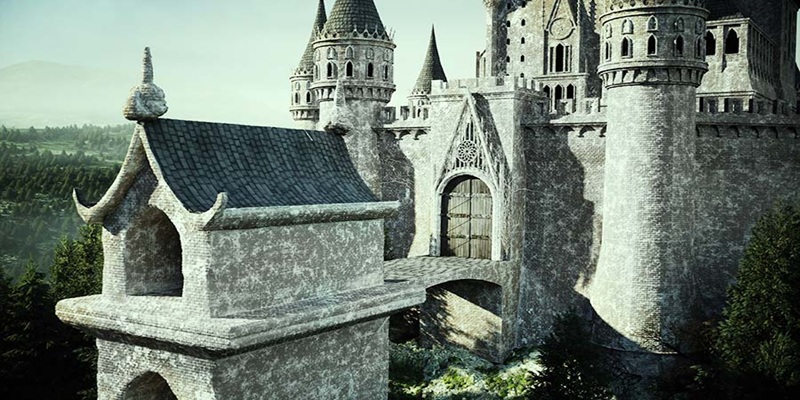
We’ve been getting a lot of questions in the comments and emails of Hughday snippets, and since not everyone reads the replies, here they are in one convenient place.
Hugh 2– when does it happen?
The action picks up right after Iron and Magic (three weeks later according to chapter 1).
As the notice in front of Iron and Magic says, the entire Hugh series happens before Magic Triumphs. That has not changed.
The chronological order is: Hugh series (all installments) – Magic Triumphs- Sanctuary- Wilmington Years (all installments)- Blood Heir series.
How long will Hugh’s series be?
Currently, House Andrews are thinking of it as a duology, but since the manuscript of volume 2 is being written as we speak, things may change.
Does Hugh 2 have a title?
Not yet. We’ve been calling it Hugh 2, Iron Covenant 2, Iron & Magic 2, Elara’s book, the d’Ambray Bake Off – at the moment, whatever you recognize works.
Will Steve West narrate the audiobook?
The manuscript for Hugh 2 has not yet been finished. That means there is no known exact date when it will be ready for publication, how many pages it will have etc. Which in turn means we cannot yet go to the very busy Steve West and ask whether he is free to take on the project, this is how long it would take, this is when it’s needed by, and all the other necessary details.
What I can guarantee is that House Andrews, the agency and everyone involved believe as much as we do that Steve West is perfect for the role of Hugh and no effort will be spared to book him if that is at all possible.
Will it be a blog serial?
I think House Andrews will be generous with snippets up to a point, but not a traditional serial that shares most of the book in regular installments, as updated this past Friday.
Yes, admin, very interesting, very interesting, I’m not snoring at all. What about spoiler spoiler spoiler spoiler?
No one knows about spoiler spoiler spoiler spoiler yet in Hugh 2.
Stop mentioning spoiler spoiler spoiler spoiler in the comments and spoiling spoiling spoiling spoiling fellow Horde colleagues who want to follow the natural course of the story.
Your comment will be hidden asap, but it might be too late. W*it for questions to be answered by the book and PUT DOWN THAT SPOILER, you Dushegubs!
That’s a good point, what about Blood Heir and put down that cow?
Blood Heir is currently the furthest in time KD World has ever gotten, and it’s roughly a decade after Hugh 2. Whatever bovine developments took place will require our p*tience.
The story was published somewhat out of schedule, because of the pandemic, and the similarities between what we were going through and what Julie was called to do. Like us, she couldn’t go home and see loved ones, or risk losing them. House Andrews wrote it and shared it with us in weekly chapters, as another loving hug in hard times, and I am very grateful it came when it did, even if it jumped the publication queue.
It will be followed by Blood Heir 2, which will be a sequel.
Let me clarify that: Blood Heir 2 will not be the story of Derek’s missing years and Julie’s time with Erra. That rumor started around the fire pits of my people, the proud pioneers of Team Facts be Damned. Love you guys, but no.
What House Andrews said was that it will explain what happened to Derek, but it will take place after Blood Heir 1. That’s why we need Wilmington 3 to come first, so we can fully understand some of the developments in Atlanta. ::cough Pack cough cough:: Oh dear, I really must have that seen to.
Yes, what about Wilmington Years?
The Wilmington Years series, in its entirety, happens between Magic Triumphs and the Blood Heir series.
There is a Wilmington 3 in plan, but not in progress. We have been given a tiny snippet from it here.
Currently, though, IA are working on Hugh 2. As much as we want all these books at once, and that once better be right now, and actually with Maud’s Innkeeper wedding on top, and you know Puffles … – we must attain fluffy awareness that they each take time and effort to be written.
What about Sanctuary 2?
Not on the schedule right now.
Where can I find any extras to tide me over?
All of them can be found on the Free Fiction page, organized by series.
For Kate’s World, they are :
A Questionable Client – prequel to the main Kate series
A bit more Roman – prequel scene to Sanctuary
Purpose, No Heroes – Wilmington Years extras
King of Fire– prequel to Blood Heir
Sandra – Kate’s POV during Blood Heir
Damian Angevin– the Order’s report of the events from the main series
And the fun fan service fiction of Kate and Curran texts, Luther and Roman’s Frinnterviews, Don’t Mess with Fate (Hugh and Roman).
I have a very important final Hugh question. Very very adminy, you have to answer. Don’t think too hard though, first thing that comes into your head, just tell us. Does Puffles fly home?
Nice try.
The post Hugh’s Question Corner first appeared on ILONA ANDREWS.
New Polish edition of The Wolf’s Hour from Vesper
Polish publisher Vesper has revealed the cover for Godzina Wilka, their upcoming translation of The Wolf’s Hour, to be published in April 2025! The art is by Maciej Kamuda, and the translation is by Janusz Skowron.
The book has not been added to the Vesper website yet, but details can be found here.
Lowering the Hammer has published!
Yep.

About:
Normal 0 false false false EN-US X-NONE X-NONE /* Style Definitions */ table.MsoNormalTable {mso-style-name:"Table Normal"; mso-tstyle-rowband-size:0; mso-tstyle-colband-size:0; mso-style-noshow:yes; mso-style-priority:99; mso-style-qformat:yes; mso-style-parent:""; mso-padding-alt:0in 5.4pt 0in 5.4pt; mso-para-margin-top:0in; mso-para-margin-right:0in; mso-para-margin-bottom:10.0pt; mso-para-margin-left:0in; line-height:115%; mso-pagination:widow-orphan; font-size:11.0pt; font-family:"Calibri","sans-serif"; mso-ascii-font-family:Calibri; mso-ascii-theme-font:minor-latin; mso-fareast-font-family:"Times New Roman"; mso-fareast-theme-font:minor-fareast; mso-hansi-font-family:Calibri; mso-hansi-theme-font:minor-latin;}
The Federation is finally ticking along as things start to come together. The Tauren war is over in the west, the Federation is growing steadily, and the economy is bright. There are dark clouds on the horizon however. The Spirits have returned with dire warnings of an ancient evil alliance brewing in the northern sectors.
Admiral Irons has his hands full with politics and the pirate war in Sigma Sector. They finally have a lead on the pirate capital, the battle moon known as Atlas XIV or El Dorado. Fleets and the Cadre are on the move to Sigma in preparation of the final assault there.
Pirate Empress Catherine the Great has been scheming and readying her titanic ship to flee to a new hiding spot. It is now a race to see if she can get away before the fleet finds her. But Admiral Irons is first and foremost an engineer. Engineers have a motto, when in doubt, use a bigger hammer. Well, Admiral Irons is the premier engineer and if he is good at anything it is that he is an expert on Lowering the Hammer.
Amazon: Amazon
B&N: B&N
Free Fiction Monday: Scrawny Pete
Crime reporter Atkins discovered Scrawny Pete at the scene of a murder-suicide. The hard-bitten reporter took to the cat, and the cat took to him.
Together they travel through the city on the police beat—until the day they come across another crime, one that Scrawny Pete understands.
“Scrawny Pete” is available for one week on this site. The ebook is also available on all retail stores, as well as here.
Scrawny Pete By Kristine Kathryn Rusch
He found Scrawny Pete, flea-bitten, hair coming out in patches, and eyes like a baby’s, in a fifth floor walk-up, crouched beside two dead bodies. The cat wouldn’t come to anyone but him, and in a moment of weakness, he took the damn thing. The vet’d cleaned him up, put antibiotics on the scabs, gave Atkins some salve and some special food and sent him on his way.
A cat owner.
And not just any cat. Scrawny Pete was on his way to becoming a legend.
The dead bodies had been part of a domestic. Typical, in its way. Murder-suicide. Always seemed that the man shot the woman and ate the gun. Fifteen years on the crime beat for whichever daily tabloid paid him enough to write his five hundred words of wisdom showed him that there was nothing in the human existence that someone didn’t try to solve with a gun. In the mouth, out of the mouth, in the heart, in the stomach, it didn’t matter. In America, someone whipped out a gun and entire lives ended. A flash, an instant, leaving more heartbreak than any newspaper could cover.
As if it wanted to. Whoever said, “All happy families are alike, but all unhappy families are unhappy in their own ways,” had been more right than Atkins wanted to imagine.
The problem with Scrawny Pete, as Atkins soon learned, was that the damn cat was terrified of being alone. Surprisingly, loud noises didn’t bother him, and neither did the smell of blood, but his own company in the quiet of Atkins’s apartment drove the cat absolutely crazy. Atkins tried leaving the television on, and bringing home a kitten, but Scrawny Pete was intelligent enough to know that a TV wasn’t company, and he didn’t tolerate any furry companions in his fancy abode.
Somehow the damn cat talked Atkins into taking him everywhere. Atkins started wearing a great coat with a large pocket that Scrawny Pete—who was smaller than most six-month-old kittens—took to riding in. Atkins found that Pete could be smuggled anywhere, restaurants, hotels, even doctor’s offices. And once he started writing about Pete in his column, well, he didn’t have to smuggle the cat anywhere any more.
It was June 21st, one year to the day after he’d gotten Scrawny Pete, that he found himself taking an old Otis to the top floor of a scrungy apartment building on the lower East Side. The cops were already on the scene. Some rookie was standing outside the main door, arms crossed, unwilling to let in any comers even with press badges until he saw Scrawny Pete. Atkins mumbled as the Otis’s doors slid open on the fourteenth floor that if he’d known a cat was worth more than a press badge he’d’ve gotten the cat years ago.
Scrawny Pete had no answer. If anything, the cat seemed tenser than usual.
Pete was always unnaturally tense. Atkins attributed it to the poor critter’s upbringing by such obviously happy folk. He could only imagine how awful it had been. The walk-up hadn’t had any cat food. The only sign that a cat had even lived there were the claw marks on the living room sofa. Obviously the happy couple had let Scrawny Pete fend for his dinner in the hall with the other stray cats, and had let him the bulk of his life outside—which had probably been good for Scrawny Pete or he might have been the first to taste the gun, long before hubby decided the family needed a vacation in Never-Never-Land.
But in this hallway, which smelled of grease and garlic and Asian cooking, overlaid with filth and a bit of despair, Pete’s naturally tense body became a hard little wire. Atkins put a hand on Pete’s back, like he used to do when they first started traveling together, before he realized that nothing—not honking horns, not screaming people, not the breeze from a passing train—could spook Pete enough to make him leave the pocket. Pete’s security was Atkins, and that cat wasn’t ever going to let go.
Apartment 14A had a crooked metal sign and an open presswood door, the outside of which had once seen the backside of someone’s foot. The breaks in the wood weren’t new and they weren’t clean, and all they left was a thin layer of really cheap oak covering between the inhabitants—or former inhabitants as the case might be—and the rest of the world.
Atkins pushed his way inside, felt Pete turn into a statue against his side and start making little huffing noises. Two detectives stood inside, both in plainclothes, cheap off-the-rack suits that had seen better days. The ME stood over the bodies with the department’s camera, preserving the scene for posterity, although it was obvious what had happened.
Husband shot the wife before eating the gun. The air still had an acrid whiff from the double discharge. Atkins was surprised he could smell it over the stench of blood and voided bowels.
The detectives recognized him, showed him where to stand so that he wouldn’t violate the scene. Pete was still huffing, his fur rising on his back. Strange behavior. Stranger way still to spend their one-year anniversary.
Atkins stared at the couple. Young, by the looks of their hands. Poor, by the looks of the apartment. But not that poor, by the looks of their stuff. In fact, a bit upscale for a neighborhood like this.
“Slumming, Atkins?” one of the detectives asked.
“Heard the call,” he said, hand still on Pete. “What is it about this day, hm? It’s not Christmas. Not nothing at all. What makes people go off on this day?”
“What?” the detective said. “There been other calls today?”
Atkins shook his head. “A year ago today, I got Pete at a place just like this one. In fact…” His voice trailed off. He shuddered, something he hadn’t done at a crime scene in more than a decade.
“What?” the detective asked, but Atkins ignored him. Instead he crouched, put his hands up to his face as if he were forming a camera, and looked through the frame.
“Do bodies always fall like that in a murder-suicide?” he asked.
“Like what?” the detective asked.
“Side by side, twinned up like they’re in bed next to each other, only they’re on the floor.”
“Naw.” The answer came from the ME. He’d taken the last shot. “Usually, they are in bed. It’s only a few who do it in the middle of the living room. I think they had some kind of argument, he grabs the gun, waves it in her face, she thinks he ain’t gonna do nothing, maybe even dares him, he shoots, realizes what he’s done, then shoots himself.”
Sounded plausible.
Pete was making little sounds of distress. Atkins put his hand back in his pocket. Pete was shivering. In the whole past year, in all the strange situations, he’d never once felt Pete shiver. Not even in the middle of winter.
“Never figured you for one of them animal lovers who took his friggin pet everywhere,” the other detective said.
Atkins shrugged, pretended an indifference he didn’t really feel. “It gets readers.”
“Sure does,” the first detective said. “The wife reads your column now like you’re writing the adventures of Scrawny Pete. You should mention him every day.”
“Yeah,” Atkins said. “He sure has a place in a story like this one.”
“I don’t see no story here,” the ME said. “Sad to tell, but who really cares when some guy takes out himself and his wife. ‘Cept the friends and family, of course.”
Atkins looked at him. The ME was a skinny redhead with premature aging lines from frowning instead of too much sunlight. “No kids?” he asked.
“Not a one.”
“How common is that?”
The ME shrugged. “I’m not a walking book of statistics.”
“I mean, isn’t it usually long-marrieds, or newly separateds, or bad divorces who resort to this?”
“Can’t say.” The ME looked over his shoulder. But one of the detectives frowned.
“Where you going with this, Atkins?”
“Nowhere,” he said. “Just seems strange to me. The couple that I got Pete from, they were in this position, no kids, dead in the living room in a fifth floor walk-up not a lotta different from this.”
“The world’s weird, Atkins,” one of the detectives said. “Who’d’ve figured? It’s like you and that crazy cat.”
“Yeah,” Atkins said softly, not taking his hand off Pete. “Who’d’ve figured.”
***
It didn’t stop him from checking anyway. Superstition was sometimes a reporter’s best friend. He and Pete spent the afternoon digging through records, and what he found chilled him. The past five years, there’d been a murder-suicide on the same date. Same day, same pose, different precincts. No one recognized the scene. And because it was looked like a murder/suicide, no one did more than a cursory investigation. Did he shoot her? Yeah. Did he shoot himself? Yeah. End of story.
But not really.
Atkins called the detective in charge of the latest one, told him what he’d learned, and didn’t explain how he got his hunch, except to say that he remembered the anniversary of getting Pete.
Pete was still freaked. Atkins had learned, in the year he’d had Pete, that cats had memories, emotional memories, like people. The apartment drove him crazy; whenever one of the neighbors got to shouting, Pete dove under the couch. He sat in the corner like a terrified rabbit when Atkins wasn’t home, not moving at all, defecating and urinating in the spot where Atkins left him in the morning. He’d done that for a week before Atkins, who knew that Pete understood a litter box, tried taking Pete to work.
The rest, of course, was history.
The detective didn’t call back for two days. By then, Atkins was three columns away from the scene. He remembered it, of course. That night, Pete had slept like a baby in his arms, something he wouldn’t admit to anyone, barely admitted to himself, and the cat seemed spookier than usual. But life marched on and Atkins with it, turning in his five hundred words, crime beat, the most popular column in the city with or without mention of Scrawny Pete.
“Atkins,” the detective said.
“Yeah?”
“You got a story here. Want it? We wouldn’ta got it without you.”
Reporters lived for calls like that. Atkins was no different, even after fifteen years. He went to the precinct, which was gray and dirty and smelled like ancient coffee, just like every other precinct in the city, and listened as the detective explained, in excruciating detail, how they went over the crime scene, how they found things that didn’t exactly fit: a shoe mark in blood that didn’t belong to any of the cops; a handprint on the coffee table; fibers in the wounds that had nothing to do with either deceased.
The detective didn’t apologize. He knew that Atkins was a pro, Atkins understood how overworked they all were, how they liked to close cases, especially easy ones, like a murder/suicide, how hard sometimes serial killings were to see.
Luckily, or so the detective said, this one was easily solved. A neighbor—one Tobias Craig—heard the fighting, complained, complained again, finally decided to take matters into his own hands. Apparently he snapped every June 21st. Left a visible trail once they knew what to look for. Every apartment super with the June 21 murders remembered the guy complaining about the noise.
The cops had interviewed him at every scene and he’d always been the one who said the expected litany: It don’t surprise me, officers. They were fighting all the time.
Atkins knew better than to ask for a why, but he got it anyway: Apparently Craig’s name was all over the system, not as a criminal, but as a victim. Parents dead of a murder/suicide—a confirmed one—that happened in front of the children on June 21st, 1979. He’d been six at the time.
Atkins found the clippings, saw the blood-spattered children being led out of the apartment. In his imagination watched them watching their father pull out the gun like the ME had said, pull the trigger, kill his wife, then in sudden remorse, kill himself. He’d forgotten the children, sleeping in the next room, the children who’d crawled out of their shared bed to see what the noise was just in time to watch him eat his gun.
Scrawny Pete’d seen it of course. That explained the terrors, the fears of being left alone with neighbors who shouted and screamed. Was he their cat, the dead couple’s? Or had he originally been a stray who’d taken food from Craig? No telling, and certainly Pete wouldn’t say. Not in any way Atkins wanted to see anyway.
So he wrote the column, asked if it could go on more than 500 measly words, and because he rarely asked, and because his longer columns usually got national attention, sometimes awards, his editor said sure. Atkins wrote the story, mentioning Pete’s reaction to the smells, the repeated scene. Mentioning, only mentioning. And then he’d gone on to reflect on the way the system failed the victims and the way it created more victims and was it guns or the human race’s innate violence that caused a man to shoot his wife and then himself, to start a ball rolling that would leave five couples dead after some kind of terror at the hands of a crazy man who’d once been a blood-spattered six-year-old kid.
People didn’t remember the analysis or the arguments or the excellent prose, some of the best of his career. Nope. They remembered the bizarre nature of the story, and they remembered Pete. And over the years, it became the crime that Pete solved, and Scrawny Pete became a legend.
Atkins didn’t mind. Cats could become legends. Reporters shouldn’t. Reporters schlepped from scene to scene, observing, recording, trying to make sense out of one corner of the world. Sometimes he managed it, sometimes he didn’t. But he was the best at it, for a few years at least.
The years he had Scrawny Pete in his pocket.
____________________________________________
“Scrawny Pete” is available for one week on this site. The ebook is also available on all retail stores, as well as here.
Scrawny Pete
Copyright © 2016 by Kristine Kathryn Rusch
First published as an Amazon Short, June 2005
Published by WMG Publishing
Cover and layout copyright © 2016 by WMG Publishing
Cover design by WMG Publishing
Cover art copyright © Jeffery Koh/Dreamstime
This book is licensed for your personal enjoyment only. All rights reserved. This is a work of fiction. All characters and events portrayed in this book are fictional, and any resemblance to real people or incidents is purely coincidental. This book, or parts thereof, may not be reproduced in any form without permission.
OUT NOW – Stolen Glory (Morningstar II)
After a cataclysmic interstellar war that came very close to exterminating humanity, the Daybreak Republic has risen from the ashes and embarked upon a mission to unite hundreds of human colony worlds under its banner, in hopes of preventing a second and final conflict that will complete the destruction of the human race. But not everyone agrees that the empire’s ends justify the means.
Though a technicality, Lieutenant-Commander Leo Morningstar commanded the lone starship in the Yangtze Sector, but no more. The arrival of reinforcements brings a senior office who has no patience for jumped-up officers, and an axe to grind against Leo personally. Relieved of command, Leo finds himself serving under an old enemy and then assigned to an isolated war-torn world while his rival steals the glory Leo rightfully earned. They think they’ve gotten rid of him for good …
But that didn’t work out very well last time, did it?
Read a FREE SAMPLE, then download from the links here: Amazon US, UK, CAN, AUS, Books2Read.

Kate Exclusive Samples and Innkeeper Giveaways
It is Monday the 89th of January (or certainly feels like it) and if, like me, you need reasons to push through to the end of the month, I have them right here.

The dramatized adaptation of Magic Shifts will be released by Graphic Audio this Friday, on their website as well as on other third party retailers platforms (Audible, Chirp, Audiobooks.com etc).
Because the Horde is what? Beloved! I have 2 generous exclusive samples director Nora sent over just for us:
Why *does* Kate always hang out with weirdos? aka Luther in the hooooouse!
And car chases are a girl’s best friend. (Only if that girl is Dali)
For more, including the classic Apple + Bee moment and the heart-wrenching earring carrying scene, we’ll have to make it until Friday. Courage!
Nora and team are hard at work already on Magic Binds, unapologetically my favourite, so I preordered and can’t w*it for March. That means the main Kate series will be entirely adapted this year and we will potentially hear more about the dramatized fate of other books in Kate world.
I will also have more exciting announcements from Graphic Audio for you next week, if all goes well, but until then, the fun isn’t over!
GiveawayThe second volume of the Clean Sweep graphic novel is being released tomorrow by Andrews McMeel – this is the Tapas run comic book, turned into paperback and Kindle formats.

To celebrate, the publisher is running another Innkeeper sticker sheet giveaway for US-based readers, from now until February 2nd which can be accessed here – also includes an extensive list of retailers. Good luck all!
Disclaimers: This is not Sweep in Peace, a sequel to the Tapas episodes. It’s the second volume of Clean Sweep. The comic book has expanded the story and added new characters. Tomorrow’s date is the US release, please check your retailer of choice for international dates (Amazon, Bookshop.org, World of Books etc) – in the UK for example, we have to w*it until March.
We have a lot of surprises coming, and we heard you about more quizzes, games and snippets each Friday. In the meantime, happy listening, reading and sticking!
The post Kate Exclusive Samples and Innkeeper Giveaways first appeared on ILONA ANDREWS.
Monday Meows
I meant to do that.
Of course you did.
Yeah, every cat dreams of getting covered with water.
They do? Huh. Guess I need to revise me thinkages.
Lowering the Hammer Snippet 4
Normal 0 false false false EN-US X-NONE X-NONE MicrosoftInternetExplorer4 /* Style Definitions */ table.MsoNormalTable {mso-style-name:"Table Normal"; mso-tstyle-rowband-size:0; mso-tstyle-colband-size:0; mso-style-noshow:yes; mso-style-priority:99; mso-style-qformat:yes; mso-style-parent:""; mso-padding-alt:0in 5.4pt 0in 5.4pt; mso-para-margin:0in; mso-para-margin-bottom:.0001pt; mso-pagination:widow-orphan; font-size:10.0pt; font-family:"Times New Roman","serif";}
Chapter 4
Antigua
Admiral Irons replacement search for a new secretary of industry was off to a rocky start. Sandra’kall had recently resigned to join her family at the Nuevo B colony and be a member of the ruling cabinet there. He still thought she would have done better for her people in her previous position; however, she wanted to be closer to her people and her family so he couldn’t fault that decision. It was just unusual for a usually logical Centaurian to choose emotion over cold hard logic.
Of course, there might be something else involved he was not aware of. Not that it was any of his business apparently. He glanced at the candidates. Sprite had two dozen files from the literal thousands that had been initially generated. Even more had applied for the position once it had come out that the Centaurian was resigning.
He’d thought they’d be able to fill her post before her departure, but apparently, that hadn’t been the case. The first three candidates had not passed the vetting process and the fourth runner-up had some issues that had come out during the committee hearing with congress. It had been embarrassing enough for the candidate to withdraw.
Of course certain parties on the hill had gloated over that. He wasn’t certain why; it meant the post was vacant and the star nation as a whole had a problem. Not that they saw it that way of course. They saw it as scoring off of him and his administration. Reining him in.
Petty politics in other words.
<<V>>
Antigua
Jethro continued to deal with the pain of loss of Lil Red. Shanti continued to blame herself. Both had been to a therapist but it helped to talk to each other. “I was supposed to keep her safe,” she said.
Jethro shook his head. She sounded so … broken. Like it was her fault. It wasn’t; they both knew that. She hadn’t been home; it had been a freak crash during an air show that had killed their adopted daughter.
“You can’t be blamed for a freak accident! Murphy maybe, but not you love. It happened. We can’t wrap them in cotton and keep them safe forever.”
“You’d think she’d be safe at home! I should have insisted she stay with you.”
“It happened,” Jethro sighed. “It is something that … the rest of us will have to live with. I love you,” he said softly.
“I love you too,” she murmured back, kissing her fingertips and then holding them out to him. He smiled tenderly to her holographic image.
A blinking LED caught his attention. He knew it was time up. He reached out for a phantom caress of her cheek. She smiled tenderly and closed her eyes and seemed to rub into it.
“I won’t tell you to stay safe. I know you too well,” he said.
She chuffed.
“But watch your six and kick ass.”
“Yeah,” she said huskily. “We have to go.” She dashed a tear and then straightened up and nodded. “Kick some pirate ass. I love you.”
“I know and I will. And I love you too,” he said. “Thanks, Captain,” Jethro said as he looked up.
“You’re welcome, Chief. Terminating virtual chat,” Commander Enki replied.
<<V>>
Jethro prepped for work quietly. “Was that mom?” Baghera asked sleepily. He was the black panther male of the quartet. All four had a ways to go in the maturity department. A bit of that was because he hadn’t been around to be a father. He was trying to make up for lost time but it wasn’t easy this late in the game.
“Yeah, she had to go; sorry, you lot were asleep.”
“Was she here?” Bagheera asked, looking around in confusion. He sniffed the air, his brows knit still in confusion. “Wait, I don’t smell her.”
“No, it was a holo call. Brief,” Jethro explained patiently as he cleaned up the kitchen.
Bagheera blinked in confusion. “Oh,” he said.
“Red is …”
“They cremated her body and will ship it back as a diamond,” Jethro said quietly.
Bagheera blinked again and then yawned. “Damn,” he muttered. “It is … is she really gone?” he asked and then ran a finger under his nose as he snuffled.
“I’m afraid so,” Jethro sighed softly. Some of the family were still struggling with the loss. Red had been their adopted daughter and an older sister/aunt/sitter to each of the litters. They were each dealing with the grief in their own way. The FBI as well as the Cadre had each offered a grief counselor to the family. So far he wasn’t aware of anyone taking them up on it.
The first litter were buried in their work. They were more mature and knew intellectually such things were bound to happen eventually. The sudden reaction was what caught them off guard.
“Mom should have left her here to be safe with us,” Bagheera muttered bitterly.
“Red was an adult; she wanted to be with your mom to help her out and so she wouldn’t feel so alone.” Jethro shook his head.
“Yeah? And it cost her her life!” Bagheera flared.
A corner of his father’s mind recognized anger as one of the stages of grief so he kept to reason. He didn’t want to provoke the fragile truce with his son or make the irrational anger turn towards him.
No, it wasn’t irrational, the anger was real. It was just adrift without a target as they all were, he reminded himself before he spoke.
“No, a freak accident did. She was at home safe. It could have happened here as easily as their or anywhere,” Jethro said, trying to keep his tone even. Bagheera glowered at him. “When fate chooses to snip your thread, it's a part of the circle of life.”
“Oh gah, not that shit again,” the smaller black panther said voice rich with disgust. He snorted harshly.
“It is what it is,” Jethro said with an ear flick of a shrug as he felt his fur stiffen. Bast shook her head on his HUD. He took it to indicate a lost cause. “Some things are just out of our control. It sucks. Trust me, I’ve felt it. I still feel it.”
He reached out to touch his son but his son turned away and headed into the bathroom. The door clicked shut with a sound of finality to the argument.
Jethro escaped to his commute to work while he could.
<<V>>
Jethro saw motion in the hallway near the floor as he walked through the new section of the base. His attention flickered from thinking about the list of things he had to do to prepare for the movement to curiosity. Bast rolled her eyes on his HUD and highlighted a familiar feline figure crouching in the shadows.
He chuffed softly in amusement and pretended to ignore her in passing. Ember had figured out how to cloak in order to try to sneak out of the crèche again. She was good, but she had been tagged with an IFF tag and her cloak was only good if she didn’t move. She didn’t have implants or an AI to manage her cloaks so everything ran on instinct.
He turned suddenly and swooped in to catch her and swing her off her feet. She growled in surprise as he held her with one arm under her armpits and the other under her bottom as he leaned over her and gave his invisible prey a cheek rub.
She mock growled and her ears went flat but he chuffed and purred. After a moment, she started to purr in response.
A tech saw him cheek rubbing something and holding it but whatever it was it was invisible. The human stopped and stared until Jethro tickled his prey. Ember growled and lost focus and faded into place in his arms giggling and squirming. “Stop!” she said in a high pitch giggly voice.
Jethro churred and laughed at her and hugged her tightly. The observer then blinked and puckered his lips and looked away. After a moment, he shook his head and walked off.
“So, what are you doing out and about, young lady?” Jethro teased. “Aren’t you supposed to be with your friends?”
“No nap,” she growled as he slung her up to his shoulder. She began to play with his ear in retaliation.
“Really? You don’t like to nap?”
“No,” she pouted as he walked to the crèche.
“Uh huh,” he said. “Do they know you are gone?” he asked in a light voice. She suddenly looked shy.
Bast rolled her virtual eyes and sent a text out to the crèche as well as Zuhura.
Just as she did a security alert came over the 1MC to look for a lost black kitten.
“I think they know you are missing. Your mommy is going to be upset,” Jethro warned.
Ember looked a little contrite but then flicked her ears.
Find out supposed to be in crèche. Snuck away in naptime.
Zuhura arrived outside the crèche. She was clearly exasperated with her wayward charge.
Jethro play fought to hand her over, eventually relenting with a mock pout. Ember giggled. The byplay lightened the mood.
“You aren’t supposed to leave the crèche without an adult, young lady,” Zuhura scolded.
“She’s getting good at being sneaky,” Jethro said. “She almost got past me,” he said. He shrewdly tickled her. “Almost,” he teased as she shrunk back and giggled and then growled and play swatted at him.
She might be playing but her eyes flashed, her ears went back and she started in with her trademark head cock that said she was ready to get feisty.
“Uh oh,” Zuhura laughed. “Now you’ve done it,” she chuffed. She pretended to hold her charge away from Jethro as Jethro pretended to box with her and then hold his arms out on either side and then move in to strike. She couldn’t look in both directions and growled ears flat.
Zuhura chuffed as her father used one hand to distract and the other to strike. The head cock came out again.
“I think they need to learn to wear this little lady out a bit more before naptime,” Jethro observed.
“No nap!” a certain kitten said, crossing her arms and instantly pouting.
“Yeah,” Zuhura said with a snort as she took the kitten into the crèche. “Thanks, dad.”
“Anytime,” he said with a wave to the kitten.
<<V>>
Comment on A Beginner’s Guide to Drucraft #29: Motion Sigls (I) by Bill
Thanks again for the weekly fix of Drucraft! I assume that next week we will have some more on Motion Sigls? Waiting to see how how Calhoun can move so fast!
I hope that sales are still good for the new series? (PS: When is paperback of Book#2 due for release please?) Also I trust that edits are now ‘done’ and that you have started on Book #4 !
Wait, Is It Hughday Again?
Is it a serial? No. It’s going slow, and we are having to backtrack, so it is probably not suitable for serialization. However, people are really stressed. We are seeing an uptick in “My emotions are frayed right now, and the snippets are helping” messages.
The political ban is still in effect, so Mod R will be removing comments that mention politics. We are committed to keeping this blog a place where everyone can come to decompress, especially because spaces like these are in short supply right now. However, I wanted to address some of these emails. We see you, we understand that life is hard and you are struggling and stressed, and we are so sorry.
When the pandemic started, the economists warned that recovery would take 15 years. You can’t just hit pause on the world for months and not pay the price later. We did it to survive, but now we have to collectively try to claw our way back out of the pit it created. This is a very difficult process. It’s slow and painful, it affects every aspect of our life, and it makes everything so much harder.
I’m with you. I’m creatively discouraged and stressed. We’re going to take a financial hit later in the year due to unforeseen circumstances, and I’m not wild about that. One of my children is choosing to return to college to get her degree, because the opportunities she had previously evaporated. Gordon will likely need surgery. It’s easier to say what isn’t wrong with his shoulder – it’s not broken. I was on the phone for 2 hours trying to get a referral put through and I know my nerves are frayed, because I had to take a few minutes after that.
However, we are all going to keep going, because rolling over and giving up is not an option. So, for the foreseeable future, we are going to have something fun here on Friday. Something that will give you a break from the constant stress and daily grind. For now, it’s Hughday. Some Fridays, it might be something else.
If you have any fun ideas for quizzes, giveaways, or articles, please leave us a comment.
 Chapter 1 Part 2
Chapter 1 Part 2
The depression gouged the forest floor, about forty feet long, twenty-five feet wide, and two feet deep. It was less of a pit and more of a hollow, vaguely rectangular, but without the defined corners or sheer walls that would point at a human with a shovel being involved. The edges of the hollow sloped slightly, as if some giant pressed their palm into the forest floor, and the ground at its bottom was bare and soft like a plowed field.
Hugh crouched on the edge and frowned. Around the shallow pit, a dozen Iron Dogs waited, holding their torches over it. The flickering lights played on bare bones arranged in the dirt. A lot of bones. He recognized femurs from at least two horses, wings from what might have been a griffon, and paws from a bear. A freakishly large bear, too.
The bones had been carefully arranged into a pattern. Here and there, the different femurs, radiuses, ribs, and vertebrae were bound together by copper wire and twine with little bone beads. This wasn’t a mass grave. This was something else. Something malignant, with a specific purpose.
He passed his hand over it, just in case. Nothing. With tech up, the bones were inert.
Hugh looked up, past the hollow, at the massive tree rising behind it, soaked in night shadows. An Iron Dog had thrust a torch into the ground by its roots and the glow of the fire illuminated a fragment of twine hanging from the bark, its end frayed. Someone had wrapped the same twine that secured the bones around the giant trunk and then sliced through it and ripped it off.
Must’ve been in a hurry.
He rose and glanced at Sharif, waiting on his left. The dark-haired scout master met his gaze. Yellow fire rolled over his irises.
“How old is the site?”
“Three days.”
The end of the most recent magic wave.
“Any scents?”
Sharif grimaced. “Wolfsbane.”
Damn. The sense of smell was the most acute and accurate of a werewolf’s senses. They memorized thousands of human scents. Normally Sharif would’ve identified the gender, possibly the age, sometimes even a chronic illness, and if he’d met them before, a name. Wolfsbane nullified all of that. It rendered shapeshifters nose-blind, and it stuck around for days after the other scent trails faded.
“Nothing useful at all?” Hugh asked.
“Their wolfsbane is very potent, so there is that.”
And the best producer of potent wolfsbane was a mile to the south, watching baking shows in her turret.
“Could it be someone from Baile?”
Sharif shrugged. “It could be. We followed the wolfsbane to a clearing a hundred yards to the north. It ended there.”
“What do you mean, it ended?”
“The trail stopped.”
“So the magic user disappeared in the middle of our woods?”
“I cannot say. The trail ended.”
Teleportation was possible, but it was inherently rare and extremely risky, and the magic was down. Yet another thing that didn’t make sense.
“So we have a magic user,” Hugh said. “The wave caught them mid-whatever this is. Something alarmed them, and they took off, leaving all their toys behind, and then disappeared a hundred yards north.”
“It was Tatter,” Sharif said. “That’s how Karen found this in the first place. She was following the pack, trying to map their hunting patterns.”
Tatter and Gold were the dominant breeding pair of a local dire wolf pack, and they were a massive pain in the ass. Tatter, a huge male with a torn right ear, clocked in at two hundred pounds. His mate was only slightly smaller, and she made up for it with viciousness and cunning. They led about sixteen wolves, making circles around the castle and the adjacent village by the lake. They were smart and patient, sending out strike teams to bring prey back, while the aging generation watched the pups. The livestock herders were having the devil of a time keeping them away. If it hadn’t been for the guard dogs, Baile’s herd would be half of what it was in early fall. He had had to heal two of the hounds just last week.
With magic down, whoever put this bone mandala together would have no chance against Tatter and his hunting pack. That explained why the magic user split. It didn’t explain what they were doing here or why.
“Tatter left a mark on a tree about ten yards out,” Sharif reported.
Didn’t touch the bones though.
“Is this some kind of witch ritual?” Stoyan murmured.
Baile was home to seven different covens. It was a good guess, but this bone arrangement gave off a different vibe.
Hugh nodded to the huge tree. “That’s an oak.”
Stoyan squinted at it. “Druids?”
“Probably.”
Pre-Shift Druidism was a folkloric speculation. A prevalent religion among ancient Celts and Gauls, Druidism relied on oral tradition, lost to time. What little was known about it came mostly from Roman records, written by biased invaders determined to conquer new territory. Historic druids revered trees, especially the oak, treated and induced diseases, composed poetry, and foretold the future by means of augury and sacrifice. That sacrifice wasn’t always chickens and rabbits. Sometimes they needed a little more juice.
Post-Shift, when magic became real, druidism, like other neo-pagan religions, returned with a vengeance. The modern practitioners patchworked it together from Julius Caesar’s journals, Taliesin’s poems, new age mysticism, and wishful thinking. Over the decades, the neo-druids codified their rites and holidays and set forth some fundamental philosophical tenets, but beyond that, the consensus on how to be a druid was rather shaky. Some of them waded neck-deep into the kind of evil shit that would get them exterminated if the public at large knew about it. He’d come across that kind of druidism before, and the experience was never pleasant. The dusk druids packed a lot of power.
There were druids in Baile Castle, and their leader, Dugas, was one of Elara’s closest allies. She treated him like a surrogate father. On a scale from 1 to 10, when it came to dangerous opponents, Dugas was around 12. During the battle of Aberdine, the druid had stuck to support spells and then used his staff as a club–except for one time, when he was cornered by three armored soldiers and didn’t think anyone was looking. Hugh saw him tap his staff on the ground and then the three men in front of him vomited tree roots and died.
Dugas took care to appear less dangerous than he was. Hugh had no idea whether the man was a dusk druid, but if that was true, he wouldn’t be surprised. He had never seen him sacrifice anything; however, Stoyan and Lamar, his other centurion, had. Or almost had. Elara chased them off before the actual act, but the night she came to get him, they saw a line of cows painted in glyphs and Dugas with a knife.
He glanced at Stoyan. The centurion leaned closer.
“When you saw Dugas with the cows, what was he wearing?”
“A white robe.”
“You sure?”
“Yes.”
Druids wore special robes for sacrificial rites. They were blood red. It could’ve meant something or nothing.
He didn’t know how territorial Dugas was, either. The overwhelming majority of druids felt that the way other druids used their magic was none of their business. If they knew that one of them was doing terrible shit, they wouldn’t prevent it, as long as it didn’t directly affect them.
This ritual site was about a mile from the castle. Too close for any kind of comfort. Either this was done by an outsider, who didn’t fear Dugas or was confident he wouldn’t care; or it was done by Dugas himself or with his blessing. Either way, whoever had done it didn’t want to be identified, otherwise there was no point in using wolfsbane.
If this was Dugas’s handiwork, he was trying to hide it.
It could be part of the darker side of Elara’s magic. Dugas could be doing something with her blessing and instruction to keep it from them.
Hugh still had no idea what she was. Her people called themselves the Departed – again, he didn’t know why – and most of the time they were friendly and straight-forward, going about their lives. But then he had seen a time when they acted together as one, their magic united into a frightening whole, and that power had an ancient bite. The older the magic, the more power.
Hugh studied the bones again. If there was a choice between him and Dugas, he had no doubt Elara would choose the druid.
He could investigate it quietly, using just his Iron Dogs, or he could take it to Elara. If he took it to Elara, and this was something of hers that she wanted to protect, he would be putting his people at risk. But if it wasn’t and later she asked him why he found weird shit in the woods and didn’t tell her, he would have to admit it was because he didn’t trust her.
That would be the end, he realized. They would not come back from that.
She came to get him. She faced Roland for him.
Fuck it.
“Take the Polaroids,” Hugh ordered. “Sketch it, photograph it, and guard it. Nobody touches it while I’m gone.”
The Iron Dogs snapped to attention. “Yes, Preceptor.”
The post Wait, Is It Hughday Again? first appeared on ILONA ANDREWS.
Lowering the Hammer Snippet 3
Normal 0 false false false EN-US X-NONE X-NONE MicrosoftInternetExplorer4 /* Style Definitions */ table.MsoNormalTable {mso-style-name:"Table Normal"; mso-tstyle-rowband-size:0; mso-tstyle-colband-size:0; mso-style-noshow:yes; mso-style-priority:99; mso-style-qformat:yes; mso-style-parent:""; mso-padding-alt:0in 5.4pt 0in 5.4pt; mso-para-margin:0in; mso-para-margin-bottom:.0001pt; mso-pagination:widow-orphan; font-size:10.0pt; font-family:"Times New Roman","serif";}
Chapter 3
Tortuga, Omicron sector
The being known as the Wraith Queen reached out through her communication centers in the vast ship and tested them. She worked out new protocols to control the ships around her. But she knew she was lacking in abilities. She resented having to rely on the alliance. It ran against her core programming in some ways. Not all ways thankfully, as her organic partner had pointed out; their creators had left room for them to use and exploit other beings in accordance with completing their mission.
She was still looking forward to the day that she could renounce the partnership in fire and end the Necrons once and for all.
Until then she had to rely on them to fill the gaps in her abilities.
At least, for the time being.
<<V>>
Edessa
One of the cruisers dispatched south to hold the border to Pi sector returned to the nearest ansible location with news that two ships had been stopped but one other had been spotted but was now missing. The leadership of the Necrons was concerned. They passed the news on to their partners in Tortuga as they went over the data.
<<V>>
Tortuga
Hazel Irons was not surprised that her Queen reacted badly to the news when it came in through the ansible. The AI was not happy at all with the events and seethed about it. Hazel did her best to try to soothe her.
She was one of the oldest clone changelings in existence. Her line had been so reliable; it had been used until it had become too recognizable by the enemy. In fact, to date they had not found any other changelings.
By luck or circumstance, the changeling and her AI partner had been dumped into a stasis pod and left adrift in Pi sector. They had been found and salvaged by pirates who had been fleeing the growing Federation presence in the area. The duo had accidentally been awoken, and they had decided to first take over the ship and then move on from there.
It was an interesting partnership. Hazel had no illusions as to who was the dominant of them. She was a kingmaker, the power behind the throne, the voice of sweet reason and the spark of creativity that her partner lacked.
She also knew she was ultimately disposable. She believed she was still of use for her partner and the cause though, so she did her best to remain useful.
Her partner had grown to the point where she had been forced out and into a new body in the form of the massive flagship under construction. However delays had kept the ship in dock and hampered by problems that plagued their ability to fully function as planned for some time. It did not help the AI’s mood at all.
“If the ship did escape, and we don’t know if it did, it would have to survive the jump back to Pi sector, which is over a year. It has an unknown amount of supplies available and fuel,” Hazel mused.
“I see what you are doing. You are trying to convince me that the risk of exposure is small. Small enough to be ignored,” the Wraith seethed.
“No, I am working the problem by defining the variables in it,” her clone partner explained gently. It hurt to argue with her partner. They were made to work together after all. They were an incredible team, just look at what they had achieved so far! Other changelings would have doggedly stuck to their mission or given up! They had instead taken over a ship and then others and then forged an unlikely alliance with Necrons to take over the sector!
They still had some work to do but their progress was breathtaking. And it was happening faster than either of them expected. Well, faster than she had expected.
“I cannot in good conscience state that the risk is negligible given that the missing ship is a Federation ship,” Hazel said slowly.
“And?”
“I believe that means we have to generate some plans and modify existing ones,” the clone stated slowly.
“Such as?” the Wraith prompted. Her clone and former host was the spark of ingenuity in their partnership. She was cunning and clever to a degree, but the human was the true mastermind of some of their achievements.
“Two paths are obvious to me,” the clone said as she came up with the plan. “First, we send a task force to defend the jump line in Pi with an ansible link to keep us alerted to any further events there.”
“A bit late,” the Wraith said scathingly.
“Only in attempting to stop the single ship. There may be others,” her human partner warned.
“Agreed,” the AI hissed.
“And there may be new traffic coming from Pi. In fact, that is inevitable given how the Federation is expanding. Eventually they will send ships, if only to find out what happened to the first explorers they sent.”
“Agreed,” the AI stated. “What else?”
“I suggest we send a small task force, possibly just a couple of cruisers to Pi to run the fleeing ship down. If they can get ahead of the ship, they can lay in wait and ambush the ship and thus prevent it from reporting back. At the least, they could report on events in Pi sector and possibly even interdict shipping in that sector before it even comes to us.”
The Wraith queen took some time to respond. Hazel glanced around and then checked the status board of the star system in a bid to keep busy.
“You would want to send an ansible there too I suppose?” the AI finally asked after running a number of simulations. “The risk of exposure is high.”
“It is if they enter a star system. If they remain outside it as observers, it is less of a risk. If they engage, yes, the risks grow.”
“Especially if the ship escapes them further.”
“Correct. But if we do nothing, that risk is there anyway. Attempting to stop them may correct the problem.”
“Or make it worse,” the Wraith replied. “But I see your point.” The AI paused. “I will give the order.”
“Good.”
<<V>>

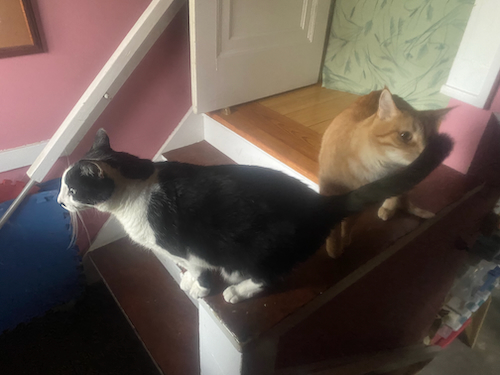
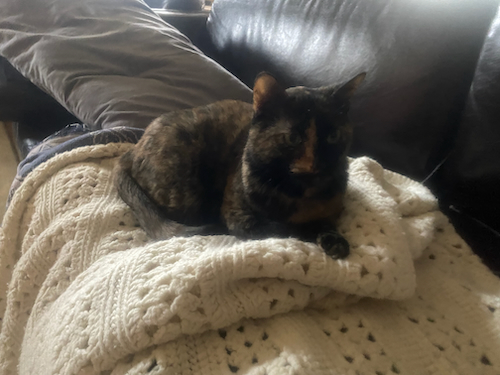
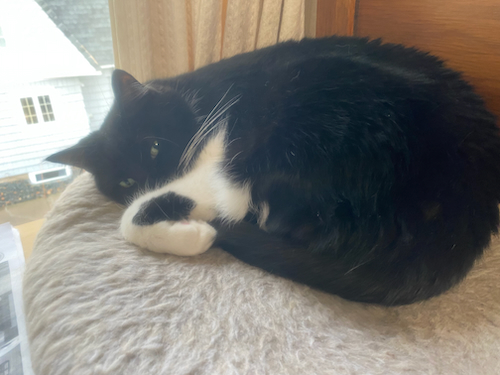
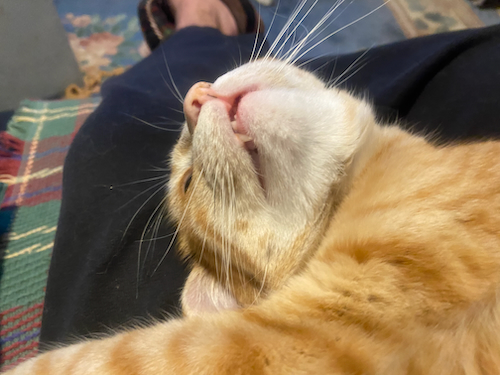
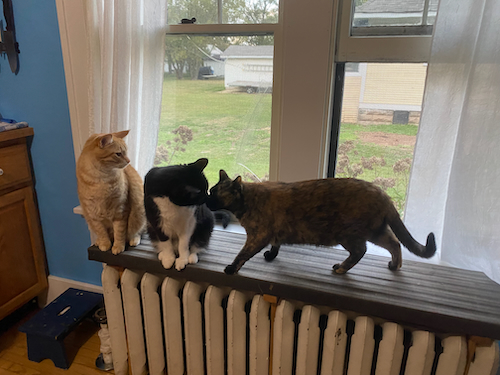

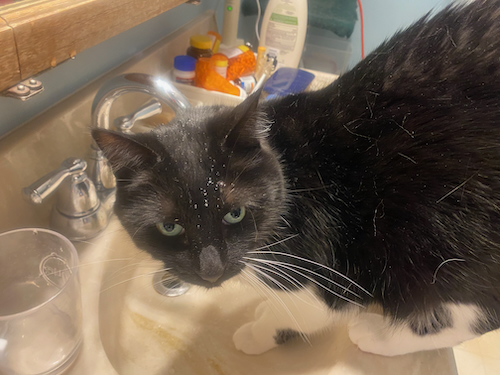
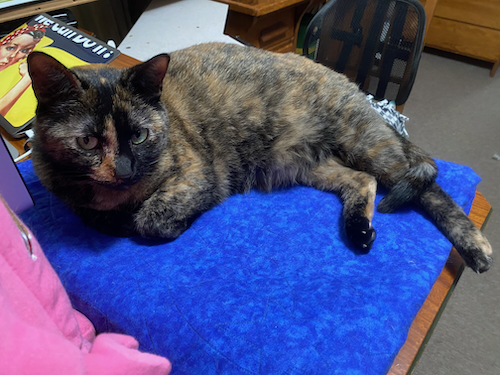
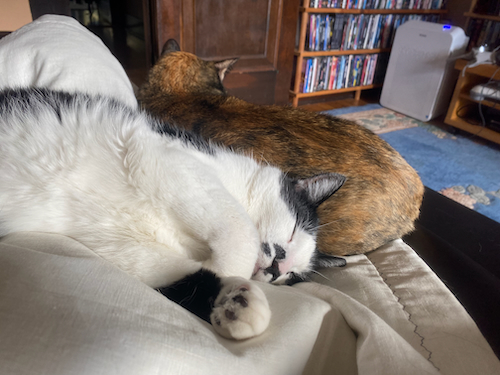
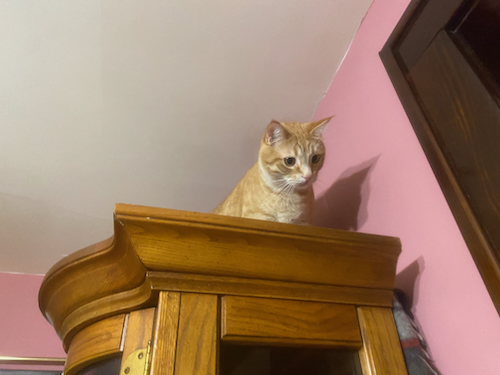
Recent comments